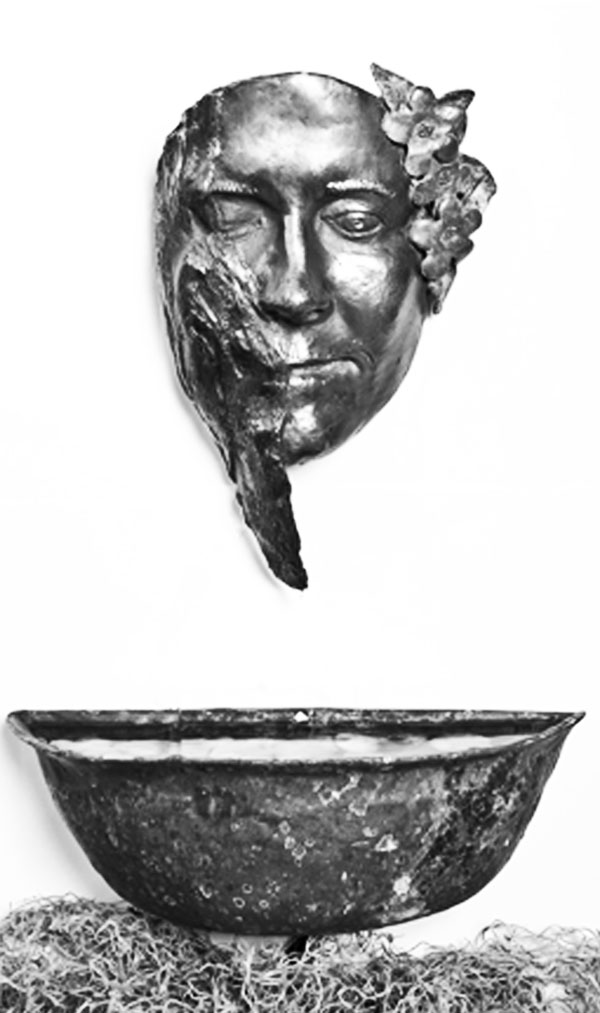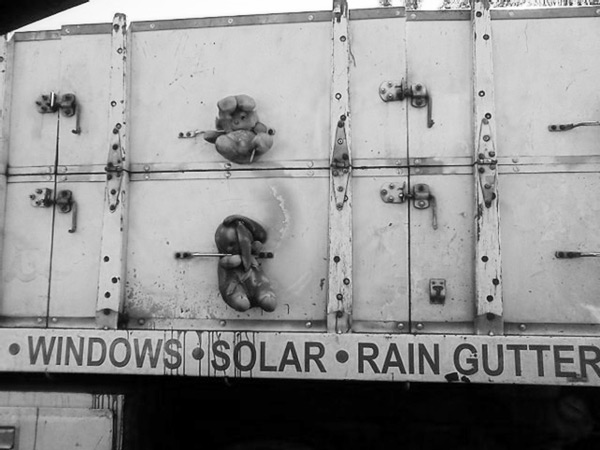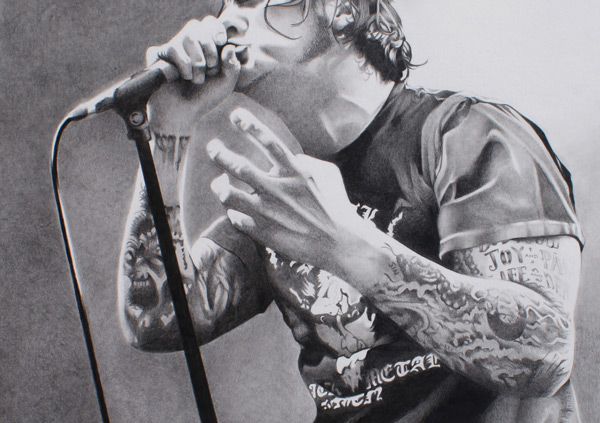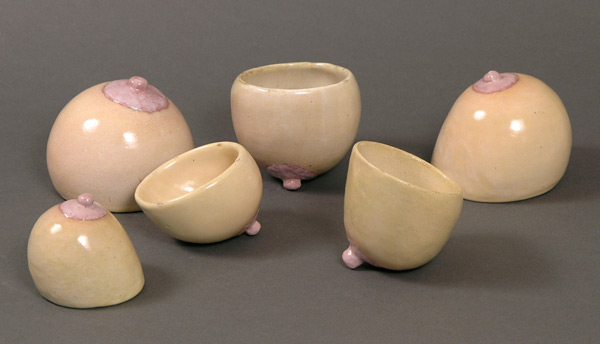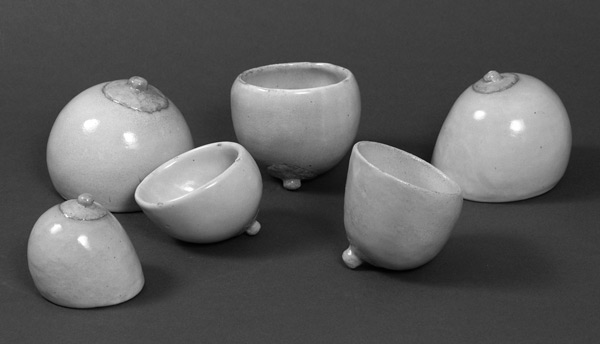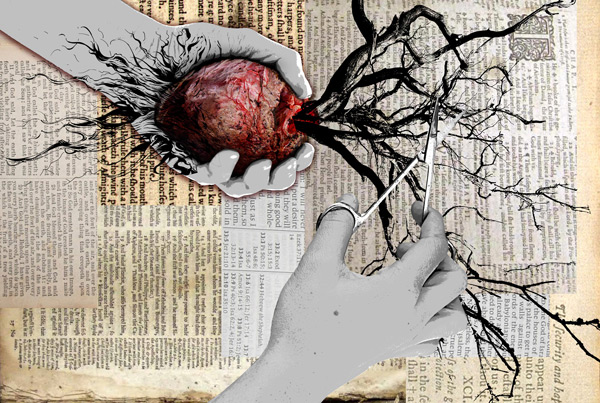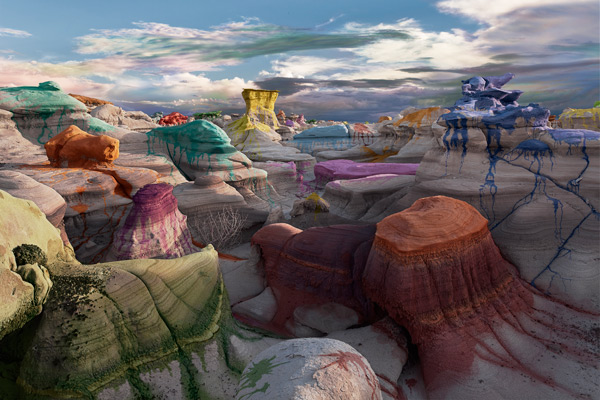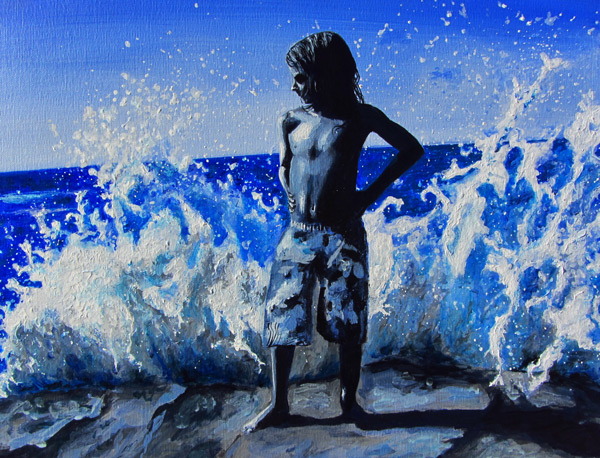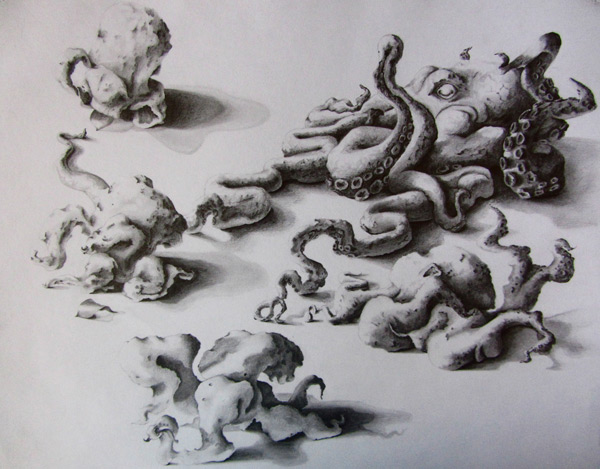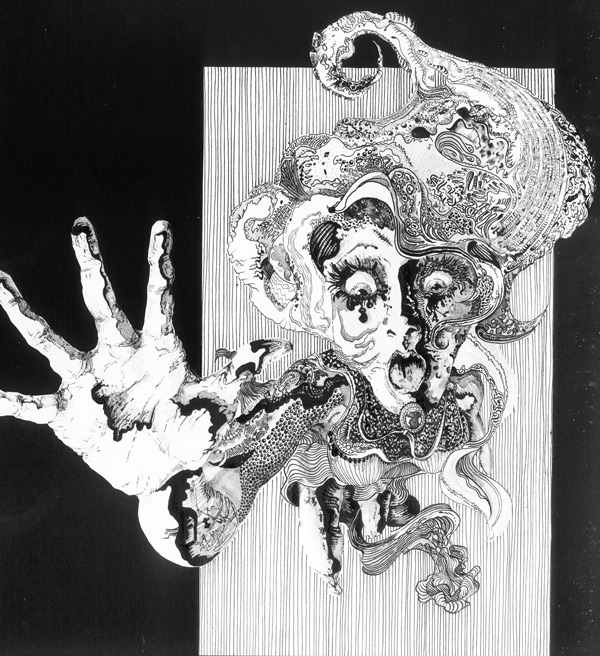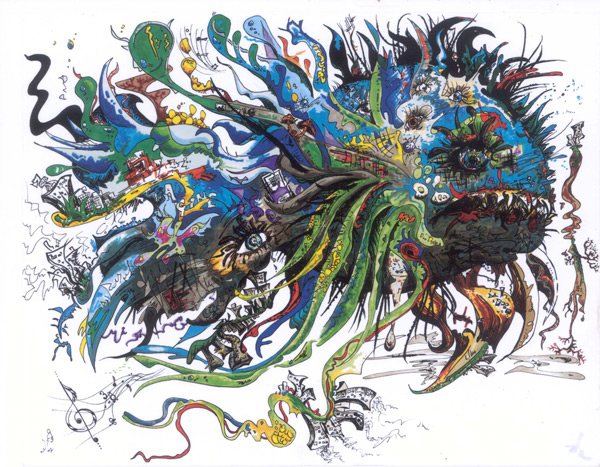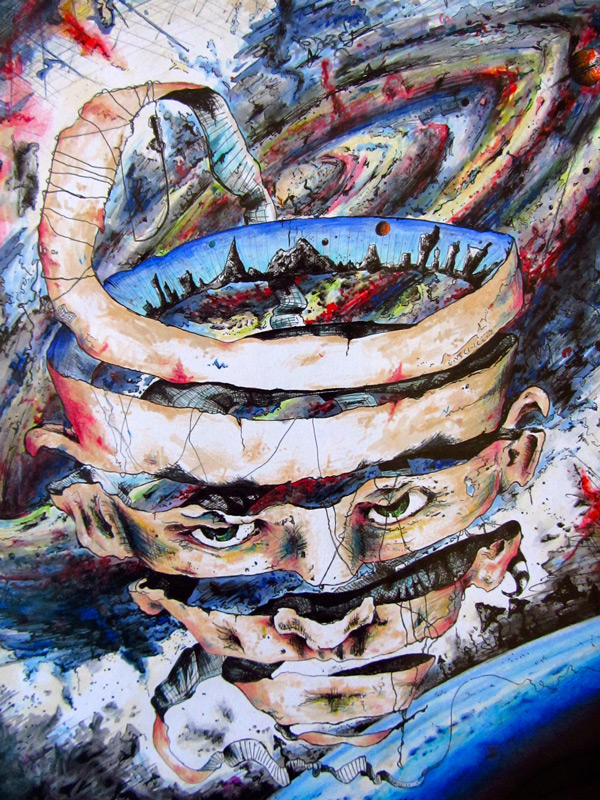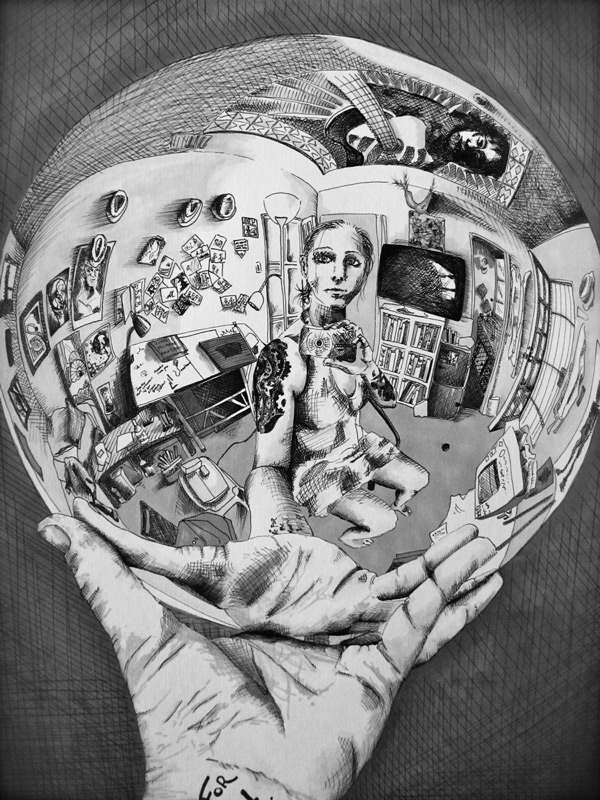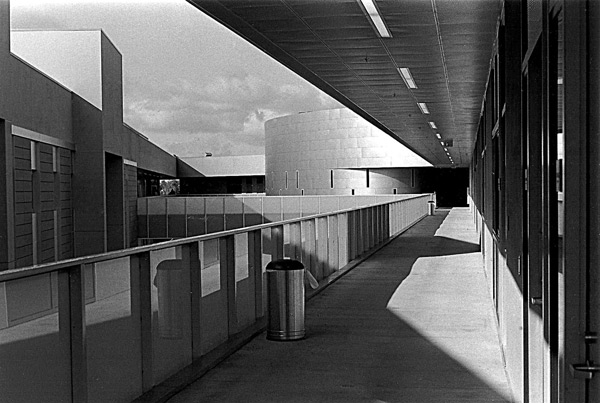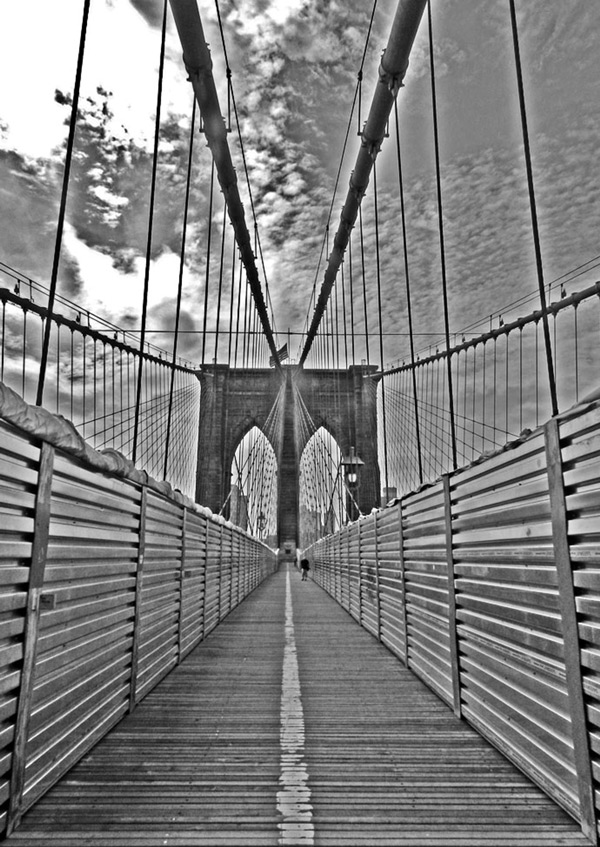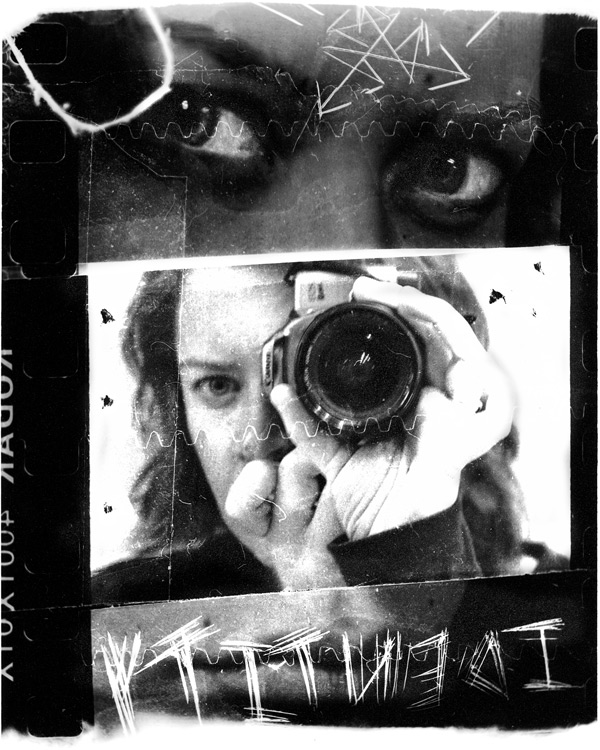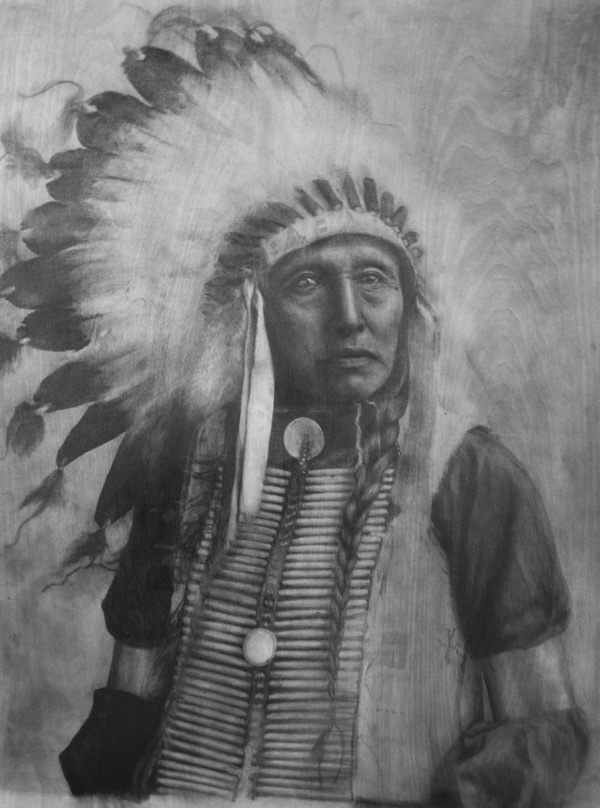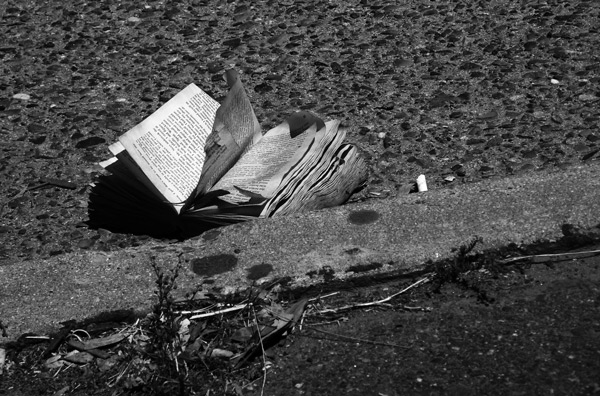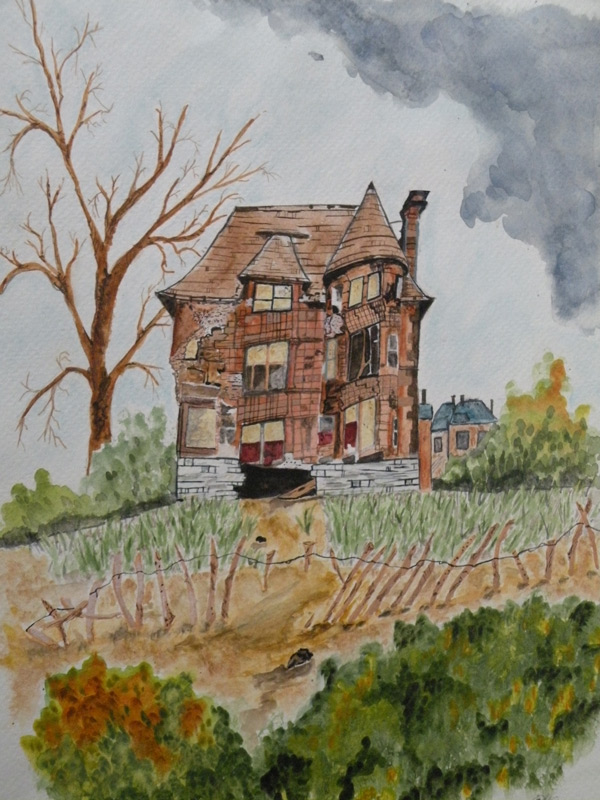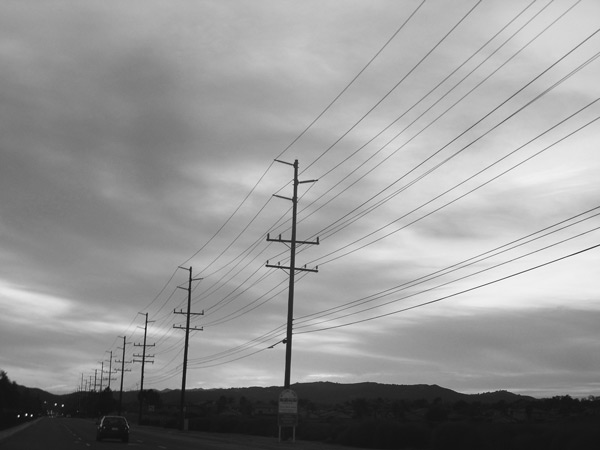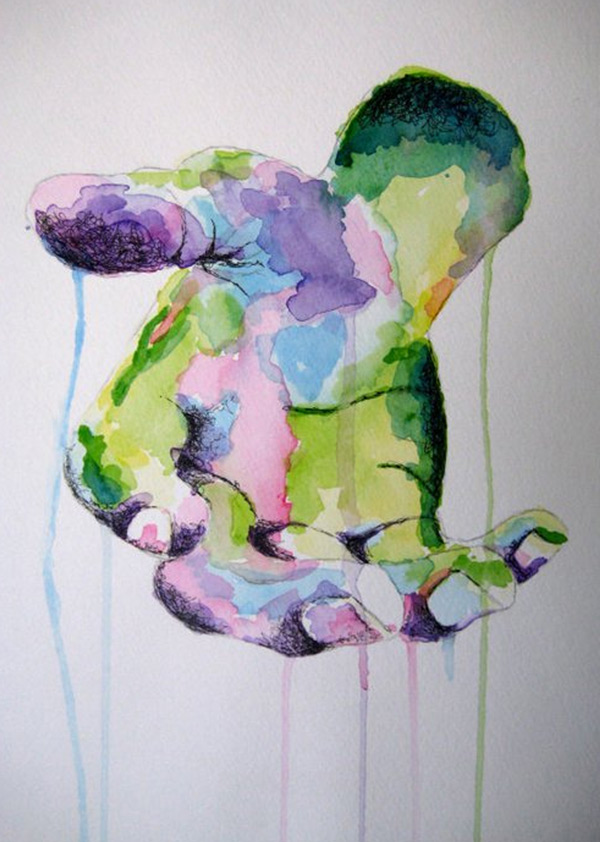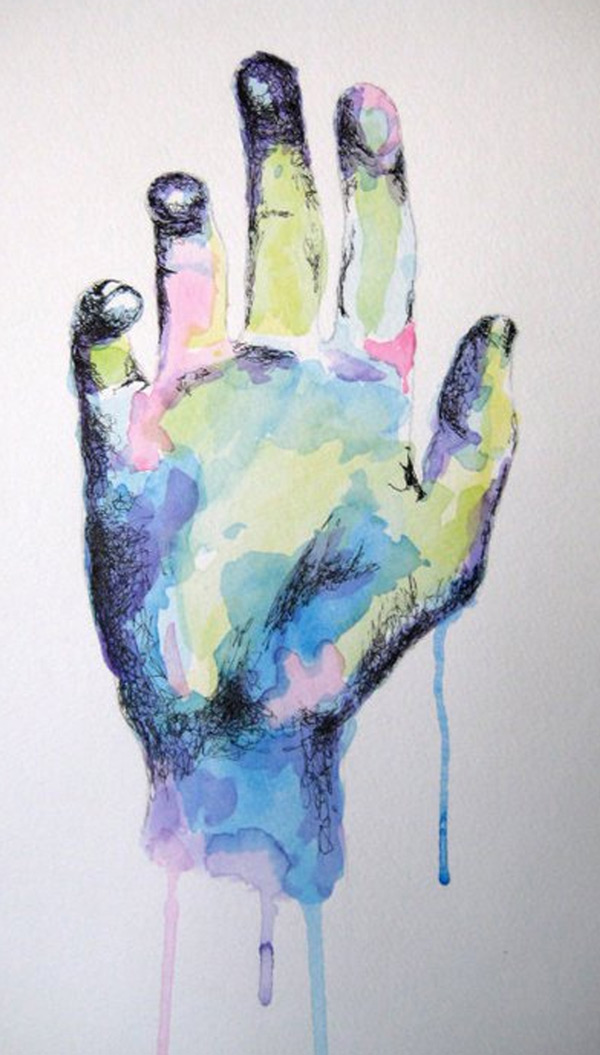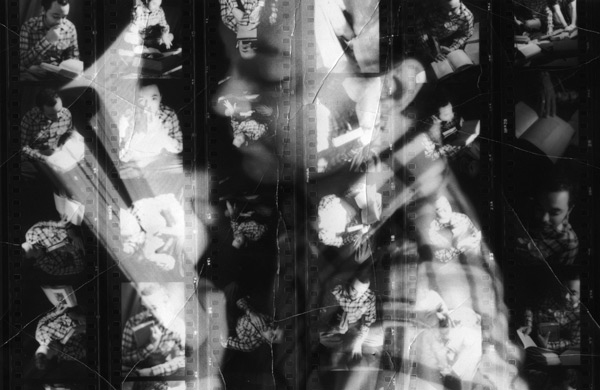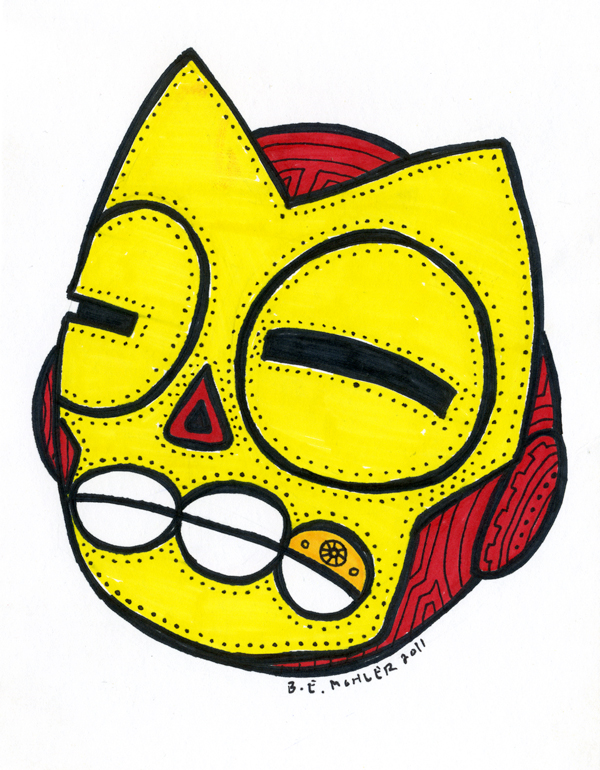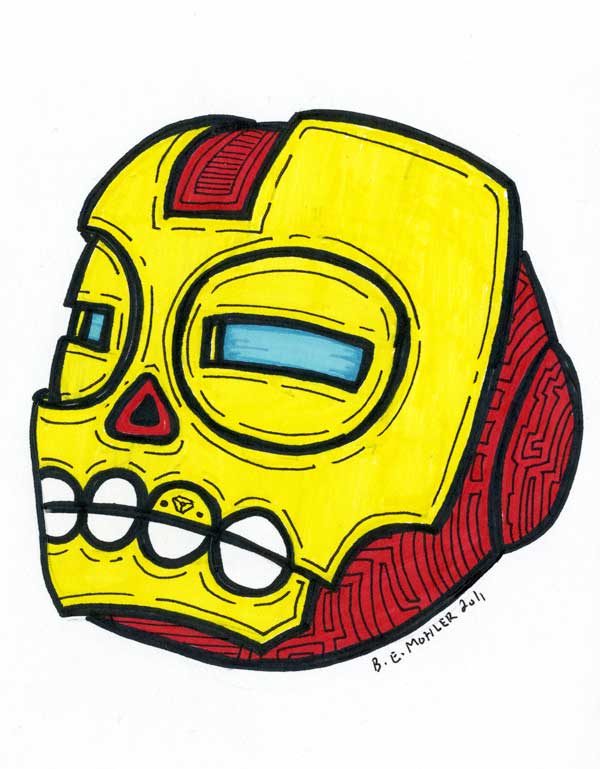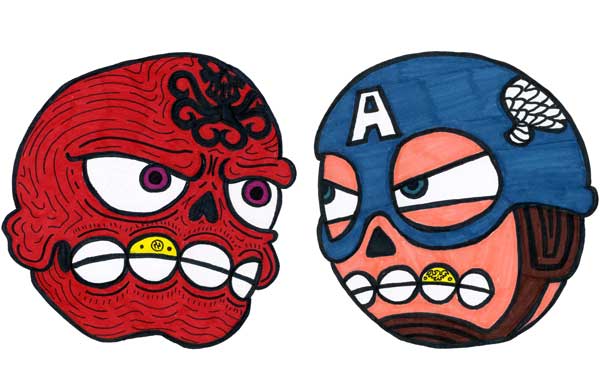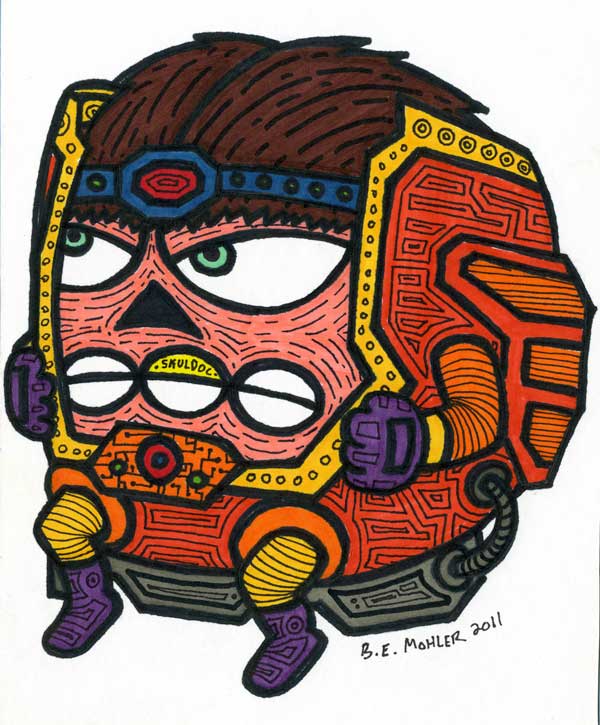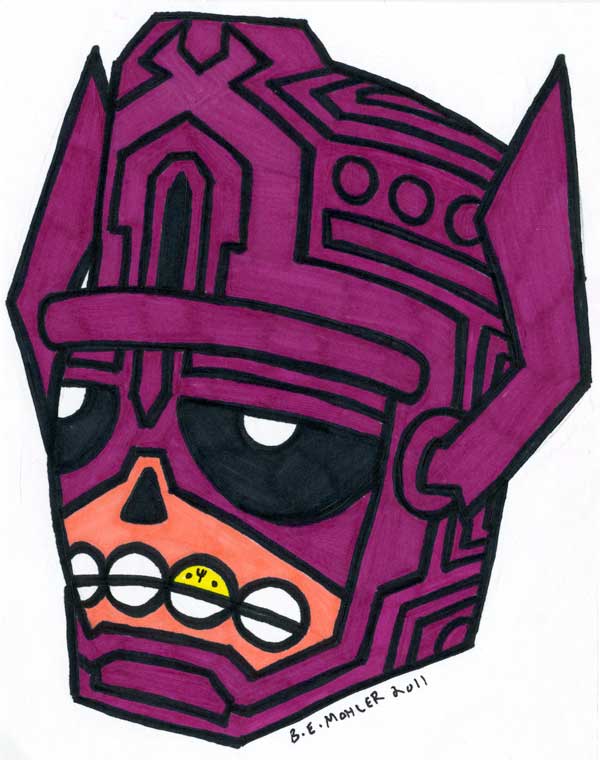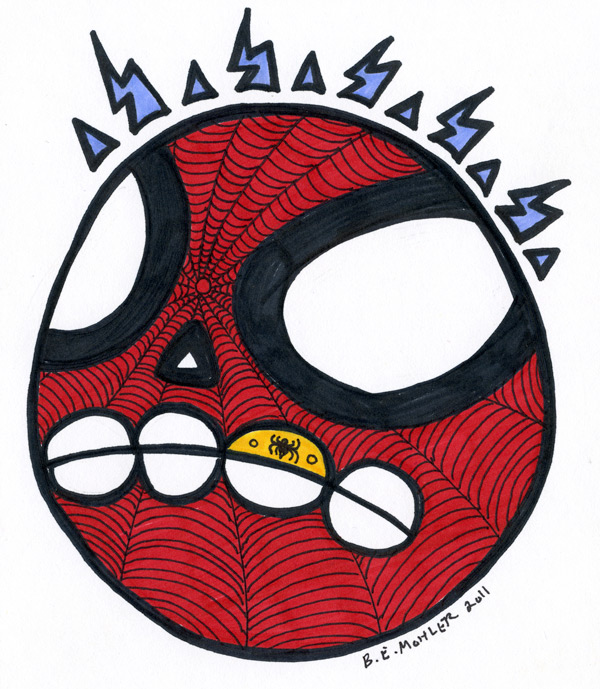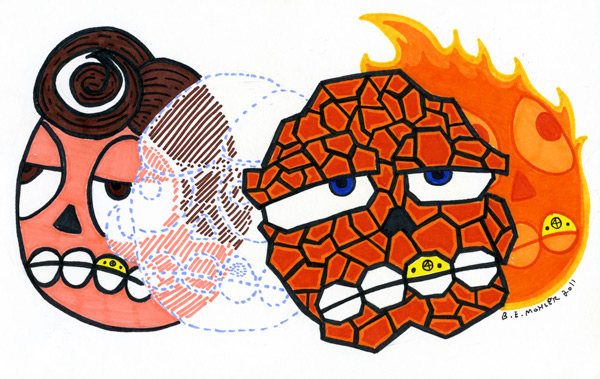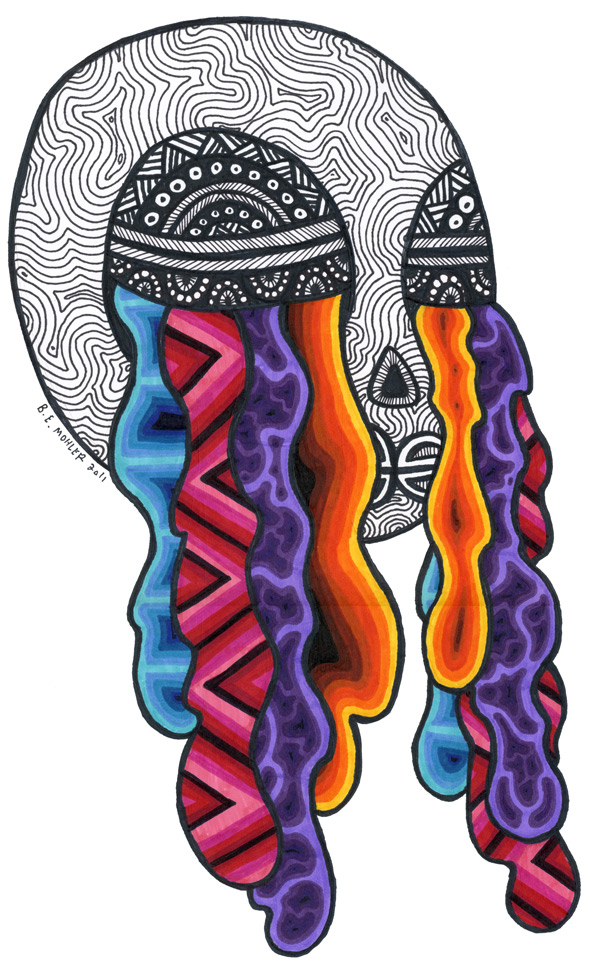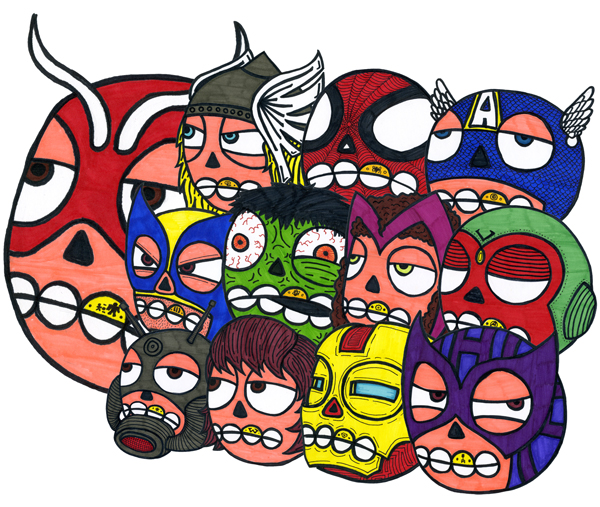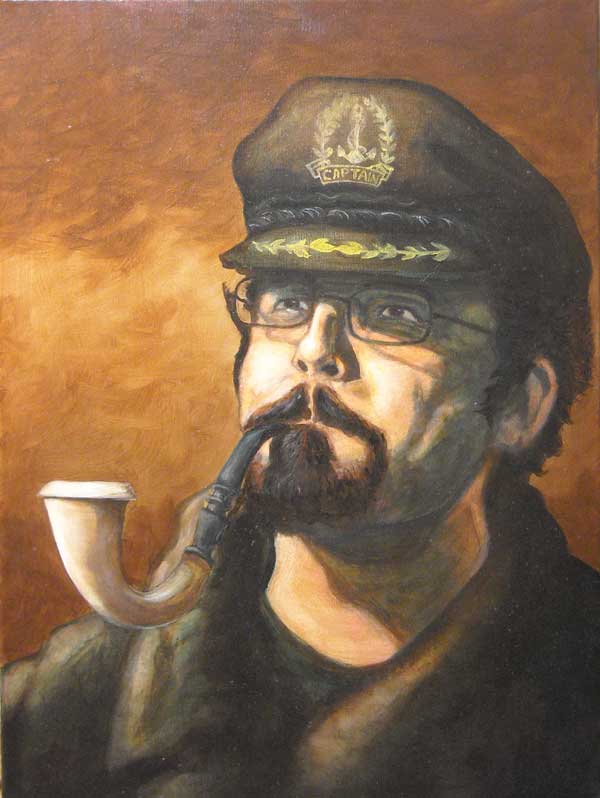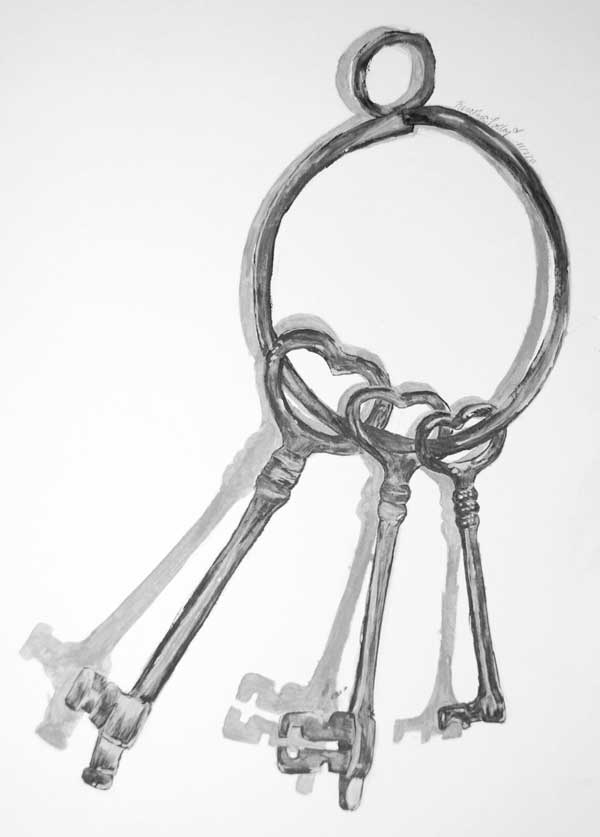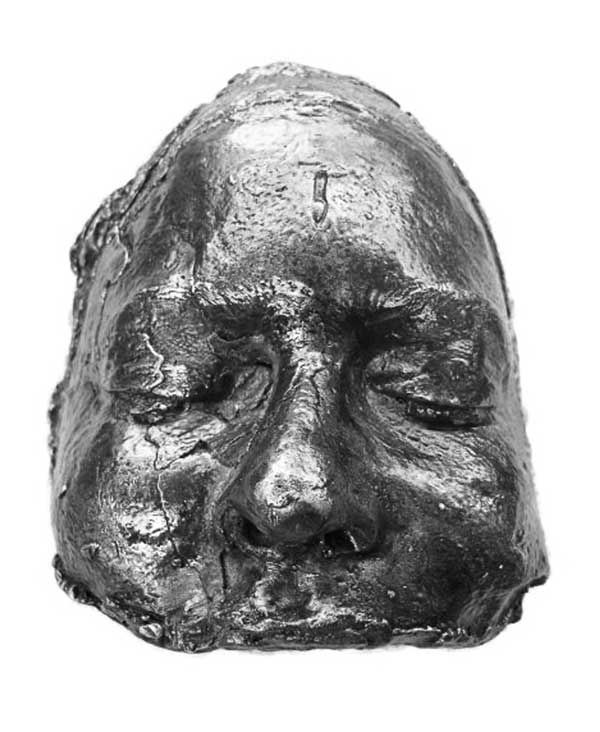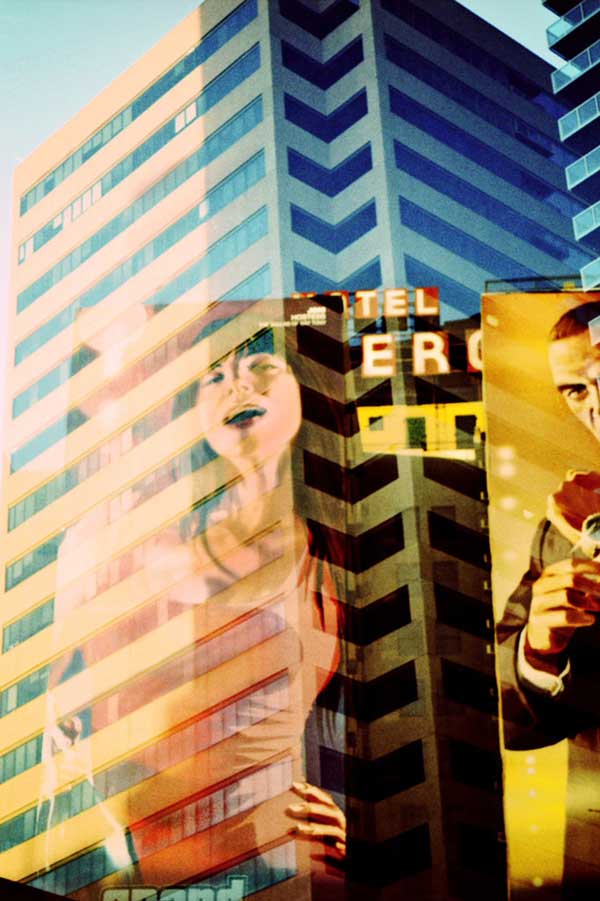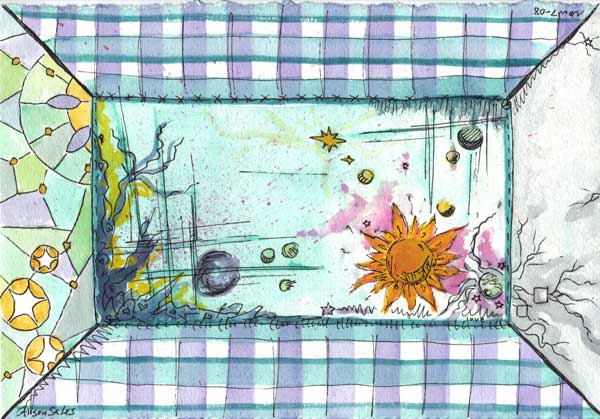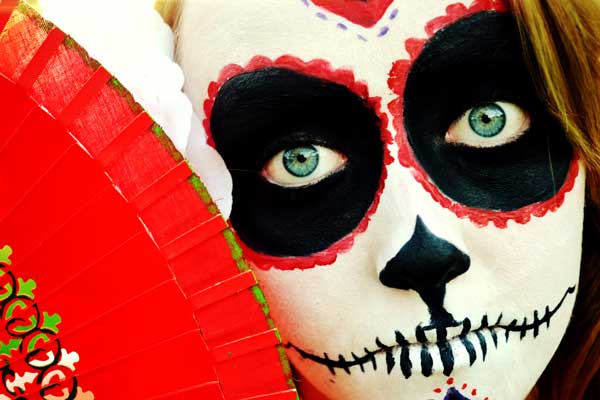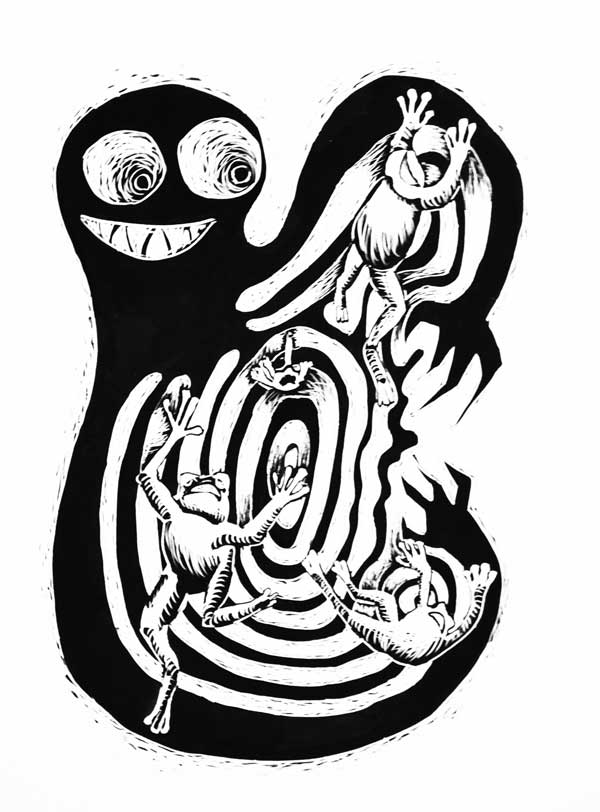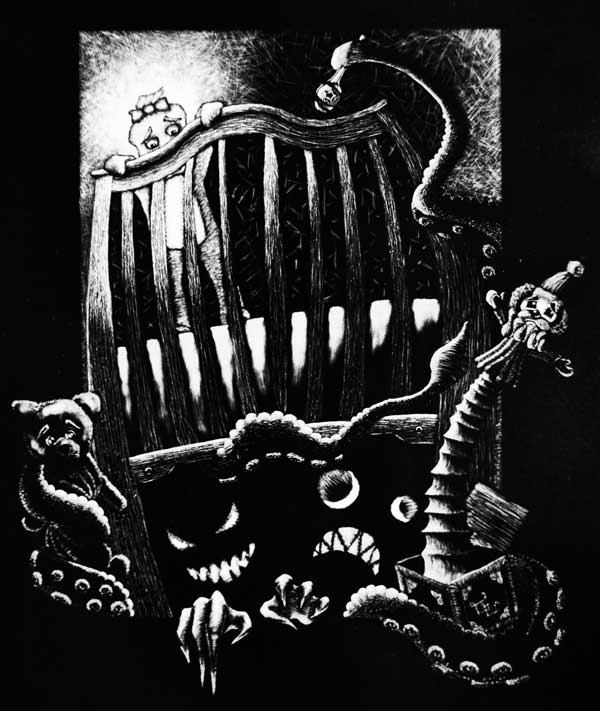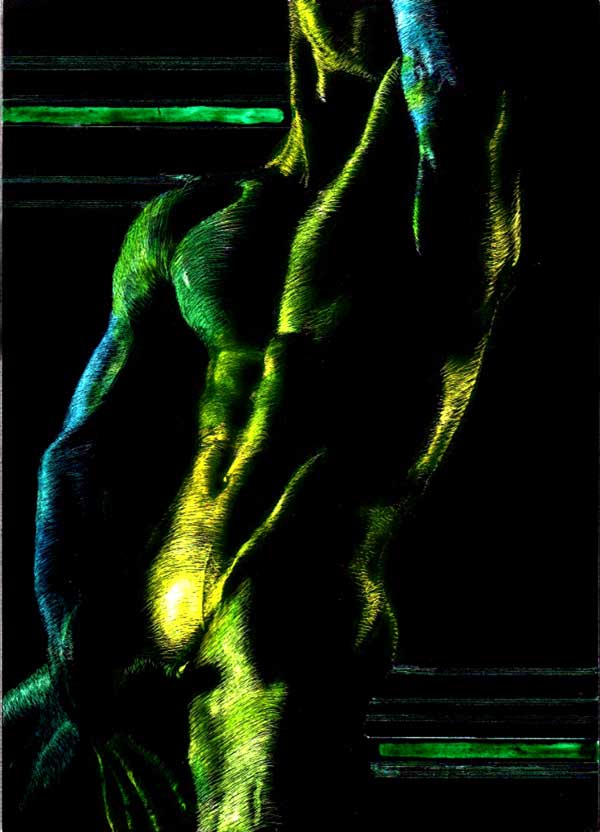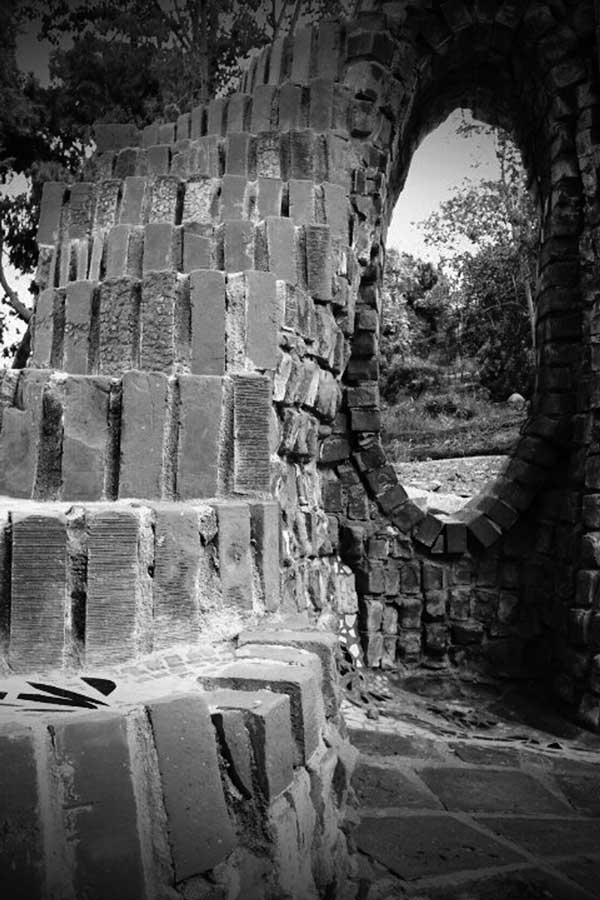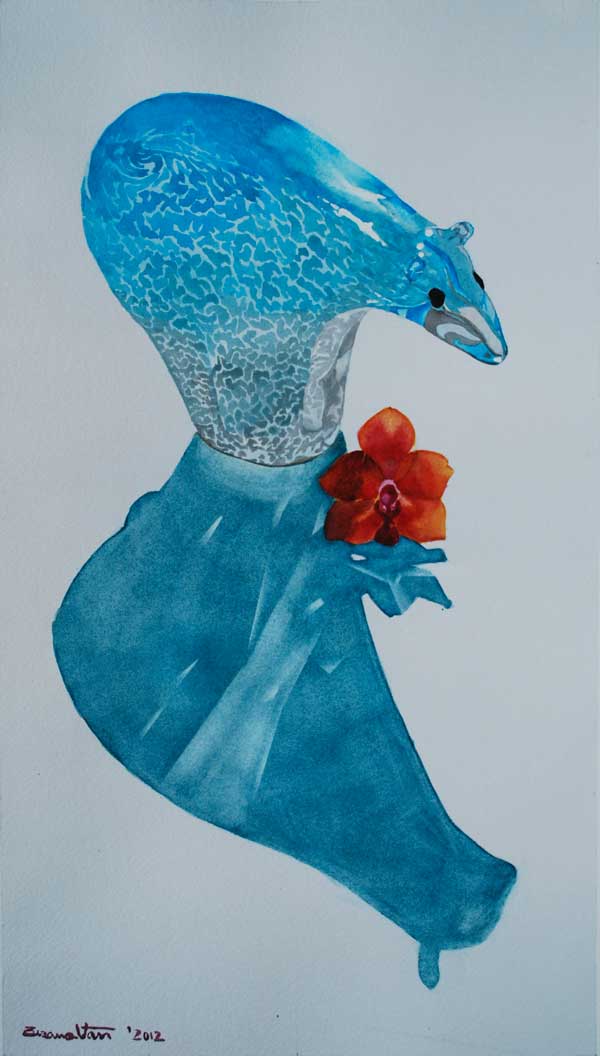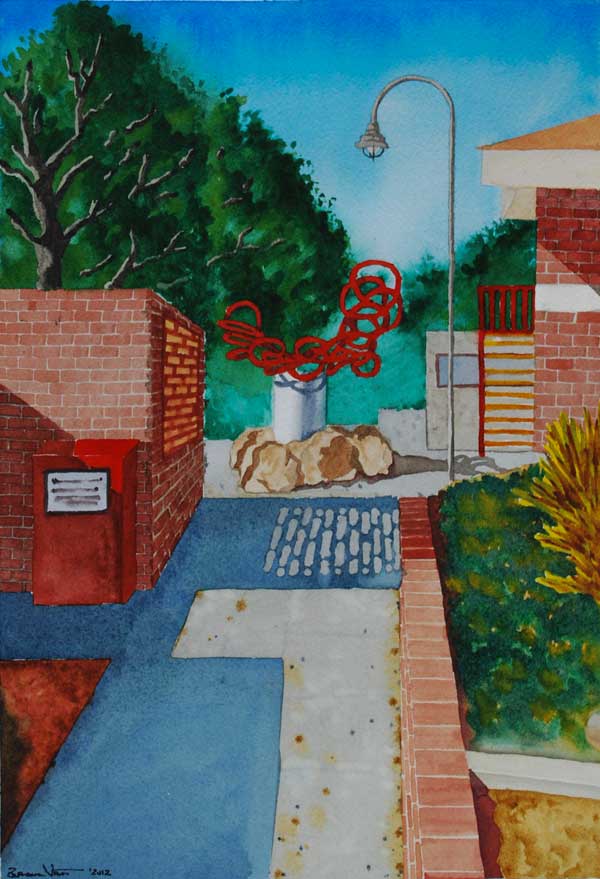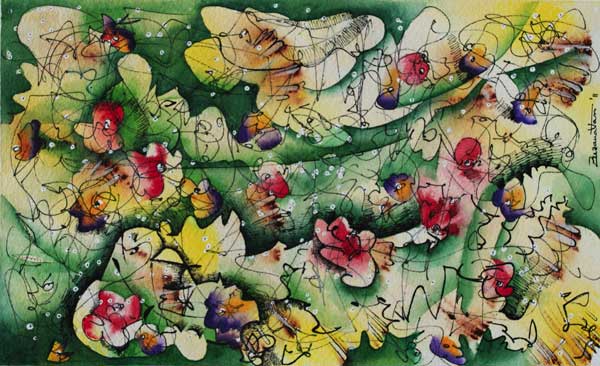Nephilim
Lorelei Baughman
The sons of God saw that the daughters of men were beautiful, and they married any of them they chose.
Then the LORD said, "My Spirit will not contend with man forever, for he is mortal; his days will be a hundred and twenty years."
The Nephilim were on the earth in those days–and also afterward–when the sons of God went to the daughters of men and had children by them.
They were the heroes of old, men of renown.
He sat on the rise with his knees bunched under his chin, his wings torn and filthy behind him. Below, the water rose and swirled, mounting with that never ending rain, rain, RAIN. And the smell. Two thousand years of lousy sewage systems, goat food, myrrh, and whatever else had been building up to spin around in this shitstorm the Old Man had conjured up. You could see him up there, looking a little too self-satisfied when each new tsunami hit.
What a fucking fall. His wings were flopping and useless, and they had been beyond compare, tens of feet like luminous liquid mirrors. Now he looked like any other Earth-bound turd. He raged and bellowed, but the dying men near him were too fucked up to care - choking and spitting and screaming. Between the rain, storm, and the screamed pleas for forgiveness, the noise was unbelievable. They say that drowning is one of the better ways to die. Yeah, right. Tell that to these poor bastards.
The Old Man was definitely on a tear this time, very pissed off at all the whoring, gluttony, pride, whatever that the Watchers had been indulging in for the last long while. He'd been pissed before, but it looked like he'd actually been setting them up on this one. He actually planned this out. What didn't make sense was why everyone had to go. Ok, he was pissed at them, they'd betrayed a trust, but all of mankind? A bit of baby with the bath water if you asked him. You can bet that nobody was asking him, not now.
They'd been there when the Old Man had launched his Big Experiment, and that was one helluva of a week. He'd trusted them then, giving them a hand in his big creation-making. An ocean here, an acacia tree there. After that it had been a lot of work guiding, protecting, and trying to help the poor blokes (dust jockeys, Azazel called them) see above the day-to-day and hand-to-mouth. Helping the folks see that it just didn't work to sacrifice your kids, or kill their best cattle on an altar. There was such a thing as investment.
Not too much evidence of that now, as he watched a raft go by with a young guy who pitched an older couple over the side. He did recognize him, a trader in sheep futures.
Sepharim was gone now, along with Azazel and Araqiel. He'd watched them get flung down from way the fuck up there, their wings ripped from their bodies and tossed down after them like greasy food wrappers. No question about it, he had to think fast or wind up down in the whirlpool with them.
He struggled to his feet, his wings were saturated and dragging with an immense weight. As far as his eye could see, and that was pretty fucking far, were massive moving swells of dirty blue-black water that were tossing trees and people around like rubber ducks. Off to the right, way off, he could see the Old Man. He had to admit, that after that initial spate of lightening-throwing and staff wielding, he'd never seen the Old Man look so sad.
And it's fucking Noah that was the big answer to save the day. Turns out that the Old Man had Noah come to the Big House at the service entrance. Sepharim was definitely asleep at the wheel on that one. Noah snuck in at night like some back-door man, stinking of booze, and you know that the Old Man let that one slide.
He wished he'd just let it alone, but then he saw, smelled, and felt Persephone...
He hobbled over to the ramp along the side of the boat (weird to walk like this, his wings always kept him off the ground), the wind and spray nearly knocking him over. Up the ramp came CAMELS, GIRAFFES, PENGUINS (where the fuck did he get penguins?), two by two, boy and girl, very tidy. He saw Noah standing up on the deck with his family, and couldn't believe they were getting a ticket out, everyone else retching their last breath. You'd better believe the Noah family were no Aristotlean scholars.
Finally he saw a DOG, patiently waiting its turn up the ramp. "Where's your honeybun, Mr Canine?" he queried.
The DOG just looked at him stupidly. Dumb as a stump. Perfect.
Now came the hard part. Up they went, past the kid (who was reading a mystery), and off to the starboard side to their quarters. This was obviously the end of silky flax-spun bedding, just old straw and not too clean at that.
It was actually worse having the time to think. The last time he saw Persephone he could tell there was an extra life there, a tiny beacon of the best of both of them. Maybe somehow they'd survived, maybe. He'd go on forever, that was cold comfort now. Unfortunately, prayer was out of the question, he'd have to lean on hope. He put his muzzle between his paws, and tried to sleep.
Baneberry Fire
Jefferson Conner & Bennie Jones II
One night Brother fought Papa...fought him so hard, Papa stopped moving, stopped breathing, stopped drinking, stopped going to the Hookers, stopped scolding Brother. If that had been in the Coliseum, the crowds would cheer his name, but only I was left to applaud his work.
It happened on the last night in the motel, the same day I learned about how Julius Caesar died from Mrs. Walters. Julius was stabbed...so was Papa, although he saw it coming. Caesar didn't.
Papa and Brother were arguing again. Brother wasn't in his colors; he was in his clothes, although by his anger I would think at any moment he would strip down and begin to paint himself with chaos. Mama had locked herself in the bathroom because she was frightened by Brother, frightened by what he could do. I think she's just weak. Darla was trying to lose herself in our corded phone but it wasn't working, and I was crying, crying because Papa didn't like my drawing of Brother.
I knelt over it, the crumped piece of paper, colored bright with berries, just like Brother. The drawing was of Brother, standing in our color forest, with wicked red in each of his brilliant hands. Papa saw this when he came home, and beat me for it.
Brother came home and saw me curled up on the ground sobbing. He couldn't control himself. He first slapped Mama, demanding she tell him who did this, but she had been out, and Papa had already left to go live it up with his hooks. Mama hid in the bathroom, just as Papa came back from a night of drinking.Brother would show no mercy.
"You had no right!" Brother shouted, the anger rising in him.
"He's my son," Papa slurred as he tried to stand upright.
"You had no right!" Brother repeated.
"Oh shut up."
Brother pulled that knife, that oh so clever knife, from the pocket of that black coat of his.
"You had no right."
"The little shit is becoming like you; had to beat some sense in him,"
"You had no right."
"Put the knife down," Darla said finally, hanging up the phone.
"He won't do it, he's spineless just like his Father."
Brother screamed, although I couldn't be sure it be could considered a scream as it broke all rules of a scream. The sound made my body rattle, the yellow of our room turn white, and filled Papa's heart with fear. I looked up, through tears, and saw Brother lunge forward...
Red. Red was his favorite, and red was what spilled out onto that yellowed carpet of our overly yellow motel room. It wasn't like the wicked red of fire that burns without judgment, or the red that lights up the skies at dusk; no it's more like the thick, dark, heartless red of hatred. The red that you can't really see, the red that you can feel. Julius Caesar bled that hated red.
Darla shrieked, my tears stopped, and Brother smiled. It was a smile that matched the ones he flashes at me once a tree is liberated. Brother's body moved quickly, as Papa fell to the ground in a pale heap. The knife was removed, and heated eyes fixed on Darla, poor, defenseless Darla.
More red, more hated red. I didn't like this red; no, I liked the blueberry blue better, the blueberry blue that came from Brother's eyes as he moved across the room to reach for his half-sister's neck. I could hear Mama howling from the bathroom; I had a feeling she knew what was happening. I sat back beside my crumpled painting of Brother, and watched him work without too much sound.
"Please, please," Darla whimpered as Brother held the knife to her throat.
"Yes, I burned the fucking house down."
"Please, don't, I'm sorry."
Brother smiled again, hated red in his teeth, "You disgust me, you vile commercialized pig. Give me a reason why I shouldn't end you."
"Brother, please."
"Give me a reason!" Brother shouted, pressing the knife harder against her overly colored skin.
"I'm your sister, please stop."
Tears wiped away the fake colors, and made them run.
"He is my only family," Brother spat pointing at me, "He is the only one who understands me, who is willing to listen...None of you listen, you just eat, shit, fuck and die,"
"I love you Brother. Please stop this, I don't want to die," Darla pleaded, the tears streaming like a river now mixing with the beginnings of that hated red; a bit of it was Papa's.
"No-no I'm not your brother, you are not my sister. You're cattle, nothing but blind stupid cattle."
More hated red, more screams; this was unlike liberating trees. I wanted to run, to scream, but this was Brother, brilliant, wholesome, genius Brother. I could not run, not now. Mama had locked the door, and Brother swore for it; another painting for another time I suppose.
Without any more people to be liberated, Brother went for his neon orange bag of berry paints. Tossing some of Papa's cash in the bag, and a few bottles of water, Brother caught my wrist and dragged me from the yellow-red motel
We stole Papa's blueberry blue sports car, and before long were tearing back to the edge of the "gray-lands". When we reached the end of that barren and colorless wood, the sun was rising again. Brother said a lot of things, some of them I remember, others I don't.
"Keep that blood close at mind little brother, keep its color in your head. I want to remember it, I want to paint it, I want to liberate every tree with it. I want the world to know the sin of humanity; the true greed, petrified disgusting greed that has corrupted the roots of this earth. I want them to see, I want them to feel, are you listening."
"Yes."
"You better be listening, please listen, please listen. Colors, little brother, there are so many colors."
"Yes."
"You see don't you, you see the truth. Oh thank God, you see the truth; someone sees the truth."
"Where are we going?"
"Home, little brother. We are finally going home."
After that, Brother started rambling on about things I couldn't even begin to understand. At one point I had a feeling that he was talking to himself but Brother isn't that mad. When we arrived at our colored forest, the sun had cleared the trees and had set itself high in the sky. I followed him to the largest tree in our forest, the one Brother said hed never paint. Brother likes to lie sometimes.
He stripped down, and painted himself this time with red and only red. I watched, sitting on my hands against the trunk of the liberated tree painted with the word, Father. With quick hands, Brother painted the whole lower half of that enormous tree with the red of something Brother liked to call baneberry. To me it looked like strawberries, but Brother liked to lie, and I liked to believe him.
"Fire, the fire inside all of us, it rages, urges us to create, to inspire...Too many people ignore this fire, little brother are you listening!?"
I woke from a short nap and replied with a weary, "Yes."
"You're brilliant, little brother. Smarter than most, that's why Ben and Leah sent you to that school, why Ben didn't want you to follow me. I want you to continue being brilliant little brother, even after I'm gone, promise me that please, please promise me that."
"I promise," I blurted out, unsure of what would happen if I didn't.
Brother returned to his work, and I still had trouble making out what it was. He had begun to put gold into the painting, a gold that shined and dazzled; I had never seen this gold before. After a long while, he crafted a golden ring emerging out of this sea of baneberry red.
I dozed again, but was startled awake moments later by more of Brother's rambling.
"NO!" He shouted as he knelt down to my level and stared at me, his head cocked to the side like an owl.
"No, I will not join your army!"
I'm not sure who he was talking to, but I just replied with an honest, "Okay Brother."
"And I will not fight your war!"
He stood up straight and puffed out his chest.
"Do not fight in their war; do not fall for their army's lies,"
I glanced behind him, and saw that Brother had begun to paint a clock, a golden clock, spotted with droplets of baneberry blood.
"I am the fire, you are the fire; we are all the fire!"
Brother began running around the tree, screaming, "Fire, fire, fire," and laughing hysterically.
"They are fire, they have fire, but they will be burnt by the coming fire," Brother said, as he stopped running around and returned to painting.
"Is it almost done?" I asked.
Brother shrugged, "Has the world heard yet?"
"Heard what?"
Brother flashed me that smile, the hated red stained onto his teeth, "Heard of its sin."
I didn't reply, and just stared at Brother blankly.
"It's okay, you don't understand yet, you will,
He went back to his painting, and I went back to my sleep. I dreamt about Julius Caesar and Papa. In my dream they were talking in the forest, when Brother leapt out and set them both ablaze. Together, all three of them began chanting, "Fire, fire, fire." It was odd.
When I awoke again, Brother was gone, and the tree was all that I could look at for a long time. Brother had painted something there, something that is tough to shake from my memory. It was the image of a golden watch reading five till midnight, sitting in a pool of baneberry blood. This was one of Brother's best paintings, and it kept me wondering as to what it was and why he had painted it.
I waited for a long while, staring at the watch, hoping Brother would come bounding out of the forest to tell me more mad words and even madder promises. Eventually dusk set, and I was getting cold. I took Brother's neon orange backpack, threw it over my shoulder, and headed back to the 'gray-lands'. On my march out, the faces of the liberated trees seemed to watch me with anger, hissing at me as I walked alone. I took to running, the sense of betrayal burning my throat.
Once I was back out in the street, night had fully set upon me and I decided to wait a little while for Brother. Still no sign. The car was still there, which meant he was somewhere still in the forest. I took to walking along the forest edge, hoping he'd be waiting for me.
The night was thick, as the moon had decided to hide for the evening, so I found myself stumbling as I walked along the tree line. After patrolling didn't work, I went to calling out his name, a name I hardly remember. Still no reply. A few neighbors spotted me, while they were either out walking their dog, or going for a late evening jog. Some wanted to help, said my mama was probably looking for me, but I was sure to tell them off like Brother would.
"Don't you have something better to do," I'd hiss, or "Fuck off." That was Brother's favorite to use on people. I slept in the car that night, covering myself with Brother's backpack and wondering what could've happened to him. My dreams were fogged with that hated red, and of Rome, or was it Roan? I can't remember. The next morning, I ate at some granola he had packed especially for me. Once I was mildly full, I went back to the tree where Brother had painted the bleeding watch.
I saw something perched on the branches. I thought it was a bird, but birds didn't hang upside down. They weren't that big, either.
When I dared to take a closer look, I saw the blueberry blue of Brother's face, the hated red still in his teeth and the blank gray of his eyes.
I watched him hang from that tree, with a rope wrapped around that slender red neck of his. I wanted to climb up and be with him, join him in that faraway place he always dreamed about; he did say you couldn't get there by plane.
Without too much sound, I went to the neon bag, retrieved Papa's beer, and poured it at the base of the tree. Then with careful hands I lit a match, and watched the fire spark to life; such beauty in something so terrible. Brother would've wanted it like this.
Standing back, I admired my work; the textures of red, white, and gold. Not quite white, not quite yellow, but something in between. Satisfied, I turned from the bleeding tree, and stumbled past the faces who now watched with a sense of pride.
When I passed the final tree in our colored forest, my body locked up, and I wailed in pain, a terrible, terrible pain. I felt like Julius getting stabbed, like Papa getting stabbed.
Red was Brother's favorite. Red that lit up the sky when it was time to go Home, or the wicked red that turned things gray, or the hated red that spilled from people if you press hard enough. Red is my favorite, too. Wish I could tell Brother that...
Inside Voice
Kyle Della-Rocco
Why is this in the soup aisle? Tom puzzled as he picked it up, noticing on the back that the instructions for the toy were in Chinese. He wondered why this could be as he strode through the store, passing by several children and parents. He set it down on the white metal shelf above its little red placard, and noticed it was the last Buzz Lightyear toy.
He turned to head towards the back of the store again, but couldn't help but watch as a boy swaddled through the store, the bulbous fat jiggling out from under his too small t-shirt. Tom moved aside as the boy walked up to the toy. The father walked by Tom and briefly acknowledged him by nodding. The father made his way to his son, shoving him forward several feet. Tom started to walk away, but then heard the loudest sound coming from behind him. The sound was a piercing shriek, almost like the sound a dinosaur would make in a movie.
Tom turned, shocked to see the portly boy screech at his father, "I want it!"
The father looked at his child, "Jeffrey, I told you, we can't afford it." The boy squawked out facts and figures about the action figure in his hand. Tom could see the father sweat and his face became a tomato red.
"It's the best, I love Buzz Lightyear, buy it!" He could see the father's hand shaking, as the father moved it up to strike. Tom wanted to move forward, but his feet didn't want to listen to his commands.
The father stopped his hand, "Jeffrey, we're leaving."
"NO!" The boy planted his feet firmly on the ground. "I'm not leaving, you can't make me."
Tom heard the loud smack, saw the red mark on the boy's cheek; he could feel the sting. Tom felt ashamed, as if he should have intervened. He saw the man's face shift, his eyebrows unfurrowed as he broke out into a smile. Tom moved a little bit closer, but stopped himself, unsure of how he should act.
"Ha ha," his hand struck the child again, he laughed. "Jeffrey, you're my son and you will do as you are told." Tom wanted to do something, to say something, but an invisible force steadied him, kept him still. He watched the father heft the load onto his shoulder.
How is he still able to stand? thought Tom.
The father walked as a lumberjack would carry tree trunk, a wide grin on his face; a mechanic carrying a transmission.
"Where are you taking him?" Tom blurted out, almost feeling he overstepped his bounds as the father walks by with his load.
The father turned, almost banging his son's head into a shelf. "I haven't decided; meat packing plant, or his mother's..."
The Golden Abyss
Donna Dellinger
Yellowish light tried to shine through the greasy candle globe set on the table. It seemed to flicker with the thunder outside. Hamerin sat slunked over, lining and re-lining up his collection of shot glasses. The waitress named Maggie kept the whiskey coming, but for some reason, she never cleared the empties away. Perhaps she thought he needed them. Something to keep his hands busy. Certainly not to occupy his mind.
"Same Old Song and Dance" started playing. Hamerin had dropped coins for that song what seemed like hours ago. He lifted his full glass to a face of knots on the pine paneling and toasted, "To Rose." He brought the drink to his mouth, then tilted his head back sharply. The amber liquid ignited his throat as he swallowed. He sucked air through his clenched teeth; his eyes swam for a moment, and he closed them, reveling in the rush. When he opened them, he noticed that the glasses had doubled and immediately set his hands to straightening them, fingers going right through some.
Then the song cut out. He whipped his head around in the direction of the juke box. Two men were standing there. "Hey, that's my song," Hamerin shouted to them. He pushed out of his chair and walked over in shaky strides, teetering before grabbing the edge of the nearest table.
"We don't listen to that old crap, do we Ted?" said the bigger guy with a squared-off crew cut.
The other nodded. One of his rhinestone studs caught the light from the juke box and flashed neon blue.
"I used to play that song. Me and the band." Hamerin wavered, but stood tall.
"You can't play shit."
"No, look." Hamerin reached into his wallet and pulled out an old guitar pick. "And I'm gonna play again, too." He shook it in their laughing faces.
"Get lost, loser." Crew Cut grabbed for it, but Hamerin swung his arm away.
The pick slipped out of his hand. Hamerin bent down to get it and toppled to the ground as the two men muscled past. On his knees, he continued to grope for the fallen object. He thought he saw it peeking out from under the juke box. One long reach put his fingers into contact with its cool, plastic form. "There you are," he whispered. Then his body melted into the floor. It just felt so good to be one with the carpet.
There you are. The words seemed to repeat in his head as he lay on the ground with his eyes closed.
"I've been looking for you." But no, the words were definitely outside of himself. A female voice. He thought he felt a small jab in his side, like someone was prodding him with a pointed toe.
Hamerin looked up and the two heads above him became one. An attractive young woman was staring down at him. Her blond hair glowed like a halo, but her glinting ruby lips hinted worldly experience.
"I'm Deidre." She pulled him to his feet, then handed him a card as if presenting an ice cold Corona.
Through blurry vision, he read, DD's DD Service. "Double D?" He grinned.
"Turn it over."
Let me take you home, it said on the back.
"You are an angel." His grin became wider.
Deidre slipped an arm around his waist and walked him out. He felt the warmth of her body through her slickered overcoat.
Outside, colored lights pooled in the pavement, dazzling his eyes. Deidre helped him dodge the water that had collected in the pitted parking lot. The smell of rain filled the air, but the clear night sky signaled that the downpour had moved on.
With her arm still tightly around him, Hamerin fumbled for his keys when he spied his old pickup, then stopped, realizing it was her black Mercedes they were headed for.
That's okay, he thought. He would sit close, maybe nibble her neck, fondle her breasts while she drove.
"Wait – " he started as she guided him into the back seat.
"Shh," she said, pushing him the rest of the way in. She bent over him and fastened his seatbelt, her cinnamon breath brushing his cheek. Her lips should be there too. He leaned in for a kiss, kept leaning until he flopped over face first on the leather bench seat.
When Hamerin awoke, he was in front of his apartment, his angel still with him. His head pounded as she helped him out of the car. The cool night hit him in the face, and his headache subsided. He could see clearly now, and anticipation rose up inside of him as he studied the curves that had snuck out the front of her coat.
Together they climbed the few steps to his door. For some reason, Deidre was the one unlocking the lock...with his keys.
"So there they are." He tried to make it sound funny, but he realized it really wasn't. He frowned at himself for ruining the mood and tried to get it back by slipping his arms under her jacket and around her waist. He was surprised at how cold she had become. The slight chill in the air must have gotten to her. He would warm her up soon.
But she politely removed his hands, hanging on to one in a handshake. "Nice doing business with you." As they continued shaking, he thought he could feel the bones within her fingers, but that could have been the whiskey.
"My pleasure," he said. He swung the door open and entered first so he could get the light, then stopped when he realized that she hadn't followed. She was still standing on the porch, the booze making her look a little fuzzy at the edges.
"You comin' in?"
"No sir," she said. "I just need what's coming to me."
She started to come more into focus. The night was coming back to him. "I get it. DD. You're a designated driver."
"Yes sir."
"What do I owe?" he said, fishing out his wallet. "Never mind," he added quickly, grabbing whatever was there and putting it in her hands. "Take it all."
She sifted through the crumpled bills in her hand and pulled something out. "This too?" she asked, holding up the pick.
He snatched it from her hands.
"No," he said. "No, not that."
As she walked to her Mercedes, Hamerin turned the old guitar pick slowly in his fingers. The tiny embossed word was barely discernable to his touch: Rose.
He looked up and stared after Deirdre's taillights. Then he blinked, and she was gone.
The Face in the Box
Deb Ebert
Iceland. Iraq. Virginia. Indiana. I turn away from the picture of Uncle Roger. From all of these pictures. They need to go somewhere else, where the hard lessons go once you learn them, like when I touched a red burner for the eighth time, expecting something different to happen. I could write anything and no one would know the difference but me. I realize I have to start somewhere, anywhere. I return, forcing my legs slowly up each step as if I had just spent the last twelve hours in a classroom. When I look at my laptop again, I notice the light on the monitor had dimmed. All I see is the face in the box. I do not know my own story.
Debra Kay did not trust the word home and wanted to be far away from Indiana. She had earned a full ride to Indiana University and was considering the Air Force ROTC program that promised she would see the world when her closest friend suggested enlisting outright. She thought about it, concerned how much see wanted to meet Bobby Knight. It was not until she brought a history class study group to her house to work on a project that she decided she would, in fact, enlist. Debra Kay's mom welcomed every guest while they were there but scolded her daughter afterwards about bringing a black boy into their home. Debra Kay had heard enough. She was finished with the rants about colored music, black television, and the minority Olympic athletes. The very next day was her first meeting with the Air Force recruiter. He told Debra Kay about the wonderful things she could accomplish in the Air Force but warned that she would need parental permission. Back at home, she pleaded with her mom. This was peacetime after all, what could happen to her? Her mom relented. Twenty four weeks later, Debra Kay was on her way, bound for a much bigger place than Hanover, Indiana, full of people different than she ever known.
Life was not fair for Airman Ebert. She had only once called Master Sergeant Sacco a dumbass to his face before throwing up her hands in disgust and huffing right at him. She could not help her lack of filter this time; he refused to answer a single question of her about Air Force history, and she needed to prepare for the promotion exam she had in two weeks. The additional duty was a punishment. Airman Ebert was reduced to shivering in a cold dark guard booth for twelve hours watching planes that would not move. Everything was silent. On the tarmac was her favorite aircraft, an E-3 AWACS. She had just taken a familiarization ride on it. There was a rotating radar on top. A was a beak sticking out of the windshield, and she enjoyed an emergency layover in the plush green countryside of Scotland. There were no such colors in Keflavik, Iceland, where she was assigned. Only five shades of gray: the darkness of the mountain, the brightness of the snow banks, the dinginess of the slush, the bleakness of the buildings, the heaviness of the clouds overhead. And the cold seemed colder. Iceland was not supposed to get this cold. Thirty below zero. Thermometers shattered at this degree. She stomped and clapped under the three layers of clothing under her uniform and her black toboggan hat. Airman Ebert could see her breath and tried to clock when the vapor turned to ice. Her eyes moved and her breath caught. Stars peeked through the greens, blues, and reds that made the sheets of light that shimmered off of the Atlantic Ocean. She felt like she could reach up and touch colors her eyes had never seen. Her hands moved in different directions. She tried blending the colors but the yellows, purples, and oranges moved around her of their own accord. She could hear the deafening crackle around her and nothing else. Nothing was cold anymore.
Debra had two Dobermans, was a marksman with her Glock 45, and well versed in three forms of martial arts but still double checked the doors and windows every night. The only mild relief she got was when Uncle Roger visited. She hated Virginia and the fact that she was a civilian again; he knew it and made a point to make special truck runs from his home base in Indiana to check on the twenty-seven year old who grew up calling him Dad. In this man's presence Debra was safer and he had made it so ever since it was clear his sister did not want a third mistake. Debra had seen the photos of her mother, brother, and sister sitting happily at Grandma's. She had her own picture of that time: Uncle Roger and her, smiling blue eyes sparkling from both occupants of that early eighties orange couch. The second time Uncle Roger visited Debra's Virginia rental, he immediately questioned the glossy, nothing-is-painful look in her eyes as well as the near empty bottle of painkillers on the entertainment center. Debra assured his narrowed eyelids that she had just come in and had left her sunglasses in her truck. It was a half-truth that kept her eyes from meeting his. It had already been discovered that year that Uncle Roger had developed a heart problem, and Debra would be damned if she made it any worse. He had to know she was fine. Debra left to go to the grocery store to pick up the water he wanted, stopping for a refill.
I sit down again. The words are coming so fast now I can barely keep up. I haven't been able to buy a car, cook a meal, sit through a single class, or watch a movie without new images taking over and different words coming to mind. Edit this sentence. Change that point of view. Clarify this. This draft is more defining, but do I have that much-needed purpose? Theme? Goal? Right now I am supposed to be memorizing facts from the Second Continental Congress for a test tomorrow. Writing is making me bipolar. One day I am pushing the images away and then I wake up again and welcome them. I think about what I want I really want to say and why I need to say it now.
Pepper loved April like a sane sister she had never known and was dismayed that she put her best friend into danger beyond comprehension. The two had met while inbound at the same time to Barksdale AFB in Bossier City and bonded instantly over their mutual love of the finely tuned craft of being a smartass. Pepper had gotten her name from April, who gave it to her because some random drunk guy who tried to introduce himself could not understand it when the Midwestern accent said Debra in introductions that took place in northern Louisiana. April convinced Pepper and Pepper convinced the Lieutenant Colonel and he convinced someone else to allow April on a deployment that included forward flights into the most dangerous city in the world in 2003. The seats in the back of the C-130 Hercules were configured so that the friends did not lose sight of one another. Pepper watched April's jovial reaction as they took off from a safe top secret location. The two young women flew with others, watching people they did not know until they entered Iraqi airspace and the cargo aircraft immediately went into combat mode. All lights in and on the plane were shut off, radar blips silenced, guns drawn from every crew member onboard, and not one person uttered another word. From the few tiny windows all they could see in the night as they began the descent into Baghdad was the red from the oil fires burning. April and Pepper were flung against one another as the plane unexpectedly banked hard left. The pilots circled everyone in, pulling G forces meant only for a fighter aircraft, and then banked hard right as stomachs entered throats. After more circles, the dark runway came into view of the aviator and the airplane nosedived with increased speed, leveling out and shooting flares into every direction a mere three seconds before the punishing firm landing that jolted every person aware. Within a fraction of a second of the wheels screaming to a stop, the back of the aircraft opened up, lights briefly came on and two among many were marshaled out at the speed of sound. Pepper glanced to April as the yells came to run for cover and the smell of gunfire and sight of tracers flying up into the sky engulfed everything they once knew. April had not even broken a sweat.
Debra overdosed and no one would care. She had said her final goodbyes to her Uncle Roger, military life, and too many pills. When she returned to Indiana after her aunt begged her, she could read everyone's mind. It didn't matter that she saw that man every night in her dreams or had to wake up realizing he was forever gone. It didn't matter that she was forced out of the only home she ever knew. Now there was something else, something that would stick forever: addict. Debra's aunt picked her up from the airport and drove her directly to Stonewell. Once they were behind locked door, alone with a single doctor, her aunt broke down. Debra listened as her aunt pleaded for her to have a better ending. Someone had to do better by Debra, especially Debra herself. After the interview, the doctor let Debra's aunt see her niece's new home on Stonewell's third floor. As they entered the bright hallway and the nurse's station came into view, another doctor, a nurse, and Debra's three new roommates emerged and welcomed her to a different kind of recovery.
It was eleven pm in Kirkuk on this cold December night. She worked so close to the perimeter that she had to race in complete darkness towards any cover when the shelling started. Ebert reached the terminal to find that the C-17 she was hitching a ride on would be delayed for hours. She wondered what the holdup could be. Ebert boarded the flight after all of the other occupants and when she saw the space that was left for her, she had to look away. It was the only seat left, the one next to the box. The box that was on its way home where the people of the person inside would claim it and put it in the ground and say a few words that might mean something. Who was in that box? She tried to imagine his face. She was sitting so close she could reach out and touch the stars and stripes. Did he take a bullet that was meant for her? What was his last expression? Nothing made sense to Ebert, other than the fact that they all were on a homebound flight with different destinations.
I used to be your property. No move was made without your consent. You gave me friends and then took them away. You blamed me for your mistakes and took credit for what I did right. You took my identity and robbed me of my voice so that you could say whatever you damn well pleased. Whenever I did try to speak, you said I asked too many questions and forced me nose-first into a corner. I broke by back, shoulders, and spirit for you. You don't acknowledge me any more even though you still prosper from my efforts. My face is just one of many and you do not care. I have news for you. I am better off without you in my life. I have a voice now. You would do well to remember that. There are no more corners to shove me into or blame to hand my way. I have untangled myself from you. I am free.
Apples and Bananas
Raquel English
EVIE
I've been coming to this same grocery store for five years, and each time I suffer the same dilemma: apples or bananas? I'm pretty sure I've broken the world record time for staring at fruit. It's just that every time I reach for one or the other it's like a rope yanks back my wrist. Shopping shouldn't be this hard
Both bruise equally and lose their taste over time, I already know this. They're even marked at the same price today so that doesn't help. It just has to come down to which one I want more, I guess.
The bananas are curved like a smile full of genuine sweetness. But they're strong too, protected by a durable peel. The perfect combination of outer strength and inner sweetness. That's what a banana is.
But then you reach for one, and the stem stabs you in the hand. You try to grab it to peel the banana open, but it won't open. No matter how much you try, the peel remains stubborn, and you can't get to the delicious fruit inside. Then you realize it's not curved into a smile. It's upside down, a frown. A frown because that's what you're left with when the stem doesn't crack and the top bends over and the fruit you thought you wanted at first becomes a mushy mess of disappointment. That's what a banana does, it disappoints.
And then the yellow begins to dim as your eyes are drawn to a subtler gleam, the gleam of an apple, hypnotizing you like a snake charmer. Vibrant colors, various sizes, craved tastes. An apple also has an outer layer, but it's much easier to penetrate, chipping away at the tender flesh searching for that fulfilling core. They even say "the apple of my eye" because an apple doesn't make you feel like an option; it makes you feel like a priority. Even Snow White couldn't resist taking a bite of the tantalizing fruit.
This is an apple, and that is a banana, and of course I know which one I want.
"Evie?"
The hypnotic sound of this familiar voice was like glass hitting a hardwood floor. Of course I knew right away who it was, and I tried not to sweat when our eyes met.
"Luke? I didn't know you shopped here." My knuckles whitened as my grip tightened on the cart handle to keep myself from swaying toward him.
"I don't usually, just thought I'd pop in and see if there was anything I liked. Hey, you never returned my call."
I saw a gleam again and thought it was another apple, but when I looked down it was just light reflecting off the ring on his left hand, blinding me for just a moment.
"I know. I'm sorry Luke, but the answer is no."
"All right. Well, I guess I'll just see you around then."
I wondered if he could feel my increasing heart rate as he leaned in and picked out his produce.
"Yeah, sure."
As he walked away, I knew exactly which one I wanted. I knew like I always know every time I come to this same grocery store. But then I look over and see my smiling husband, Adam, turn the corner, and I choose the banana instead, just like I always do.
LUKE
Like a good husband, I go pick out some fruit at the store even though it's one I've never been to. Mari says she wants the kids to eat something healthier than French fries and Oreos. She's been asking me for days, which has to be the reason for her scratchy throat. Come to think about it, she's been wanting me to run so many errands it feels like I'm rarely home these days. I need to be a better husband.
While I'm at it, I can pick up some anti-itch ointment for the irritating rash on my hand. I don't even know how I got the stupid thing, but it's spreading. Actually, I've been battling symptoms of eczema for the passed five years, randomly breaking out in apple red patches of tender skin. I know scratching will only make it worse, but it's so hard to resist the temptation.
I find the cream first and then walk over to the stand of bananas where I run into a perfume I've smelled a million times.
"Evie?" She looked up at me in the same way she does at church every Sunday.
"Luke! I didn't know you shopped here."
"I don't usually, just thought I'd pop in and see if there was anything I liked. Hey, you never returned my call." As the pastor, I make it my priority to personally call members of the congregation and ask for Sunday morning volunteers, but it's always difficult getting Evie to say yes. She lowers her head for a moment, and I can tell she caught a glimpse of the unpleasant redness developing on my fingers.
"I know. I'm sorry Luke, but the answer is no."
Is it really that disturbing? I'm sure it's not contagious or anything. That's why people make me laugh; they always assume the worst of everything. But, I suddenly start to feel a pulsating sting on my knuckles as I grab a few apples, almost like a racing heartbeat. I think this is going to be the toughest break out yet. It was probably best that we not stay and chat.
"All right. I guess I'll just see you around then."
"Yeah, sure."
I carry the bag with my untainted right hand and leave her to her shopping. But as I walk away, I can no longer withstand the urge to scratch my hand, the part of my hand concealed by my wedding band. I take the ring off, slip it into my pocket, and lightly scratch. Already it feels better.
ADAM
He was in the refrigerator section. The simple task of picking out yogurt had become climbing a mountain in a blizzard. There were way too many flavors, too many options that made it almost impossible to choose just one. But then again why should there be just one? There was peach, blueberry, lime, strawberry, banana, strawberry banana, apple, and possibly ten more, all of them refreshing and delicious. And on top of all the flavors, there were also countless brands. Brands that deserved the chance to prove why they were better than the others.
Staring at three shelves of fruity yogurt made him think about all of life's options. The luxury that humans had to choose their food, clothes, haircuts, stuff like that. Hell, plastic surgery even allowed people to choose how they looked. There were so many availabilities in the world, so many opportunities, that it was impossible to be unsatisfied. That was the beauty of options; they kept people content.
It made him happy to know that he could wear a pair of slacks to dinner one night and a pair of ripped jeans the next. He could take his car to work or he could ride his bike. He could get buzzed off Coors light or blackout from shots of yeager. Not like that sober Luke Damon from church who gels his hair every morning and wears the same goddamn suit from Men's Warehouse. Nope, not Adam. He knew that variety mattered, and that if a guy didn't change it up every once in a while his life could become a mushy mess of disappointment.
He felt his phone vibrate in his pocket. Variety matters.
"Hello?"
"Hello Adam, it's Marilyn."
He could hear her candy apple red lipstick through the phone. His left eyebrow arched as he glanced over both his shoulders.
"Oh, I didn't expect you to call so soon," he said so only the yogurt could hear him.
"Well I had such a good time, I thought why wait?"
He smirked to himself. Her scratchy voice reminded him of their late and loud night together.
"I like the way you think."
"So when can I see you again?"
"Soon. Very soon."
He didn't wait for a response before he hung up. He grabbed a yogurt of every flavor and, smiling, turned the corner to meet his wife, Evie. Oh the beauty of options, he thought to himself.
Isla Muneca
Jamie Farthing
"That island was just too tempting a place for three young girls looking for adventure. But when one lost her footing, the weed-choked river claimed her for its own. You see, there was this man who had it in his mind to live on that very island. He was one of those types that had nobody looking out for him, nobody carin' if he lived or died." The old man's fingers, twisted from years of hard labor, gripped a non-filtered cigarette. "His first night, he saw that poor young girl's spirit wandering around lost–angry at what's happened to her. To appease the spirit, he built an altar of what every little girl wants...dolls, offerings he hoped that would keep the spirit from bringing harm upon himself and this very town. Every year, on the anniversary of her death, we bring more dolls. Cuz' you must always leave an offering. Lest you find yourself in the river."
The boat–more like a raft that had been constructed with Popsicle sticks fashioned by kindergartners on a paste high–bumped into an even worse dock. One look at the island, affectionately called Isla De Las Munecas by the locals, and I wished we were back in our suites in Mexico City. I had done the appropriate research, dug into local legend, spoke with the impoverished people who would be more inclined to believe and looked great on camera, and I did it all with a damn smile on my face.
There was a time, when I first became a part of the show, when I shared in the naivety that I would one day be a part of a monumental discovery. An aspiring parapsychologist, I was ecstatic to become the field producer of Truth or Myth, a cable network show that sent a team to investigate paranormal legends around the world. After the six years we've been on air, I firmly believed that the show should drop "Truth" from its title.
"I can't wait to get this one started." Erica actually skipped past me, her golden curls bouncing in tune with each perky step.
"Don't get your hopes too high," I call after her, checking my cell's reception. Nothing. Not one fucking bar. "God, it stinks out here."
Undeterred by my skepticism, Erica jutted her arms out into the stagnate, humid air. "I think it might be different this time. I mean, come on! Look at this place!" She stood, running her hands over decaying dolls near a rundown shack that looked ready to topple at just a slight suggestion of wind. Or one more doll. I thought, feeling my shoes sink into the mud. Doll Island couldn't have been more appropriately named. Tiny bodies hung from the trees, were tethered to the surrounding bushes, and even nailed to every available inch of the shack. Barbies hung from the door jams, and handmade cloth babies were lashed haphazardly to the roof, their broken button eyes staring up to the cloudless sky. Mold grew in the empty eye sockets, others had their tiny eyes sunken inside their plastic heads but were missing a body, and I thought I saw a small snake winding its way through the armless torso of a forgotten Feed Me Katie doll. The bright, wide-eyed stare of a few new additions not yet stained with the evils of the elements seemed to follow me as I called out to the crew.
"All right, the sun is going to set in fifteen." I kicked at a hairless Barbie that had somehow gotten under my shoe. "Scott, get some B-role, Erica start rolling sound, and where the hell is Jackie?" He motioned to the dock where Truth or Myth's host and constant pain in my ass, Jackie, stood with her arms across her chest.
"You gotta leave an offering to the girl," she said, parroting the old coot a little too well for a girl with a voice that was three octaves higher than necessary. "Or they'll get ya."
"Well, isn't that what we're here to find out?" I asked, pushing aside a doll painted like a clown that dangled from a branch in front of me. I shivered. I hated clowns.
"You don't want to hear the scratchin'," she continued, her heavily made-up eyes darting around the small island. "If you hear that, then it's too late."
"When has anything ever happened on these trips? Don't get superstitious on me now." The putrid river swallowed the sun, stealing the last of the light. Our boat knocked against the ageing dock, lending a sort of percussion to the ear-buzzing music of the insects searching for food. "Come on Jackie, it's time. Scott, start rolling."
We gathered around Jackie, the camera's lights reflecting off her iridescent blue eye shadow. "Doll Island," She began, "Truth or Myth?" She had barely finished the sentence when the camera's lights burned out. I sighed, turning to Erica who motioned to her earphones with a shake of her head. No sound.
Jackie's voice cracked in the darkness. "We should have left an offering."
"Don't be so fucking dense." I turned to head back to the raft with the hope of finding a flashlight, when I heard it.
Scratching. Like thousands of tiny plastic hands reaching out from the inky blackness. I fell to the muddy ground, the sounds of my crew's screams mingled with my own.
Sacrament of Penance
Ashley Fisher
Laura climbs into the old hatch back Camry and settles into the familiar smell of cigarettes and tea tree oil. She places her feet on the edge of a cracked leather seat and picks at the goose bumps on her knobby knees, her legs are covered in blue and brown splotchy bruises.
"I haven't shaved in like three weeks. So sexy." She stretches the fabric of her perfectly faded black rayon dress around her legs to her ankles, hugging her body in close.
The air is thick with smoke that fills the car and makes her eyes water and burn before it escapes through a crack in the sunroof, the only thing that still works in the car.
"My counselor says the environment we create is a projection of how we feel inside," says Laura staring at the pile of cigarette butts, fast food bags, and moldy coffee mugs which had collected where her feet should be.
Ethan sits next to her and rolls his eyes, dialing a number on the taped up old Blackberry he'd managed to keep working for three years. She waits with him as each ring brings dread: a faint bleep, an unreturned message, waiting, more calls.
Finally there's an answer. "Hey, are you open?" Ethan asks.
He pats his pockets. His face shows no expression, she bites her thumbnail, eyes held wide, seeking answers. He pulls out an ID, an old BART ticket, and some soggy, crumpled dollar bills. Why keep the ticket? No use for it now.
"Um, a half...ya...okay," says Ethan before pressing end.
"What did he say?" Laura asks.
"We're meeting him in thirty."
"So an hour?" she mumbles with her lips pressed against cloth covered knees.
Truly it doesn't matter where or when, but the possibility is enough to lift some weight off her heavy chest and release tension accumulating in her joints. She pulls her tangled black hair onto one side and cracks her neck. She twists her torso to crack her spine and face the back seat. The trash in back was once high heaven in idle times. Today nothing but a few chocolate Clif bar wrappers and a corked bottle of Trader Joe's two buck Chuck on soiled floor mats.
"Are those the same bottles from the last time we hung out?" she asks.
"I dunno, maybe." He turns the steering wheel to exit her neighborhood.
"That was like a month and a half ago, you could get so fucked for an open container. You crazy boy!"
"No way! Cops love me, I just look so sweet and innocent," brags Ethan.
This statement once was true. But his skin has grown green and pale. His smile forced, his voice muffled, and his eyes vacant. Laura doesn't have the heart to tell him, but no longer has the appearance of a naïve teenager. The transformation is made more apparent with the time they had spent apart.
Uncomfortable sweat grows between bends and joints from the useless air conditioner and stagnant summer day. Laura's cheek is pressed against the glass. The coolness of the window makes a wonderful contrast to the sweltering heat. Everything is sticky, and the scent of hot wet asphalt fills the air from some unknown source. Nausea, weakness, restless legs familiar sickness. Really, Psychosomatic withdrawal?
"You know what? The mind is just a crazy bag of tricks, don't you think?" Laura looks at Ethan, a contemplative expression in her fawn like, chestnut brown eyes.
"You're ridiculous... Remember how you said you would never admit you were hooked till' you were certain you were dope sick and not just like, sick sick?"
"Yeah."
"Well, I'm dope sick; I'm sure of it, don't make me think," he says. He could always find humor in morbidity, a fine method of defense.
There it is, the usual Jack in the Box. Ethan pulls around back near the drive through entrance. Being around lunchtime, cars are lined up, attracting attention away from the loitering car. The invasive sun stings the exposed skin on Laura's face, neck, shoulders and chest.
"How anyone honestly enjoys tanning at the beach is so beyond me. This is a form of torture"
She pulls down the visor to hide from the day, catching her reflection in the magnified mirror. Closely, she examines each pour for tiny toxic pockets. A few unacceptable blemishes vandalize her doughy cheeks. When in God's name did this this happen? Yet another reason to thirst for the upcoming escape was added to the list.
It's usually forty for a half, unless prices changed during the time she was in treatment. She tosses a clammy ten dollar bill onto Ethan's lap. Her mother gave it to her to buy food for the day. What a pitiful women, ignoring the obvious signs. The charismatic, bullshit rant this morning. Why life was just so much better lived on the straight and narrow, how she was miraculously cured. Laura knew exactly what that money would go to the moment it entered her hand. Everything had shifted, no eye contact, tunnel vision, the one track mind took hold.
"My mom is so fucking blind, how is she still giving me money?" says Laura, chin held high, brash smile across her face. Fuck Why do I even say stuff like that? I'm a useless human, a worthless wreck. I've ruined her life...But she ruined mine first.
Ethan giggles. He never had a mother; he could care less for maternal compassion.
Ethan lines the bills in a neat little rectangle and folds them over in preparation. He doesn't have much regard for money. He never mentions how he managed to buy a few grams of black a week. He doesn't rip anyone off as a middle man; he doesn't steal from people he knows. He's never distrustful, except the year he spent working at the American Apparel downtown. He must have stolen over ten thousand dollars' worth of merchandise before he got fired, most of it for Laura.
He does most everything to have her near, and she's fascinated by his soft boyish demeanor. The way he walks in small timid footsteps, often tripping over his own feet. How he's always tugging at his hair and yawning as a nervous social tick.
"I just feel like a lost little boy, begging for someone to hold me," he had once said, though she already knew. He's her ragdoll, her novelty plaything.
Laura grabs him by the hair. It's thick with grease. She pulls his head near, planting a kissing on top of his head. For a moment, this fills a gaping hole. She closes her eyes, the side of his face caressed into her flat chest; she nuzzles into his scalp and breathes in deep until it hurts. More filth, the never-ending scent. Guess it's true, scent is the strongest sense tied to memory.
Neglected hinges sound like nails on a chalkboard from the back right door. Laura releases her arms, jolting back to face forward. Patrons in red and white seats feed pudgy children fries glazed in ketchup through dust filmed glass. A middle aged women gets up, trash in hand, leaving three elementary school aged children at the table.
"Cuarenta," says the faceless man.
The little boy smacks the girl; she begins to cry, the mother returns to yell at the third boy who hasn't yet looked up from an iPhone. We're all destined to be miserable.
Ethan reaches back to become obliged and fingers meet in exchange. The door opens once more and quickly slams shut. Held deep in his lap, Ethan rolls the commodity around on his finger tips.
"Nice, he hooked it up."
A miniscule red rubber fragment enters her palm. It's placed cautiously inside her bra; the unspoken routine. He turns the keys in the ignition, the car falters before starting. Laura clatters together heels and toes of her soiled white Keds, pretending they are ruby slippers as they sail away.
"There's no place like home, there's no place like home," she repeats being campy as can be. Ethan knows exactly what she means.
Laura turns the grey paint chipped knob to Charlie's downstairs studio apartment, Ethan follows behind her. The room, roughly ten by twelve, reeks of body odor. The only window is covered by a toy story quilt. The light is limited to a wrought iron table lamp, without a shade, on the floor in the middle of the room. Sprawled out on disgusting beige carpet are four humans, resembling a syndicate of ghosts.
"Hellooo," says Laura in a whisper, waving her hand.
"What's up?" says Charles, propped against a stripped twinsized mattress. He takes his pin-point pupils off his laptop and points his thumb to a thick, rough looking Asian girl sitting next to him. "This is my girlfriend Tanya. You guys met?"
"Hi," says Laura.
Tanya circles her thumb around the center of an iPod, headphones in, unaware. Chitchat is bullshit anyway. No one cares who lives or dies. Sharing always lacks courteous intentions. Favors are only granted so that in times of drought they'll be returned. Six people in a room soon to be dissociated on hands, knees, or blown out shoes, when not fixated on their own personal sludge.
The room closes in, a lion's den. In the corner a duo nod off, dead weight onto each other's bodies. His head rests on her shoulder, lids sealed, gross gaping mouths, raising only his eye brows to signify his dreams. She has lacerations on her chest, from hours of scratching at her itchy skin. A nipple hangs out of her black tank top. No one notices, no one cares.
Shit! What am I doing!? Throwing forty two days down the drain. I mean, that's not much but it's a start. No longer did Laura stay up, screaming in the night while her feet kicked hard against a mattress. No more day time shivers, or the never ending flu. That weathered feeling hidden deep her bones or the melancholia. And though shame never left, it was no longer as suffocating as it once was.
The likelihood of contracting Hepatitis is incredibly high if she sets out for another run; nearly everyone she knows has it aside from her and Ethan. They only share with each other, so he says. I probably already have it; I placed my future in a junkie's word. It's hopeless. Might as well give in and give up. Never be worthy of living, and why die when you can have brief moments of oblivion.
This is only supposed to be a phase. Marriage, children, family, but the path towards that happy ending gets put off month after month. Now every last part of her could be tainted, down to her blood. Purity would be unattainable. An irreversible fate. Who would love her, who would hold her?
It would take all the strength in the world to turn around, exit the room, and escape from her own self destruction. But she's infinitely tired. Just this one last time and only a little bit.
It's too late to turn back. Laura walks over to face Ethan in a corner, knees nearly touching. She feels between lace and skin, pulling out the prized possession, she hands it over. It's mostly his, so he goes first. Still won't give me his hook, so he knows I still need him. Asshole.
Ethan pulls a weathered black pencil holder from his green canvas backpack. Out of that he grabs a stainless steel knife, syringe, and the overused spoon he'd grown so attached to, lining them up on stained carpet between their pretzeled limbs.
He hunches over, bones protruding from his back. He opens the serrated pocket knife and slits the red rubber seal to unveil the dismal brown dope. It looks like heaven and smells like vinegar.
"Did you put enough for both of us? I don't need much at all, cause I haven't done it in a while."
"Ya...Charles, lemme get some water," says Ethan
Charles doesn't care to look up, just totters his head a few times over the spoon and his instruments. When he's done, he pulls out a white lighter.
"Those are bad luck you know," says Laura.
Ethan ignores her and holds the stem of that mutilated spoon. He flicks the lighter.
Vapors of that sour, soiled stench hold memories of small dark places and uncontrollable vomiting. Laura's abdomen tenses with defiled nausea. She holds her hand over her face, and her mouth begins to salivate. For such an omen to a treat it's like a punch in the stomach to think that smell used to do nothing for me. Now it is everything I beg for and can't bear to recall, all in one.
Laura bounces her knees up and down as she cracks her knuckles. She shivers. A chill, fevered and impatient, crawls from her shoulder blades to the root of her skull. Ethan sucks up the murky liquid through soggy cotton, and then places the syringe between his teeth.
Without looking down he undoes his belt and whips it off. Buckles of metallic clang to tighten as he teethes the leather and inspects his arm with ingenuity.
There is a beauty in habitual self-destruction once it becomes an inherent routine. An all knowing, cosmic, killing action. Laura's eyes became distant, her mind lost. She watches him poke and prod at his flesh with blaring jealousy. Lines of blood run down his arm onto his shoes in attempts to hit. His veins had collapsed, miss after miss. Yet to Laura this is natural. I understand, I comprehend, and it's unstoppable. But hurry up.
"Fuck, finally." Ethan loosens the belt removes the needle, placing the cap back on. The lump in Laura's throat restricts her breath. She flicks off the orange cap in a frenzy to begin. Careful not to dull the refined point, she sucks up what's left of the tainted pool and slides the belt around her arm with cryptic welts, not yet healed, before placing the end under her shoe. Zeroed in and silent with skill she scouts for greens and blues through the muscles that emerge. Her hand is scarlet then royal shades of purple, nothing but Laura and her "profession".
She finds a winner along the side of her wrist and in it goes, pressing upward with her bloodstream. It hadn't been that easy in years, a hiatus wasn't so bad. Pulling back, a ruby color drifts in like a lyrical dance of soft fabrics. She pauses to admire for this is the threshold. So sickly accomplished, she smiles to herself, then pushes to release. Waiting for liquid gold as it starts in the heart.
Suddenly she is soiled from head to toe in grimy bliss, covered in a warm blanket of degrade and filth. Lids willingly slump and discernable eyes leave plain sight to enter a glorious utopian world where reds and browns kaleidoscope around labyrinth-like justifications. Her neck is calm and her skin is still. Breathing reinstates, she looks up at the strangers she had recently despised as if in annoyance, "It's all happening!" They are still enchanted by their pious worship.
"That's better. Well worth the wait...How about a song?" she mutters to herself.
Really, any song would do at a time like this. The possibilities are endless. Nothing could hurt me now.
Truth or Consequences
Sean Frede
The little border town where this here story is set isn't called Hot Springs anymore. No, no one's called it that since, must have been, 1950. Back then NBC had a quiz show hosted by Ralph Edwards called Truth or Consequences. Old Ralph announced the show would air from the first town that changed their name to the name of the show. Hence, "Hot Springs" became "Truth or Consequences." It's the type of town that people drive through and soon forget. Vacationers dreaming of Albuqerque or the Four Corners only to leave behind trails of dust that get caught in the local's throats.
The town lies along Jornada del Muerto. It's simple desert basin given its name by Spanish conquistadors along with the hundred mile trail that runs through it. Route of the Dead Man. The trail is bordered with the green skeletons of Joshua Trees, once flourishing with vibrant flowers, now barren totems standing erect praying for rain.
This little ole town has a past like all the others, a secret. Back in forty-five the government sent letters to any New Mexico towns that bordered government land within fifty miles. They stated that no harmful side effects would be brought on by the Trinity Testings. No harmful side effects.
The swings in the park sit alone, the creak of their chains rattle in the wind like the bones of coyotes hung from the necks of ancient Indians. T or C high sits boarded up along with Indian Hills Elementary. Laughter is rarely heard. It only escapes the lone bar, The Barn Owl.
Not a single child has been born in thirty years. Not a one.
Just another dry sunny desert day as Gus Laramie walks down the same scuffed sidewalk along Main Street like every other day. This town's got her townfolk like any other and this here's one of 'em. His saddle bag filled to the brim with magazines, bills, letters from other states, bouncing in between his hips. The same bag that held those government letters that his grandfather dealt out to the citizens.
He tips his hat to everyone that passes by and steps off the sidewalk for the ladies to pass. Good ole Gus. He has a slight limp in his walk because his left leg is a bit shorter. In high school, he was "Left Leg Laramie." Eventually "Lefty" stuck. The kids were cruel back then. Now they've grown up. Gotten worse, like a lot of things.
"Eh there, Left. Hot enough for yah?" Gary, the owner of the Barn Owl says. He models in front of the green door, paint peeling and chipping. Every town has got a bar keep, the one that knows all the secrets of the townfolk, a regular reporter. Who would have thought that ole Gary has a bigger secret than all of 'em.
"They say it's going to be hotter next week, just you wait."
"Ain't that a bitch." Gary opens the door. A faint red glows all around, no sunlight reaches inside.
There's no music playing. The only sound is the hiss from the barn owl in the black cage in the corner. Gus stares at her eyes while holding onto the brass rail along the bar. Her head moves in figure eights while wings flap the air, her beak pecking at the bars. All the barn owls left T or C after the government testing's. Gary was able to get his hands on one from a back alley deal. He claims he caught it with some bait and a burlap sack, never letting it see the light a day. A real shame.
Gus notices the worn down peg the owl is standing on. Wood that once knew sunlight and growth now slowly gets worn down from pacing talons, year after year has turned it into a toothpick. Soon it will just disappear. Gone the way of most things.
"Shut your trap, Shirley!" He throws some peanuts at the cage.
"How many times do I need to ask, change the name of that damn bird, Gary."
"I do it to kid. Besides, that's all old news, mail man. What do yah got for me?"
"Just a few bills." Gary snatches the letters from Gus's hand.
"Always the bearer of bad news, eh?" Gary pokes Gus in the ribs and lets out a chuckle. He's a big man, tallest in town at six foot five and bald. Claims he's always having to beat the women away with sticks.
Gus remembers when Gary would shout, "Shoulder check!" in the hallway in high school and slam Gus against a locker making him drop all his books. "Easy there, butter fingers!" He would say every time as the boys and girls would laugh as he bent over to pick them up.
"Well, this route won't deliver itself," Gus quickly turns on his heels and walks out into the sunlight. Gary stands at the door watching Gus hobble down the road towards the rising sun.
Gus feels that same sun beginning to burn as he moves on, adjusting the strap on his pack. Following the passed down route his father and grandfather travelled every day. It is up to him to deliver to the people of Truth or Consequences. Up to him to decide if he will plod on this same path. The ground being worn down like that damn peg that owl paces on.
Every morning is the same for ole Gus. He turns off his alarm, brews coffee and heats up his oatmeal. After he gets the shower going he opens his medicine cabinet, the faded picture of the brunette with librarian glasses smiling back. He runs his finger along the edges of the picture. He closes the cabinet and stares at his pale and bony frame, lifting up his stomach and letting it drop and bounce, then pats it. He stands and wonders what he could have done more of to keep a hold of her. Gus has been wandering for quite some time now. The answer sure isn't going to pop out of thin air.
He keeps walking on the trail. Gus was and still is a smart boy, but what happens when you squeeze a hose too tight? Nothing comes out but a few drips. Not even enough to quench a thirst.
Gus walks past shops left and right and comes to a stop in front of the travel agency. The A is missing in travel and it hasn't been opened in years. Ever since children stopped being born people became afraid to leave. The outside world caused this problem, not them. They found comfort in keeping their feet stuck to this cracked and barren land. The same land where cacti struggle to survive. Funny in one of those dark ways.
He looks into the agency shop and sees the same ad of a broad shouldered man leaning against a palm tree in front of the ocean. Three women tan lazily. Gus closes his eyes and runs his hand along the dusty glass, leaving behind lines. He pictures himself in the poster. He can smell the salt filled air. The waves crash and recede against rocks. The briney taste of oysters envelope his mouth. Before he can get lost the ghostly howls scatter his face with sand, back to reality. His bag is half empty now as he moves on, bent over. He follows the sidewalk. His path is safe. It starts and ends with his home. Gus never has to worry about veering too far off. I always wonder if that's comforting or bothersome.
The sidewalk ends and he begins the rest of the route on the dirt path that leads to the houses. His feet get stuck in the rut, slowly getting deeper and deeper each day. No plants thrive from beneath it, nothing but dirt and clay. It's the same route he has always followed and is the same route his grandfather began. Gus looks down and notices the cracked clay breaking beneath his feet.
Gus reaches the neighborhoods of Adobe houses, all with tan rock lawns. The tan houses mingle with the lawns, it's impossible to tell where one ends and one begins. A wooden sign hangs from the wrought iron gate. The sign is painted in black letters: YARD SALE.
Betty sits on her red, white and blue lawn chair filling in a crossword with any damn word that'll fit. She never bothers with the questions. Just taps the pencil on her cheek hoping one day she'll find the word she's always been looking for. The one that fits just right.
Some wife mingles through a box of children's clothing. She picks out a shirt with Strawberry Shortcake on the front. Moths have eaten holes in it. She will buy it and take this shirt home where her and her husband will wake up before sunrise and set it out along with other wares on their driveway. It will sit on a green foldout table with more children's clothing and toys. Families will come and buy these items, take them home and do the same. They buy and sell to keep memories at bay. These are the consequences brought on by people trying to escape the truth. This is what Gus must realize.
"Afternoon, Bets. Another yard sale I see?"
Betty puts both hands on the arm rests to get up from her chair. Her cut off sweats are wet and her shirt is half unbuttoned revealing saggy cleavage as she leans across a rusted table set with three glasses and a pitcher of lemonade and begins to pour Gus a glass.
"Hiya Gus, any news from the outside world?" She asks this almost every day, deep down hoping for some far off letter that is accidentally mailed to her. News of some other place than here. It is her dark obsession.
"It just seems Benigan's department store is having another sale. Got a catalog for you." He places it on the table next to the old Army ammo box that holds five dollars and twenty-six cents from the day's profits.
"Their clothes are so tacky, throw it out."
Condensation begins dripping from the glass he holds, his fingers leaving wet trails that know no bounds, moving from one place to another freely. He quickly wipes his hands dry.
"I hear its gunna be even hotter tomorrow," as Betty fans her face with the department store catalog. She rolls it in her hands and swats a fly dead on the table.
"Ain't that the truth, mind if I look around?"
"Be my guest."
He quickly scans the toys and clothing and goes to a box full of books and opens up one about America's National Parks, published in the 1950s. Steam rises from pools of yellow, green and aqua in Yellowstone. Cars drive through giant, looming sequoias. Hikers stand on top of Half Dome, dwarfed by magnitude. He puts his face closer to the book and can smell the earthy worn pages, like wet dirt after a thunderstorm. He can't help but notice the trails in the pictures. The trails that start in one place and end somewhere else. He has spent all his life on a trail but not like the ones in the book. These trails offer a destination far from where you start.
"How much for the books, Bets?"
"You can just have it, Hun."
"You're too good to me, you know that?" He puts down the glass of lemonade as Betty swats at another fly but misses this time. They both stop and watch it fly higher and higher until the gaze of the sun burns their eyes and the fly is lost forever.
"Well I should be getting on, more news to be delivered."
"You take it easy, Darlin'." She grabs both arm rests and lets out a groan as her knees creak back into position against the worn out lawn chair, the stitching frayed and falling apart.
Gus takes the book and puts it in his bag, almost empty now, just a few more letters and a couple of magazines and the day is through. The trail gets shorter and shorter as the day wears on. He can see the end of it, the point where he stops and turns around only to start it up all over again the next day.
He starts to think of the last fight with Shirley, when he finally couldn't keep a hold of her. She kept talking about wanting to make it to the Grand Canyon but he kept using work as an excuse to back out of it. He claimed the basin they lived in was just as beautiful, all they had to do was take a thirty minute drive and camp out for days. They wouldn't have a worry in the world and be safe, being that close to home and all.
"Yes, that would be a nice, safe trip. Wouldn't it?" Whenever they argued she would never look at him, just stare at the same Norman Rockwell on the wall. That one called "Going and Coming." He always remembered the boy with his face out the window staring forward with the dog, both feeling the wind against their faces as they drove along the highway, no end in sight.
"I just can't take that long of a trip, this route won't deliver itself."
"Then get someone to cover for you. All they have to do is walk in a damn circle and drop off letters."
"This weekend we will go to the edge of the basin where the sun always seems bigger, the same spot that we always go camping at. We will have a great time, Honey."
"Don't you get it? I want to go places, see places. I'm tired of the same damn thing. We've never had to worry here. I need something that gets me worried. I need something new. Damn all your precious packages for a week. These people can wait. I want something new."
After that fight she took the Rockwell off the wall for good. He still didn't understand what she meant about needing something new when everything she needed to survive was in this town until now. But he's starting to.
Gus stands under the awning with his book open staring at all the Adobe houses, at all the cracked vacant nesting boxes. He looks down at the book again while licking his upper lip, that little duck churning against the water in circles. He thinks of the last words she said to him and sees the trail that leads to Crater Lake and understands. He sees the trail beneath his feet breaking apart. The trail that leads nowhere.
Behind him the clouds that should have burned off move closer. They have become darker and the ghosts of the Indians along the basin howl their forgotten cries pushing the clouds in closer and faster. Eating up the sky above. He looks into his bag of deliveries. One left.
The address is for the Barn Owl and has Gary's name on it. He won't hear the end of this, he thinks. Gary was always getting letters and packages from all over. People began even calling him the ambassador of T or C. Gary took this as a complete compliment and ran with it. Gus has always had to deliver these packages and it seems like each week he gets something new but always sees him with the same old stuff.
He picks up the package, light and airy, and begins picking at the tape. First the sides, then the top as the two sides of the box open up in his hands. A couple of packaging peanuts float up from the wind. He searches carefully for what's inside first; then begins tossing peanuts into the wind. Gus finally turns the box over and all the peanuts bounce down the street carried by the wind like snow. Something this damn town has never seen. It's empty. This entire time that he has been delivering to Gary and everyone calling him the ambassador, the packages have been empty. He begins marching down the middle of the street until he reaches Main Street and heads down the sidewalk. The thunder rattles the windows of the closed toy store; he can't help but stare inside.
He leans close and stares at all of the toys that have sat there for the past twenty years. The entire store has been showered in dust. A dull brown is the only color. It makes Gus choke just looking inside. Floating weightlessly in the air is a model Boeing 747 Pan Am held up by fishing string. It sways back and forth from the rumbling thunder. The plane moves whichever way it wants. Gus stares at it. He can't believe it. In all the years of passing this same toy store he has only noticed the dust. But here stands a bright and shining metal plane. He notices the passenger windows of the plane and pictures himself reclined back sipping on whiskey, waiting to take off to some foreign place with Shirley next to him. He begins to twist the box in his hands. Crushing the sides as if it was trampled. One last thing to deliver. He crosses the street and enters the Barn Owl.
"Whatcha got there, Lefty? About time someone gives the mail man some mail!" Gary and the three other men at the bar get a laugh out of this as he puts the box on the bar and walks up to the screeching owl pecking at the cage.
"Now what the hell, Left? Get away from that cage!"
Gus opens the cage as the owl screeches louder and louder. Gus reaches in and the owl pecks at his ring finger, the blood drips onto his hand. He grasps the wings to the body and pulls it from the cage, not saying a word and walks through the front door.
The clouds have moved in all around and rain is washing the dirt off the street and sidewalk. Lightning lands along the mountaintops on the other end of the horizon.
Gary and the men follow him from the bar. Gus keeps expecting them to say something, they're quiet.
"It's always been empty, Gary. Don't you get it? We've never known how to live." Gus tosses Shirley in the air. She doesn't make a sound, just flaps her wings as the rain pelts her feathers. They all watch her fly up and up towards the darkened clouds as the thunder rolls and the lightning crashes.
Yep, everyone here is trying to hold on to something, that's for sure. Looks like Gus found out how to let go. Our loss though. He takes off his mail bag and drops it to the ground. He steps off the sidewalk that he's walked on all these years and walks into the middle of the street. Gus opens his arms and looks up to the black clouds as the men stand under the cover of the bar awning. He opens his hands to the rain; he smiles and feels the water hitting his face. He opens his mouth and tastes the drops one by one. A water and oil lined trail is left by a car heading down the highway towards the setting sun. Gus begins walking down this trail, with no end in sight he smiles and lets the rain wash his face. What happens when you're no longer the mail man? You're just a man and that's all you can be.
If Closets Could Talk
Kate Galloway
Today, it's the blue one. Three-quarter sleeves. Five buttons that I never use, probably because they blend in so perfectly that I forget they're even there. I remember when you gave it to me, and I thanked you even though in my head I thought I'd probably never wear it.
I wear it all the time. I have a closet full of other sweaters, but day after day, it's the one you gave me that I'm pulling off the hanger. It's that perfect shade of blue-black that goes with everything. It's a knit of some sort--maybe wool--kind of scratchy, but in a good way. Sturdy, but I don't know what it's made of. Every time I go to look, all I see is that huge tag in the back that says "French Toast" in capital letters, which makes me think of my ex and his elementary school eating habits, and then I forget what I was looking for.
They say that the worst time to go grocery shopping is when you're hungry, because you'll end up buying way more than you need simply because it looks good. I'm sure the same principle could be applied to clothing, but it's hard to be judicious when I'm always so cold. I don't even know why. I live in Southern California--why do I have more cardigans than I know what to do with?
That's a figure of speech, just so you know. I know what to do with them; I wear them. All of them. They don't just hang out in the back of my closet, gathering dust and making me wish I could stop buying things with sleeves.
Even the things that are gathering dust are impossible to get rid of. Everyone talks about being a fly on the wall, if walls could talk, but walls aren't the only things with memories.
There's a leopard print dress at the back of my closet that I wore for my high school graduation. I haven't worn it since, I can't. And not just because it straddles the wrong side of the line between dressy and casual, but because if I wear it again, I'll be replacing those memories. If I put it on and put on some perfume, I'll be erasing the smell of that certain someone.
It doesn't even smell like him. It never did, and I know because I checked, but that's beside the point. The point is that it was there, that his memory monopolizes all of my experience with that dress. It's silly, but that memory is what's keeping that dress in the back of my closet, gathering dust until I can gather the courage to put it on or throw it out.
Then there's this sweater I have--a different one. Like I said, I have tons. Gray. Two pockets and six buttons and probably three sizes too big. It's a man's sweater, my grandpa's. It doesn't really go with anything I own, so wear it around the house when the weather turns colder. I don't have any special memory of either of us ever wearing it, but I'll be damned if it doesn't smell like him. Sometimes I'll put it on, and if I close my eyes, I can almost convince myself that they're his arms filling the sleeves around my shoulders, not mine.
Of course, the scent begins to fade eventually, helped along by countless washings in our unscented detergent. If we're going to get specific, my grandpa smells like Downy fabric softener. My grandmother's hall closet is a veritable stockpile of Downy. I don't know if this is a recent thing, this compulsion or maybe a fear that the stores will stop carrying that scent and we'll have nothing to remember him by. Occasionally Mom and I will give our Grandpa sweaters to her to wash, and every time we get them back, we get to hang on to that smell just a little longer.
Your sweater doesn't smell like anyone, and I've worn it too many times to get attached to any one moment, but I don't think I'll ever be able to think of it as anything but your sweater. Sometimes I remember to look at the label again, and I notice that under FRENCH TOAST, it says "Official school wear." I don't remember you mentioning that you went to a school with uniforms. Maybe it's something else I can add to the list of stuff I don't remember.
Or maybe you never told me, and it wouldn't be the first time.
This is what I'm thinking as I pull the blue-black sweater out from my closet--okay, laundry pile--once again. I'm thinking this little sweater has a lot of bad juju. I'm thinking maybe I should just let it go, send it off to a new home where they won't be haunted by the memory of the previous owner. Good riddance to bad rubbish, and maybe you won't weigh so heavily on my mind anymore.
Then I slip it on, and I'm reminded of how perfectly it fits, how comfortably scratchy this mystery fabric feels against my arms. Its three-quarter sleeves aren't the reason I'm forever worried about falling short. Its five buttons aren't the reason I wonder about school uniforms, missed calls and unburied hatchets. Its two tiny, almost useless pockets aren't waiting for someone to fill in the punchline to long-lost inside jokes.
I'm the one with all the baggage. It's just a sweater.
It's acrylic, by the way. I finally remembered to check.
B.F.F.
David Lawrence Herr
"Shit Conner, what the hell fell off?"
We were three hours out of Flagstaff on our way to the Mojave. Midnight, moonless, and on the side of a country road that twisted like a belly dancer's hips. A horizon of rocks, dust and cactus, we were dead center in the middle of a hundred miles of empty.
Paul stepped down from the Expedition, and snapped on a flashlight.
"Damn tire came off the trailer. I swerved. How it missed me I don't know. My hands took over. Hell, that was stupid. I could have rolled. Well, I heard God protects fools, drunks and little children, right?" It wasn't a lighthearted statement.
"Yah, Conner. And at one point or another we've certainly qualified for all three." Morgue humor, but he forced a chuckle.
I didn't. I couldn't find humor. It must have fallen off with the wheel. Maybe it was down in the ravine.
"Turn on your spot light and let's take a look." Paul broke my reverie.
Cars passed on the road, I don't know how many. As he stood, I leaned to switch on the lamp and found I was stiff from cold. I pointed the light to where he stood. My eyes followed his down to the trailer.
No wheel and no hub. Two lug bolts had snapped. This fucked the whole trip but I only said, "Guess it couldn't take it. I thought it could but the third ATV and extra gas was too much weight." That's what I said. But in the back of my mind was how much it was going to cost me to get this towed and fixed. Shit, I couldn't afford this. I should never have agreed to overload it.
"I don't think your spare tire is going to help. Hey, I told you we didn't have to bring the extra ATV."
Yeah, he said it. Proforma. Like a release of liability but then he got excited about a three quad off-road adventure with his brother. He was a tsunami when it came to ideas and they swamped us mundane folk.
"That's not it. It's just ... well I'm going to have to call in a special tow to get this back home and its going to be expensive and it totally screws my budget. Paul, it kills my camping trips this year." I hated it when my voice got whiney. "And Jessica will be pissed. I promised her we'd replace the carpets this year. It's what she wanted for her anniversary. Hell, she's going to shit a cow."
"Carla left me." He said it in a flat voice, like a funeral parlor host. Lurch on The Addams Family. I almost didn't hear it.
"What?"
We both stood there. No traffic. No noise. Nothing. Then he fumbled with something in his pocket. I heard a click and a flash of light in front of Paul's face. A cigarette.
Paul hadn't smoked in two years. Longer I think.
"I thought things were good with Carla. I mean, she was going to move in next week, right, Paul?"
"I thought she was the one."
"I don't understand. Wasn't she like getting kicked out of her place or something? She doesn't have a job, right? I mean if she couldn't afford a rented trailer, where is she going to go?"
"Yah. I don't think she got a job. Maybe she just found someone else. You know, a better deal. Hell, who can blame her." Lemon-bitter bites of words from his mouth. "But shit, Conner, I thought she was the one."
His flashlight darted as he spoke, his hands waving. He was lost in his own world and I wanted to shout at him, It isn't your weight or baldness or off-key burping that keeps you from having a girlfriend, Paul. It's that you're always right. That's why Joanne and Marcie and Carla and all the others didn't stick around for more than a month. You don't let them have an opinion. You squash them.
I wanted to say it but didn't, like always. I just stared at the empty desert.
An RV passed slowly, a string of cars and trucks stuck behind. As red tail lights faded over the hill and Paul dropped to a knee by the trailer. "Let get this pig fixed and get out of here."
"Right." I unstrapped the jack.
Into Hank's Bar and Grill
Michael O'Marah
He knew these places existed. Everyone did. Places that could kill a marriage. He had driven by it every day on his way to and from work. It was just another nondescript cube on the edge of town, one of those cement blocks with one door, no sign, and few windows. Nothing said anything relevant to what went on inside. White paint was peeling from neglect and the sun; weeds grew in sporadic tufts throughout the gravel parking lot. There were places where the mortar between the bricks had cracked, running from the ground up to the roof, branching off like the skeleton of a tree.
He never thought to find himself outside, sitting in his car as it idled, thinking about going inside. He could not go in here. He had not done anything wrong to find himself here. Everything he had ever done was right. Expected. All his life he got good grades, played the right sports. What did it say about him? He married the right girl and gave his parents two grandchildren to dote on. Why was he even thinking about it? He got the right job and when asked for a divorce, he did the right thing and gave her everything she wanted.
The only thing he fought for in the divorce was this car. There were too many memories for him to let someone else have her. He took his wife on their first date in this car. For the two weeks it took him to build up the courage, the glove box held her engagement ring. He brought his children home from the hospital in this car. One of them might have been conceived in the passenger seat. When work permitted, he took them to soccer games and dance class. Their tiny bodies were imprinted into the seats, stains marking every road trip. The parking pass from his last semester in school was scratched, faded and peeling, but he still flattened it out every time he put anything in the trunk. This was the first new car he had ever purchased, a virgin when he inserted the key into the ignition.
Now he had driven here.
It seemed wrong.
He was afraid of what was inside the building. All his life he had been warned about what these buildings contained, the acts perpetrated on nice people. As he sat in his car, hands tapping out an unknown tempo on the wheel, a moment would come where he could hear his father's voice. He would shift into reverse. With the next thought he would put it back into park and reach for the keys.
He had to go inside or else he would wake up some night, years in the future with some unknown blonde in bed with him, and he would wonder.
He did not mean to slam the car door.
He stared into darkness, his pupils attempting to expand after being dilated by the strong sun outside. He could see a television showing a sports channel that dimly lit the bar and two pool tables behind it, lit by the glow of the only two lights in the place. As his eyes adjusted to the inky atmosphere, he could make out the silhouette of the bartender, the shadowy outlines of patrons nursing beers and the black marks of a few bar stools.
Afterimages from the light outside obscuring what he could make out in the darkness, he placed one foot in front of the other so that he did not trip.
He pulled out a seat. An old song he recognized from the eighties was playing on the juke box. Hear the thunder. Don't you lose your head, rip off the roof and stay in bed. It's raining men.
He rolled his eyes.
"A Bud, please." It was all he ever ordered in a bar, a Bud.
He could not make eye contact. He did not look at the other men around the bar. If he did not recognize them, they would not see him. If he just watched television, just kept his eyes on the screen, he might make it out of here.
The bartender pulled a bottle out of the cooler and twisted off the top.
"It's okay."
The barman placed the bottle on a napkin.
He pulled a twenty out of his wallet, and as he did so he laid his hand over his children's school picture. He reached for the bottle, watching his hand tremble just a little. He hoped the bartender did not notice.
"Thanks."
He drank the first beer as if it were water, his tongue tacky in his mouth. He nursed a second as the stools began to fill with bodies. Carefully, he worked a thumb under the white and red label, moisture from the condensing air dissolving the glue that held the paper to the glass. Most of the men seemed to be regulars, the bartender or someone else calling them by name as they walked in the door. He kept his attention on the television, fearing to see some guy being plowed by three or four others on the pool table, a group in one of the corners with pants around their legs, hairy asses glowing in the darkness.
His eyes kept flicking over, but the tables were just being used to shoot pool and no one had gravitated to the gloomy corners.
He wondered what the bartender did when not behind the bar. How did the neighbors treat someone who worked here? Did they know? Did he have a sex dungeon in his basement?
Snatches of conversation wafted across the bar from the other men. He was appalled to hear one man discussing his morning with his gardener with graphic detail, shocked to hear three men discussing their wives, intrigued when he overheard one man having difficulties remodeling a bathroom. He commiserated with the remodeler, and began to offer a bit of advice before biting his tongue. He was not here to make friends, to get to know these men. If he spoke to them, they might see him outside one afternoon and want to continue the conversation. Someone he knew might see them talking.
Except for the lack of lighting, and the one guy still going off about his gardener a beer later, he was surprised to realize that the bar was just like every other he had been in, maybe without the one or two worn women who were looking for a place to spend the night, but he realized he would not be surprised if the equivalent walked through the door.
On his third beer, someone sat down in the seat to his right and he considered moving over to another stool, wondering if he were ready to have someone sitting next to him. He did not immediately look to see who it was, instead pretending to watch the local news. The volume was turned down and the closed captioning was flowing by too quick for three beers and the reality that there was a man sitting next to him kept him from being able to follow the words on the screen.
His neighbor ordered a draft. It came back dark, with a thick head. Guinness.
Out of the corner of his eye, the diffuse light brightening the shadows, he saw that the guy was close to his own age, a little taller, a bit broader in the shoulders. Work coat with some type of business printed on the breast, blue or black pants, he was not sure with the lighting, blue shirt. By the clothes the man was wearing, he probably worked in construction or some other industry that made him muscular. Blue collar.
He blushed when he wondered if the man did yard work.
He caught a scent that muffled the sour smell of beer in the bar. It smelled exotic, reminding him of deep forests and gardens, yet a manly, even erotic. He inhaled, expanding his chest as much as he could, taking in as much of the scent as his lungs would hold. He felt his heart rate beginning to speed up. He wiped his hands on his pant leg.
As he tried to dry his hand, he touched the other man's leg. He had not realized how close they were sitting from one another. He was surprised at how tight the pants were on the man's leg, how muscled the thigh was.
He apologized, and heard a reply, listening to the deep voice, but not hearing the words.
He went back to watching silent images flashing over the screen. By now his kids would be home from school, and he fought the urge to call and say "hi," ask how their day was, if they needed help with their homework.
Especially Mark, who was failing Spelling. But he knew that any excuse he could offer himself to leave would be a coward's reasoning.
He needed something more than beer. He broke his first rule about being in a bar.
He ordered a shot of Jack.
The brown liquid burned as it flowed down his throat and warmed his belly.
He considered asking a question, somehow striking up a conversation just to listen to that voice again. He wanted to hear the man speak, the fear of being recognized some dark night blunted by the beers in his bloodstream.
He lifted the bottle to his lips, realizing that the last three or four sips had been nothing but foam in the bottom of the bottle. He hoped that the guy next to him had not noticed. He wanted to seem as if he fit in here, was accustomed to being in these places. He motioned the bartender over for another, confidently ordering another Bud. As he took the first cold sip of his beer, he realized that the beer was doing what he hoped. He was beginning to relax, but was still glad to have something in front of him to occupy his hands. He also realized that he had to release some of the beer he had already consumed, but did not want to get up from the stool.
He froze. The guy was touching his knee, rubbing his work slacks against his jeans. He didn't know what to do. He realized he could not continue and jerked his leg away. Immediately, he regretted it. This is what I am here for. Inching his leg over a bit at a time, trying to seem as if his jerking away had not been intentional, a reaction of fright, slowly he felt the other man's slacks through his jeans as he pressed his leg against the guy. His skin felt hot where their legs touched, other places responded, tightening. He took a gulp from his bottle, lowering the brown glass and steeling himself for what came next.
He turned his head, for the first time looking at the man next to him. In profile, the guy was handsome. Dark hair, thick and trimmed around the ears. A bit of grey at the temples. A square chin covered in a bit of shadow. Although the clothes said he worked with his hands, his face was not tanned enough for his job to be outside all day.
The man turned his head, returning his gaze and looking him in the eye. They were blue, even in the dim lighting of the bar, he could see they were deep and bright. They looked gentle, worn, like they had seen too much in life the man did not understand.
The man smiled, tilting the mug toward him. The mouth of the glass and the neck of the bottle making a loud clink, and each took a sip.
He did not know what to do next. He did not know if he should say something, do something, he could not even think something. All he could do was see how blue the man's eyes were. They floated before his vision, obscuring the bar with their gentle nature. They filled his view with the first thing he had clearly seen since entering.
They reminded him of deep oceans, of open skies.
He wanted another shot.
The handsome man with the gentle eyes began moving his leg up and down, rubbing it against his. Sometimes the man moved his knee just a bit, sometimes raising the knee up enough that they almost did not touch and he found himself moving his knee up so that they did not break contact. There was anticipation, an idea of what was to follow. He was shocked at how something so innocent felt, how that little bit of movement charged his entire body. He felt like a balloon, blown too large and about to pop, wondering if the electricity coursing down his nerves was visible.
Was someone watching? He tensed. The memory of the stranger's eyes, the blue placidity, would silence that damning voice for a time. He had never felt like this, so unsure, so expectant, so naive. He had never been in this position. He had never feared being caught at anything. He had never made a choice like this.
They had been sitting at the bar for a while, simply rubbing their legs against one another when he realized that the pressure in his lower body was more than simple pleasure. He had to release the beer. When the stranger sat next to him, it was an idea just emerging, but now it was desperate need. He did not want to get up in case this man with the square jaw and gentle eyes was not there when he returned. Also, standing up would require a bit of adjustment.
His neighbor might notice what effect the man was having, and he did not know what to do about that. Someone may take his seat.
He motioned to the bartender to bring another beer for him and the man sitting next to him, hoping this would save his seat. He moved himself around enough to walk, excused himself and went in search of a urinal.
He was afraid of what he might find as he made his way through the throng. A few of the men said "Hello" and he responded, but could not go into the conversation any further. He did not want to sound foolish, ignorant, and so he kept the conversations to a minimum. Besides, he had heard too many stories of what went on here and although he had not seen it yet, he did not want to be assaulted with that vision. It was why he was here, though, searching to relieve himself of four beers, but the thought and the realization, he understood, were two different beings in his mind.
It did not have a door, and he wished it was as dark as the bar, but the light coming through a broken window lit up the small area in bright contrast. He was forced to squint. He did not realize where he had parked until he saw his car through the window, recognizing the dent his daughter had put in the bumper riding her bike willy-nilly down the street and turning too quickly into the driveway.
His baby needed a good wash.
She was dirty.
He stood over the toilet, trying to relax, thoughts running through his head, fear of being found here, the idea that someone may come in behind him while he was exposed. The idea that his ex might discover he had been here, and what she would tell the kids. The pressure on his bladder continued, worsened. He had never been pee-shy, but between being excited and afraid of being in an exposed position, he had to stand there a few minutes before he could relax enough to do anything. The pressure became painful, the release, when it finally came, almost orgasmic. He sighed in pleasure, put one hand against the wall for support and closed his eyes as the sound of the stream hitting the pool of water met his ears.
He was standing over the toilet, truly enjoying himself.
He looked out, seeing his car, grateful there was a cracked pane of glass between the two of them. He wished he had parked somewhere else. He realized he had to pick up the kids on Saturday.
"Room for another?"
He recognized the voice, the sound of the stranger he had bought a beer for.
He jerked his eyes from the window, staring at the wall before him. He felt a hand on his shoulder, and moved aside to give the stranger room in front of the toilet. His pulse built up in his throat. Already hard, he was growing even harder in his hand, blood making it jump against his palm. Adrenaline pumped through his veins and arteries, at once clearing his head and keeping him from thinking.
He stood, silent, skin stretched tight, and wondered why he had stayed in the bathroom, in such a position.
The stranger from the bar unzipped. He heard each distinct tooth separating in time to his beating heart. Without looking, he saw the man holding himself. He sensed when the stranger released himself, heard the stream of light yellow fluid mixing with his own in the bowl. He stared hard at the graffiti written above the toilet, gripping. He realized that his fantasy may not be what the stranger was here for. After all, it is a toilet, he thought, attempting to fit himself back in his trousers. Coming in, he had simply unzipped, not undoing his belt because the need was too great. He cursed, fumbling with his belt as he stood straight out.
The stranger placed a hand on his before he could maneuver the belt out of the buckle, returning his hand to where it had been. The touch of the other on his hand, connecting flesh to flesh to flesh, stopped him. He felt the man's pinky and thumb reaching around his hand, just touching hair.
He shivered as calluses brushed against his skin.
He looked down, for the first time understanding that although he was able to walk into the door of the bar, there are other aspects of this encounter that he may not be ready for. He knew he was above average, but the other man had shaved, down there. Huge. He wondered if he should have shaved, something he had not done since college. He wondered what he would do, how far he was willing to go. What the difference was between the fantasy and the reality. He knew where he could draw lines. He thought he could kiss another man. He wondered if he could put that in his mouth. Wondered if it would fit, when he would gag, when he would scream.
Some ideas are just too large to explore in one afternoon; some men too large to explore at all.
Was he large enough?
Thick enough?
Enough?
What did he know about the rules of being in a bathroom with another man?
The stranger intertwined their fingers, locked them together, moving their hands from his penis to the stranger's, and he sighed in relief. He was. He was touching another man, amazed at the heat that radiated from another's manhood. He could feel the liquid as it flowed. When the stranger was done, he felt the man tense and relax a few times, draining the last of the bright, golden water into the bowl. He imagined one last drop, the light glinting, crystalline, before it fell.
He was saddened when the stranger finished. No reason to continue grasping, no reason to stay in this tiny room where he could see clearly.
He did not know what to do, how men act in this situation. He smirked, wondering if gay men talk about sports while holding each other. His father and older brother taught him what lines worked on a girl, what moves were destined to get them alone in the dark, but none of their suave ideas seemed relevant at that moment as he stood in a brightly lit bathroom with someone's manhood in his hand. Late at night, alone with the lights out, he had thought about it, dreamed about this, but never had he imagined anything this physical, this real. He was unprepared, frightened.
He was, he thought with a laugh, a virgin.
He moved his hand to the man's chest, feeling the hard muscle just beneath the cotton. He was surprised when he felt a metal ring in the man's nipple. The stranger mirrored his movements, finding a nipple and squeezing it between finger and thumb. Currents of pain and pleasure shot through his body, making him jerk and throb and pull back slightly.
"Yes."
He looked into the stranger's blue eyes, watching as they roved over his body, visually sipping on his flesh. The man moved closer, their bodies touching. Heat against heat, cock against cock. He moved closer, wondering what the man's lips would feel like on his.
They were hard, manly, muscled, stubble rubbing against his chin like fine sandpaper on marble. He moved the kiss down, down the neck to where the man's heartbeat could be felt with his lips. His tongue ran lightly over tanned skin. The stranger smelled of soap and that sensual cologne, but tasted of salt and the sun.
The stranger wrapped those muscled arms around him, pinning his arms to his sides. He was immobilized, unable to turn, unable to run.
Unwilling to leave.
The man moved him over until he was leaning against the sink. He was staring out the window. He was rigid with expectation. He groaned. He had to renew his registration next month, he realized, as he felt the man's lips. The sun streamed in. He squinted as the strong light glinted off the windshield. He wanted to cover his eyes against the glare, but was afraid to release his grip on the sink. He found himself on his toes as he was swallowed, strong lips against tight flesh. A bit of teeth scraped at the root. He concentrated on the little green tree that hung from his rearview. His body shuddered as he was cupped. He studied the dent in the bumper, wondering if he could work it out himself or if it would take a mechanic. His belt was undone, the cold porcelain on his cheeks a shock against the fires burning in his body. For a moment he wondered if the guy on his knees was a mechanic. He could see him greasy and filthy and stripped to the waist, the sweat of his exertions glistening on suntanned skin. He hadn't read what the jacket said. The man could be. He needed an oil change. He needed to replace some filters. Dear God. He needed that dent banged out. This guy could be a...
He knew it was coming. It was ingrained after years of marriage. He tried to move away, grabbed the guy's head to warn him.
The man grabbed him at the waist, stopped him from pulling back.
Eyes open, his vision went white.
Washing his hands in the sink, he looked over his shoulder, wondering if he could get free on Friday.
He folded the napkin, taking care not to smear the number there.
He wondered if this would go anywhere.
Corporeal
Troy Pace
Jon Arthman's early morning forecast hit the air at six-oh-five on the minute. From the broadcasting studio of a second rate classic rock station, he interrupted another timeless tune to inform his listeners of the atmospheric conditions the day had set in store. With highs of seventy-four degrees and lows of fifty-two, the day would be as good as any to take a walk in the park or drive a beloved convertible with the top down. The day for the tri-county area would end in a picturesque sunset at approximately five-fifty-nine.
The warm, honeyed tones of Arthman's voice served as a stark contrast to the heavy rain splattering the windshields of faithful listeners on the north side of the city, their wipers working double time to clear the haze. Oil from the previously dried roadways rose to the surface, the greens and reds from distant traffic lights lending the wet tar the look of a canvas painted by a schizophrenic in a bad way. Yet Arthman remained confident in his predictions; after all, a weatherman, or trained meteorologist as he preferred to call himself, could not possibly be held accountable for misreading the signs. He was not God, no matter how much that displeased him.
And so it rained.
The first motor accident occurred shortly after Jon Arthman's near-sighted forecast, somewhere between six-ten and six-fifteen in the gray gloom of the early morning. Mina Heiser's father had repeatedly reminded her to maintain her vehicle, showing periodically how to check fluid levels and tire pressure--mechanical know-how that his father had never shown him. Mina's father refused for his daughter to breakdown on the side of a dusty road, or worse, on a freeway shoulder late at night. Reports and inquires later turned up the facts; the combination of bald tires on the slick road and a poorly negotiated sharp turn off onto Weirick Road resulted in the gently used Honda Civic careening off the beaten track and into a large tree. The last thing Mina Heiser saw before the veil fell over her eyes was a surreal scene; not a montage of her life as she had always been suspect to believe in, nor a memory, but something akin to a dream that played out to her full awareness as the tree sped towards her.
She was in a church, or rather a monastery as she learned in tenth grade humanities, for it was far grander than any of the churches she had been in. No, there was never a teeny bop sermon practiced here. High above her arches and columns towered, brightened by an otherworldly orange light pouring through the stained glass window depicting what seemed to be a million doves that she was sure represented angels. The sheer size and majesty of this sanctuary brought her to tears. It reminded her of an artist's interpretation of heaven, though oddly enough she did not believe she would die; in spite of the crunching of the Civic's front end that she could feel, it still felt much too soon. That she could die felt preposterous. Pain of being crippled and maimed she could see, could expect. But death? She ignored the lurching of her body against the drawn safety restraint and closed her light green eyes, basking in the light for just a moment longer waiting for the pain to come.
The pain she expected never did come.
She opened her eyes after a minute or two as the steering wheel mounted air bag exploded in slow motion, a frame by frame shot of the bag deploying, kicking up a heavy cloud of thick white powder that smothered everything it came in contact with. In her semi-catotomic state, Mina Heiser could feel the cloud engulf her, a personal swarm of invisible locusts invading the surface of her skin. The taste of a rubber glove somehow came to her through her sense of smell, a sure sign of neurological damage sustained in the initial crash. Tinted by the light shining through the monastery, the cloud became unto an entity, a presence that was felt in its benevolence. It was only as Mina Heiser's body contacted with the airbag in a grotesque union that see was able to see the figure emerging from the fog, taking a seat in a pulpit at the front of the congregation inviting her to join.
Shadows began to form around her as she made her way down the aisle, each measured step giving the shades definition until they were almost tangible.
Halfway to the altar, she felt her neck snap back inside the confides of the Civic, breaking in five places, her nose smashing against the airbag. Rustic blood permeated into the thinning cloud of powder and light, the heavy smell of must bringing the shadows into the red mist, incorporeal yet uniquely alive in the connection they now shared with Mina Heiser. They filled the church; she recognized a few from her childhood, friends of her parents who had passed one way or another. Others she remembered vaguely from photos and movies, the memory of who they were and how she knew them escaping her as she neared the front left pulpit.
From his seat rose a Sicilian gentleman; short in his old age, he stood with a grace that befit a younger man who knew his own self-importance. The crags of his weathered face held a timeless quality and it was as Mina Heiser studied his sharp two-piece suit that she recognized him too. More importantly, she realized that she had seen him many times growing up in life, from her moments of triumph to the times she was at her most vulnerable. The Sicilian gave her a peculiar smile at this revelation, a look that she associated to a private joke among friends, as he greeted her warmly with none of the pain or malice she had expected from Death. For the last time, she threw back her strawberry blonde hair in a throat baring laugh that took her beyond the church and the wreck of the abandoned Civic.
The sun had set on the life of Mina Heiser. The day had just begun.
Moving Boxes
Jesse Pugliese
"You really don't have that much stuff do you?" Barbara commented as Jack picked up a box with a grunt out of his Chrysler sedan.
"Yeah, this is all I got," Jack replied through the cigarette dangling from his lips. "You gotta live light as a reporter, dear."
"Well no more of that. We're laying down roots here," she said, plucking the cigarette from his mouth with two fingers. She took a drag, and pecked him on the cheek. He laughed at her and walked through the front door of their new house. It was a small one story house painted light blue, about thirty minutes outside of Baltimore. Barbara took another drag and flattened her blouse over her protruding stomach.
Barbara took another drag and flattened her blouse over her protruding stomach. Inside, Jack lit another cigarette and sat at the card table where he had set up his portable typewriter. He leaned over the box that he just brought in and began to pile papers from it onto the card table. Files, notebooks, loose pieces of yellow paper, and newspaper clippings.
"What's all this?" Barbara asked him as she came in through the door. She had only been in the apartment that Jack lived in once before they had gotten married. That night he was taking her to a play, but he had forgotten to bring a notebook. He had told her he needs to always have a notebook with him, so they stopped by his place on the way to the theatre after dinner. She remembered him sitting on the edge of the bed making a phone call to his editor at the time, while she examined that same card table with the type writer that had dominated that small one bedroom apartment.
"I like to keep everything that I write," Jack told her.
"How about we get you a nice big desk, one with a lot of drawers and a hutch to store all of this stuff in?" she suggested, draping her arms around his shoulders, breathing in the smell of his after shave.
"It's not just stuff," he said pulling one of her arms off of him. "This is my work."
"I know, but it's a part of settling down dear, making something permanent," she said, leaning over him and putting out her cigarette in the ash tray that he had placed on the card table just right of the typewriter.
"Look, just not right now. This is how I work. Maybe later once we are all settled in I'll think about it. First let's get all the rest of the boxes out of the car, what do you say?" He leaned his head back and she cupped his face in her hands and kissed him again.
"Okay," she said.
The rest of the morning they brought the last of the boxes in and began to unpack all of them. Barbara sat on one end of the couch unpacked a box of books, placing them each into different piles that were in rows along the living room floor, and Jack sat at his card table going through his papers and notebooks a page at a time.
"I think I'll make us some lunch. Cucumber sandwiches sound okay?" she interrupted the silence.
"Yeah that'll work." Jack didn't look up.
After eating his lunch at the card table, Jack was rinsing off his plate in the kitchen when the phone rang. Jack answered the phone, "Hello....yeah...uh-huh." He scribbled something on the notepad Barbara had set next to the phone that morning. He hung up the receiver back on the wall.
"What is it?" she asked, wiping soap suds off of her hands with a towel.
"Oh...uhhh..." Jack looked up at her. "There was an accident on the bi-way, a drunk driver I think; they want me to cover it. I won't be back till late so don't bother to wait up for me okay."
"What about dinner tonight?"
"Don't worry about it. I'll stop at a diner on the way back," he walked into the living room and swung his coat from folding chair at his card table and kissed her on the nose and was out the door.
Barbara listened from the couch as the suspension springs in the car squeaked out of the drive way. When it was quiet again she sat very still, then let out a yawn. So she got up and went to the kitchen to make some coffee. She swirled a cigarette in her fingers while the percolator popped and gurgled on the stove. When it was done she pulled a white ceramic coffee mug from the cupboard. It was one of a set that they had gotten as a wedding gift.
She took her coffee and cigarette into the living room with her and sat down at Jack's card table. The steam of the coffee and the smoke from the cigarette sitting in the ash tray danced in the light from the lone desk lamp. She leaned down into one of Jack's boxes at her feet. Inside was a collection of notebooks, each one dated. The first one was December of 1949; Jack would have been barely sixteen then. She flipped to the last entry in the notebook, August twenty-third, 1950. She flipped the pages back to the beginning and started to read the thoughts and feelings of the sixteen year old boy who was now her husband. His first heartbreak, his first article in the school newspaper, and when she reached the detailed description of his first sexual experience, she was not too shocked by it, but she covered her mouth for a moment with one hand and continued to read. When she reached the final entry again, her eyes were dragging across the page. Eleven o'clock. So she put the diary back in the box where she had found it, turned off the desk lamp, and went to bed.
Barbara woke up in the gray blue light of five in the morning. Her legs were sweaty under the blankets and her night dress stuck to them as she slid up out of the covers. Jack's place in the bed was empty; she sat up against the head board.
She could hear Jack in the kitchen making coffee, and then a crash when he broke one of the mugs of the set. She waited for a second rolling her neck listening to Jack exclaimed, "Ah, shit." Then she got up and went into the kitchen.
"Don't worry dear, I got it," Jack said as she knelt down in her night gown and picked up large chunks of ceramic out of the spreading pool of black coffee.
"Why does this smell like whiskey, Jack?" she asked.
"Damnit Barb I'm sorry," he knelt down next to her with a towel, hiking up his pleated pants, and mopped up the spiked coffee with a paper towel. "It's been a long night. Just needed a pick me up."
She looked into his face with red rims around his eyes. "Did you get any sleep at all?"
She stood up and got another mug from the cabinet while he flung the now brown towel into the sink.
"No not really."
"Why don't you come to bed then?"
"I can't, I have to get to the office." he looked at his wrist watch for a moment. "I am actually going to be late. My editor wants the write up on that accident from last night by this afternoon."
"Fine," she said.
"Look I promise I'll be home for dinner okay," he said scratching his nose. He pulled on his jacket, scrapped his car keys off the kitchen counter and was out the side door in the kitchen.
Barbara started to walk to the window over the sink to watch him leave and felt a sharp pain in her left foot. "Ow, damn," she said. She limped into the bathroom and sat on the toilet cover, to examine her foot. She limped to the medicine cabinet, took out a pair of tweezers, and took a tissue from the counter. She pulled out a splinter of ceramic from the mug that had broken out of her foot with a sigh and squeezed the puncture wound letting the blood bubble out. She dabbed it with a cotton ball soaked in alcohol and limped away with it to the living room on the balls of her feet.
She sat down at the card table again and pulled out the box of Jack's notebooks. She opened to the first page of the next journal, September, 2nd 1950. Sorry I know it has been a couple of days since I have written anything, It has been kind of busy, I don't know why I feel like apologizing whenever I written in a while but I don't know it's like someone will read all of this someday and feel like they are missing a chapter if I don't write everything down.
Barbara looked up with a start when she heard someone knocking on the door. She stood up and realized it was the side door in the kitchen. She opened it.
"Hi, I'm Norma, you must be the new neighbor." A woman, older than Barbara, she looked like she had more makeup and hairspray on than she had worn on her senior prom. She had a bottle of gin in her hand. "I brought this as a house warming gift. You got any tonic water? We could have a few sips now."
"Sure sure," Barbara stuttered out. "Come inside. I think I have some tonic in the kitchen or at least some ginger ale."
"Well thank you, I can see you and your sweet heart are still unpacking. You just get hitched?" she asked.
"Not less than a month ago, it took a little time I think for Jack to put the money together on for the down payment, but now it's ours. She followed up with, "But it's nice being in a brand new home that no one has lived in before."
"Yeah, no demons to exercise out of the place," Norma responded swilting her gin down. "So, what's he like?"
"Jack? Oh, he's great. We met in Baltimore while I was in college. He's a reporter."
"You went to college to be a suburban house wife, dear?"
"I was studying literature, I wanted to teach high school, we liked a lot of the same books."
"Well I hope there is more to your marriage than some books, otherwise I'm going to bring over more gin."
Barbara smiled a looked into her glass half empty. She was starting to feel just a little light headed. "He is a really great guy, and he makes decent money. Well, more now that he's on staff."
"Well that's swell," Norma gulped down the last of the gin in her glass. "Look if you ever get bored I have a bridge game at my house every Thursday one o'clock, you should come by."
"But I don't know how to play."
"Don't worry, dear, it's simple. The girls and I will show you. You'll have it no time."
Barbara watched her walk down the driveway from the window, when she saw Norma turn at the sidewalk she went back to the living room. She picked up the the notebook she had left on the couch and sat in its place. This one was dated in 1952 and she flipped it to the middle the writing was shaky.
Day 152: About three weeks ago would have been the anniversary when my dad died in the Pacific in '45, just a few thousand miles from me here in good old Korea. So to mark the occasion my mom, who was probably drunk at the time decided to mail the letter that the war department had sent her when he died. I can almost smell the scotch on the envelope. I don't even know what to think anymore. I don't even know how to describe it I just have to copy what his commanding officer told her about it.
"Sadly your husband was killed by friendly fire at night when he got out of his foxhole. The incident has been deemed and an unfortunate accident and no blame shall be placed for it, for the good of the men."
I guess there is something to learn here. Got to always watch your back and stick to your foxhole.
Barbara put the notebook back; she packed everything back into the boxes in a hurry, just the way that he had left them the night before. She laid out on the couch and shivered, just looking up at the ceiling.
It was almost three in the afternoon and Barbara woke up to the Chrysler sedan pulling into the drive way. She stood up quickly without thinking, to quick and watched her vision tunnel for a second. She double checked the room around her and flattened her dress over her stomach, making sure everything was just the way he left it.
Jack came through the door, "Barb, I'm home."
"Well darling, dinner won't be ready for a couple of hours."
"Good 'cause I'm beat." He dropped his coat on the chair and his notebook on the table, then he fell onto the couch. "You get any unpacking done today?"
"No, I wasn't feeling to well today."
"Well not to worry, we got plenty of time." Jack closed his eyes and before she knew it she could hear him snoring from the kitchen. She walked in to the living room. Watching him sleep, she stroked her belly and hoped for a kick but she knew it was too early for that. Instead she sat down at Jack's card table and picked up a pen and a piece of paper and started to write.
Day 2 in the new house. You still have a while till you are born and...
Out
Wyatt Reno
I'm sitting at my computer, typing and retyping the same sentence I read that morning—If I loved you less, I might be able to talk about it more—when my dad comes home. I know it's him because he always slams the garage door. I take a deep breath and walk down the hall.
He's rifling through the refrigerator when I enter the kitchen.
"How was work?" I ask.
"Just fine," he replies without looking at me. He's moving things around on one shelf and then on another. Finally, he extracts a pizza box and sets it on the counter.
"Want a slice?" he asks.
"Sure," I say. I watch him carefully separate two slices from the leftover half pizza, throw them onto a plate, then into the microwave. He punches a few numbers on the front and then turns to load the dishwasher with the dirty dishes he'd left in the sink that morning.
"We're all presenting projects the men's group next month."
"Oh yeah?"
My dad's church friends make me a little nervous, but I don't want to snub his enthusiasm.
"Mine's going to be all about how you can still be gay and in the church." He closes the dishwasher and looks at me for the first time since I walked in.
"What?"
He wipes his hands on a rag and leans back against the kitchen counter. "Well, I don't think Jesus cares about stuff like that." He pauses. "Do you?"
I'm not sure what to say. I manage a weak, "Uh...no?" I look down and stare at his tie.
"What's with you?" he asks.
The hum of the microwave fills the space between us. I meet his eyes, and for a crazy second I feel like laughing. But then the loud DING of the microwave snaps me back.
"Pizza's done," he says.
"Dad, I'm gay."
He looks at me carefully. I'm not sure, but I think I see a tiny smile at the corner of his lips. "Did you think I was going to be angry with you or something?"
I don't know what to say. Then he walks over to me and gives me a hug.
"Let's eat, Wyatt," he says.
Later that night, when I go to bed, there's a note from him on my pillow. In it are all of the things that passed between us in the kitchen that afternoon, and before that, too, going all the way back to when he became a father and I became his son.
A Shot in the Dark
Trevor Reynolds
The Dock Ward swelters in the summer heat. That blanket of warm air rolls in off the gulf and smothers us all in the fetid humidity. The air is close, and it's hot. There's a sort of dank, stale quality to it that reminds me of a mausoleum. I pour another cup of whiskey and bring it to my mouth and have a gulp. The bitter liquid tastes good, wards off the worst of the anxiety. Outside my window the docks are closing down for the day, while the taverns and gambling parlors and whorehouses are just getting started. No sense postponing the inevitable I suppose. I grab up my pack and hit the door.
When I get downstairs onto the muddy streets, the air's even hotter with the press of bodies headed in every direction. The men, dockworkers and teamsters mostly, don't talk much this time of day. They just shuffle toward the alehouses, dirty, sweaty and exhausted after a hellish day's work. I'm headed down toward the end of the quay to old Gredder's place. When I get there we'll go to Sighard's together. I told him he's getting paranoid in his old age but he insisted I come along to watch his back. So what the hell, I said, sure. I owe him one anyway. Makes me nervous though. I don't want to know what kind of business Gredder's into with Sighard, but I guess I've got no choice but to find out tonight. A favor's a favor.
The Lucky Shepherd looks the same as usual. It stands two stories tall on old foundations, wearily, but with dignity, and its neighboring buildings slump against it like its own drunken patrons. The orange firelight that glows through all the little cracks and gaps in the bare wood siding catches my eye. Then I look up at the sign over the entrance as it creaks against the weak breeze; it's a faded image of a man with one hand around a sheep, the other giving a thumbs-up. It forces a grin out of me, like always.
I walk through the doors into the large, low-beamed common room. The place is packed with sailors and dockworkers making a racket. Air's thick with the scent of the hog roasting on a spit in the fireplace and the smell of stale beer. The whole place radiates heat; heat from the fire, heat from a bunch of men crammed in shoulder-to-shoulder at the bar, heat from the humid summer air. It's a miracle anyone can breathe in here. I feel like I should try to grow a set of gills.
Gredder's behind the bar making a big deal out of polishing a clean mug with a dirty rag. Trying to shut out the noise I guess. Come to think of it, all he ever seems to do is ignore the raucous laughter of drunkards and whores and the sound of mugs clanking together in salute and of dice hitting the tables and the clatter of coins against the wood as they make their way from the losers to the winners. That's one thing I never could figure about him. You would expect a tavern owner to be the sort to enjoy a little merriment. Gredder, though. He's about as merry as a gravedigger. But I know better than to ask. I do know that he was a sailor in his younger days. He took his savings here and bought out the old owner after having some kind of injury out at sea. Can't imagine how anyone could like a place like the Lucky Shepherd enough to spend their life savings on it.
Gredder finally notices me and gives me what I like to call a barely concealed nod of recognition. Years ago, when he first looked me up, he told me that when I came over I shouldn't ask for him or tell anyone that I was here to see him. He says stuff like this all the time. Sometimes Gredder likes to act like he has something up his sleeve, though he never gets to telling me exactly what it is. It's probably nothing but dementia. You know what they say about old people.
He gives me a little sideways jerk of the head toward the back door which I assume means "Meet me out back." So I step out and walk around the side of the alley. He's waiting for me when I get there. Close up, I notice the sheen of sweat on his bald pate and the dark circles under his eyes.
"Under the weather?" I ask. He gives me a withering look.
"Sighard doesn't know I told anybody about this meeting. And I don't want him knowing. You hear?"
I cock an eyebrow.
"He wants me out. He's looking for any excuse now and he isn't taking no for an answer." He looks up at me. No wonder he wanted backup. He looks like a man headed for the gallows.
I glance at the dilapidated inn. I can see the wood decaying before my eyes sometimes. "Sighard wants this place?"
"I make a good living here." He frowns at me.
"Fine then. What do you want to do about it?"
"You're going to hide outside Sighard's window tonight. You brought that crossbow of yours, like I asked?"
"Yeah." I pat the pack slung over my shoulder.
"Good. I want you to listen in on our conversation. When the moment is right, I want you to put a quarrel through his bodyguard's throat. I'll handle Sighard myself."
"His bodyguard?" My stomach turns to lead. Meng the half-giant. A one man army. They say he came to the city in chains, made his owner a tidy fortune in the pit fights some years ago. Then one day he decided he didn't need to be a slave anymore. They found his owner in pieces. He started working for Sighard and it's been bad news for the whole neighborhood, to put it mildly.
"Losing your nerve?" That Gredder, he's a mind reader.
"No. I'm all right. And what do you mean by 'when the moment is right?'"
"You'll know, trust me."
"How are you going to handle Sighard?"
He doesn't answer, he just grins. I make a skeptical face.
"Suppose it all happens like you hope it will. Just for the sake of argument. You think the families aren't going to figure out it was you? Think they won't come after you? What's your plan for that?"
"You let me worry about that. I'll show them that I won't be pushed around."
"And they'll show you the bottom of the harbor."
I got him with that one. He looks like he doesn't know what to say. After a long moment he finally says, "Maybe it'll come to that, maybe not. If it does, well, fine. Better to go like that, with some honor."
"Long as you know what you're getting yourself into."
He nods.
"Let's get on with it then, eh?"
Gredder gives me Sighard's address. He describes the spot he's already scouted out where he wants me to be hiding. I turn away from him and make my way out of the Dock Ward through the side streets and back-alleys.
On the way I get to wondering about how old Gredder reached this kill-or-be-killed frame of mind. Does he really think Sighard wants a dive like the Lucky Shepherd that bad? I just can't wrap my head around it. Not only that, but Gredder's never asked me to kill anyone before. I've been in my share of fights, but never with the intent to kill going in. Couldn't say for sure if I've ever killed anyone in my life. I've never stuck around to find out. This is different. It's murder. Is it really murder? Do I honestly think anybody would miss a thug like Meng? After all, how many people has he killed? No. No one would give a damn. Down here survival means never letting down your guard. If I get the drop on Meng, too bad for him. And hey, if it goes down right I'll have bragging rights for all time. Maybe I can get people to call me "giant-slayer." Heh.
Three quarters of an hour later and the sun is starting to set on Port Luck. In the Mercantile Ward I'm far enough away from the sights and smells of the docks to appreciate all the brightly painted clouds. I'm crouched behind a large, ornate stone balcony. My quarry's home is across the street. Like the rest of us, Sighard keeps his windows open all day to coax in what little breeze there is. I can aim straight into his offices from here. They're well-appointed, to say the least. There's a large, polished mahogany desk that sits directly in front of a big stone fireplace. Above the mantle there's a portrait of Sighard dressed in all of his frippery. Guess he likes admiring himself. The gutless bloodsucker might dress in finery now but he's just as much of a leech as he was the day he wriggled out of the Dock Ward. Soon Sighard and Meng will be in this room. When they show, it won't be long until they call Gredder up for their little chat. I'm waiting. The more time passes, the more tempted I am to shoot that portrait right between the eyes. Just for kicks I take aim.
Sighard walks right through my crosshairs and takes a seat at his desk. Meng walks around behind him and casually leans against the fireplace, towering over everything. I quickly lower my crossbow and conceal myself again. Been a while since I've seen Meng. All of a sudden I get the feeling that one little quarrel won't be enough to bring him down. I watch him pull a broad, curved knife out of his longcoat and start cleaning his nails with it. At least, it's a knife for someone his size. In my hand it would be more like a machete. I can hear them discussing their plans for the evening and I'm marveling at how well their voices carry. Gredder did his scouting well. Now where is that old bastard. He should be showing up any moment now. I look to the streets below for the old man.
Below me is an attractive plaza that forms the confluence of four cobblestone streets, which are lined on either side by rows of wealthy homes like Sighard's. In the center of it there's a fountain topped by a huge bronze statue of the Baroness. It was obviously made when she was young. She's in all her regalia, crown, gown, ermine cape. Her arms are extended and she's holding a sword out across her palms. There's an edge to her smile, like a hint of mischief. She must have been a great beauty. Today she's a demented old hag who reeks of degeneracy and moral dryrot. The gangsters, pirates, smugglers and slavers rule the city in her stead. Perhaps the Baroness has gotten too brainsick over the years to realize what's befallen this town. You never know though. Maybe she likes it this way.
Something behind the statue catches my eye. A short, hunched figure in a ratty cloak with the hood up concealing his face. Gredder. He's making his way toward Sighard's mansion. I watch him climb the steps, take the big brass knocker in his hand and rap on the door three times. A well dressed house-slave opens the door, lets him in, closes it. I quickly cock and load the crossbow. I'm holding it pointed downward as I peek over the balcony into Sighard's office.
I see Gredder through a downstairs window. The slave takes his cloak. He sits down in the atrium to wait. He doesn't look the least bit nervous. Or if he is, he's doing a good job of not showing it. I'd say he's somewhere between iron-willed and catatonic. Now the slave's here again to usher him upstairs. I look through Sighard's window and see Gredder step into view a moment later.
"Please, have a seat," I hear Sighard say. He gestures at one of the chairs in front of his desk. Gredder nods at Sighard and sits without a word. I squint at something tied to Gredder's belt that I've never seen before. A glass jar. Something like smoke swirls around inside of it.
Sighard sits forward in his chair, props his elbows on the desk and steeples his fingers. "I'm so glad you finally agreed to come see me. You must understand that once I get my heart set on buying something, I don't usually allow obstacles to stand in my way for long. I was worried that you'd force me to do something unpleasant."
Something Sighard said makes Gredder's face tighten up. "There won't be any need for that."
"Excellent," Sighard grins like a smug snake, "I must commend you, I thought that place was a lost cause but since you've taken over ownership I've certainly been proven wrong. You've increased business to such a degree that I find it a most attractive prospect. So, have you given any thought to my offer?"
There's a long pause. Meng stops picking his nails, stares at Gredder. Sighard looks like he's enjoying a private joke.
"Yeah. I have though about it, Sighard."
I put the crosshairs on Meng's adam's apple.
"But before I tell you what I've decided, I think I ought to tell you a story."
Sighard leans back in his chair looking perplexed. "A story?"
"My story. Thought you might want to know it before our business is done."
"All right then. I'll indulge you. Let's hear your story."
Gredder pauses. It's perfectly quiet for a few moments. He's looking at the floor, eyes distant, like he's looking at something only he can see. Finally he looks back at Sighard.
"Forty years ago I came to Port Luck for the first time. I was a young man then and had an interest in sea travel. So I found the nearest merchant marine outfit looking for recruits and I signed my name on the crew manifest and off I went. I ended up back here many times over those years and, as most young sailors do in this part of the world, I came to think of Port Luck as my adopted home.
"Now it happened that one particular year I was here in Port Luck again and a girl caught my eye. A whore. Well, the rest sort of developed from there, and we said our goodbyes that summer.
"I was out to sea again but every time I wound up here I would come and look her up and we would spend every moment we could together. After a while we came up with a plan to save up as much money as we could for the day we could quit the game. We wanted to go somewhere out of the way. Have a pile of kids. Maybe take up farming or sheep herding."
"Pardon me Gredder, but what does this have to do with our business?"
For once I'm glad Sighard said something. I don't know what you're playing at, old man, but I hope there's a good reason for it. My palms are getting sweaty and it's bad for my aim.
Gredder shakes his head. "Just shut up and let me finish," Sighard looks tentative, wary even.
"One of those times I wound up here in Port Luck again and I went and sought out my Whisper and I discovered that she was with child. My child. Now I guess it was inevitable but still I wasn't quite expecting it to happen so soon. Of course, it accelerated our plans somewhat but it didn't really matter since I had already saved a good amount of money. Whisper was still struggling though. I'd managed to keep all the pimps scared off but she still had to pay her dues to the gang bosses. But there was one particular boss who had noticed her. Decided he was going to take her for himself. Unfortunately I didn't learn about this man's interest in my future bride until some time after I returned from my last voyage.
"It was a year later. She had given birth to our child and was living at the Lucky Shepherd. The owner of the place kept her employed as a cook and housemaid in exchange for room and board. So this worm comes along telling her he'll give her the good life so long as she dumps off the baby, and she tells him to get lost. This guy doesn't like hearing the word no.
"By the time I came home again it was too late. She'd been murdered and my child was nowhere to be found. I searched everywhere I could think of. I checked the orphanages. I found plenty of orphans, but how could I know which baby was mine? I hadn't ever seen them before, so I had no way of knowing. Didn't even know if it was a boy or a girl. For a long time I agonized over the thought of it being left for dead. Or worse."
I realize that I'm holding my breath. I relax a little and correct my aim. Something tells me I'm only going to get one good shot.
Gredder continues. "So I go asking around. Put my ear to the street, so to speak. She was known in the neighborhood. Sure enough I track down some old friends of hers and they tell me the story. One night this gangster comes over to the Lucky Shepherd and he tries to force his way into her room. And she fights him. People can hear the screams all the way down the street. But the coward forces himself on her anyway. After he's done with her he kills her and disposes of the body. Starting to sound familiar yet?"
Sighard looks a shade paler but with Meng behind him he hasn't lost his spine. "You've waited all this time to tell me this? For what gain?"
"I waited because I wanted to find my family before I got my revenge. They deserve an equal share in it. And I did find them. It took a dangerous journey and it came at a high price, but a man with my experience knows where to go in the world to get what he needs."
"What do you mean?"
"In the south Plinaren Sea, as far down as you can sail before the Eternal Ice, there's a small chain of islands where pirates and smugglers like to make port. And there are people there. Primitives. They call themselves the Maju, and they practice some unusual magics. For a fee, a Maju witch-doctor can bring forth the spirit of a departed loved one. You can learn all sorts of important information. So I went there and I found the Maju again and with their help my Whisper was able to tell me the name of her killer. And she told me where I might begin to look for my son."
Gredder reaches for his belt. He produces the jar and shows it to Sighard. "Also, under certain conditions, the witch-doctor will let you take the spirit with you so you can keep your loved one close forever. I thought you might like to see her again. I know she's been aching to see you." And he opens the jar.
Black smoke billows up out of the open lid. It nearly fills the room but then something strange happens. The smoke is moving like it's alive. It's whirling and twisting and forming shapes and the shapes are flowing like liquid together into a whole. A piece of it swirls into a slender torso with round, feminine hips. Two willowy arms form at its sides, with thin fingers that lengthen and taper into long scything talons. A head coalesces with shadowy wisps of hair and a beatific face. Where there should be eyes there are two burning points of red light, filled with rage. It floats in the air above the jar gazing balefully down at Sighard.
Sighard and Meng are too shocked to react quickly, their faces frozen in looks of astonishment. Gredder turns in his chair and looks out the window, right at me, "Crow! Now!"
My heart leaps. Right. Shoot the bad guy. I sight-in, squeeze the trigger, and feel the hard snap of the crossbow firing. Meng lets out a cry and clutches his face. He goes down. A blood-curdling shriek issues from the vengeful ghost as it lunges at Sighard and envelops him.
Ice shoots down my spine. I jump the balcony and my feet hit the cobblestones below. No time to think, no time to look back. Time to sprint. The echoes of Sighard's screams dog my steps as I run pell-mell into the night.
He Holds Oceans in His Eyes
Daniel Sichmeller
His eyes. There is life at the surface and in the depth are shadows of a terrible sorrow.
Whenever my father was away my grandfather would drive my brothers and I down to the convenience store and buy us each a Push-Up. There was a thick plastic straw at the bottom that you would use to push the ice cream up as you ate it. I'm sure they had many flavors but by memory they were always orange.
We were allowed to live packed into a small ranch house. In exchange, my grandfather worked for twenty years picking avocados for minimum wage. We slept in the living room. Because I was the oldest, I got to sleep on the couch.
Sometimes the straw at the bottom would break off and you would have to push it up with your thumbs. The ice cream tasted better the harder it became to eat it.
I heard my grandfather say he wanted to write a corrido, a long song about how his father vanished after he killed his fellow officers. About how he heard the last breath of his own grandfather whistle through the holes in his chest. How he left his young family behind and crossed the border hoping one day they could follow. The song was inside him, it was him. But he never wrote a single word.
Grandpa, your life is a song.
He owned a harmonica. It was a gem of brilliant silver with elaborate flowing patterns. Calloused hands wrapped around and he breathed into it as one would a dying flame. He only played happy songs. When he drew, he drew flowers. And he danced.
It didn't take me long to realize we were poor and how much a little tube of ice cream really cost him.
I lied at first. Told him I was full. Told him I didn't want any. Then I just told him no.
He knew. He was hurt but still wouldn't write a word. I had told him that everything he could give wasn't good enough. I learned never to refuse what he could give. What he wanted to give.
One day I watched as he played his harmonica. The same happy tune as he stamped his foot to a simple beat. The music stopped and I didn't hear a word he said. He held out his harmonica with both hands. What could I do? I took it and promised to keep it safe. Then he cried and every tear was a note on the floor.
Sometimes I wonder if that's when he gave me his eyes.
There are still oceans left in these eyes.
Bedroom Sharks and Cancer Bones
Julie Whittaker
I bet she thinks there are sharks in her room.
There are sharks in my room too. Not all the time, but sometimes. When I wake up in the middle of the night because I drank two whole cups of water even though Mom told me I would just have to sleep in my own pee if I wet the bed again, I can see them. Well not really because it's dark, and you obviously can't see sharks circling your bed if the lights are off, but I still know about them being there. They're probably Mitsukurina owstoni sharks, which is actually their real name even though most people just call them goblin sharks. The coolest thing about goblin sharks is their heads because they have short pointy mouths that look like beaks but with teeth and a long sharp spear instead of a forehead. Another thing is how they don't like light, so they live way down in the deepest part of the ocean where the sun can't reach, which means if you want them to leave all you hafta do is turn the light on. But my light switch is across the room, so the chances of me getting the job done without losing a foot are pretty slim.
I bet that's why she wets the bed too. Mom says it's because of cancer that makes her hafta pee a lot more than normal, which doesn't sound like a real reason to me.
I saw a movie once about some old people who go swimming in a pool that makes them feel a lot better about being old because even though they didn't know it was a secret hideout for aliens. It was sorta weird to watch, and also weird that it was called Cocoon even though it didn't have anything to do with caterpillars or butterflies. Anyways they don't take Grandma to a pool. They take her to a place that smells like rubber gloves. And when she comes back out she is never any happier about being her. Pretty much it just makes her more tired than she was before, which was already tired enough if you ask me.
I wonder how long it would take to find an alien swimming pool. I'm pretty sure that most people wouldn't even know that they had one in their yard. Which means you would hafta try each one out yourself and the problem with that is most people don't like it very much if they come home and find you swimming in their pool without their permission, even if it's for a good cause. This is something I know about.
What I don't know anything about is what's happening behind the door with the sign that says No Children Please. Mom tells me there are just a lot of needles and medicine bags and I wouldn't like it because I'd have to sit still and be quiet the whole time. Which doesn't make sense to me because obviously if the nurses were sticking everyone with needles there would be a lot of yelling and I'm pretty sure that I don't make more noise than that. But one thing that is cool about waiting out here is that sometimes Fred comes in. That's not really his name but since he never gave it to me I think he would feel alright about me calling him Fred because it's a cool name. Fred wears nifty t-shirts. The first time he sat down next to me he was wearing a yellow one that said "attack of the killer tomatoes" in red drippy writing like they use on old movie posters and comic books. He told me it was basically a movie about giant man-eating mutant tomatoes versus government agent scientists that he filmed before I was born. I told him congratulations on being a hundred. He told me to ask the nurse to change my diapers and while I'm at it get her phone number for him. Funny Fred. I asked him if I could watch it. He said not to cause the story is shit. Another thing I like about Fred is that he says shit whenever he wants and nobody gives him a soap sandwich for it. When I asked him how come he gets to say shit he told me it's because if you've got cancer you say shit and you eat pop tarts right there in the grocery aisle before you've paid for them. Cool. I also asked him if he knew about any undercover alien swimming pools close by, but he didn't.
This waiting room smells like baby powder, which is weird, because it's mostly filled with old people. It's even worse than normal because it's crowded and the lady next to me keeps putting her squishy elbow up on my armrest and it makes me think about the time Mom told me how she accidentally stepped on a frog when she was barefoot. And also the chairs are too hard, and the nurses behind the desk don't pay attention to anyone, and there aren't any snacks to eat, and the kid across from me keeps picking his nose and painting slug trails on his chair with it, and right about the time I start to gag Mom finally comes out. I ask her for a deal, which is that I turn into a wall and she lets me come into the other room because this place is getting to my nerves. Please. She sighs extra loud, which also means yes, and says that lucky for me she has to run an errand so she needs me to stay with Grandma.
The first thing is, nobody is yelling. Nobody is even talking which I think is pretty weird because they're all sitting in a circle facing each other but looking at something else. It's also pretty weird that somebody put paintings of the beach on all the walls. If I was sitting in a room where I have to get stuck with needles to make sure I stay alive, I don't think I'd want them to remind me that I'm not at the beach. But the chairs look pretty nice, like the leather kind people put in their living rooms to watch TV, only not as soft. Fred is sitting at the end of the circle close to the door and Grandma is all the way on the other side. When I walk by he gives me a secret thumbs up because he knows how much I hate the waiting room. Mom rolls a stool over next to Grandma's chair and tells me to sit there and please behave and keep my hands to myself and the stool is not a carnival ride and she'll be back in an hour.
Hi Grandma.
Couldn't take the waiting room huh?
Sometimes people are squishy.
I know what you mean.
I know that if you stare at people too long your face will fall off, but Grandma looks different lying back in her chair with a tube coming out of a lump in her chest. Her skin looks tired. My skin is tired sometimes too, but that's not because of tubes or lumps, it's because my teacher tells me I have to skip recess for turning my times tables practice sheet into a paper airplane. I ask her what's with the butt cake sticking out of her chest. Actually it's bundt cake, but if you say the butt part really fast it sounds the same and you don't get busted for it. She tells me it's so they don't have to poke her arm with needles anymore because she has small veins and they miss a lot. How does it work? She tells me the bump on her chest is like an opening that's metal, and it has a tube connected that goes out the bottom of it and into her heart. Then she leans forward and points to the side of her neck where they sliced into her jugular vein to put the tube in. It seems like if someone cut your jugular vein open you would most likely die. I don't tell her that, but I do tell her it must be pretty cool being part robot and if that means she can speak robot now then I would like to take her to show-and-tell. Grandma laughs, but her laugh doesn't sound the same. It sounds like the way I laugh when some people, who are also unfortunately my brothers, make fun of me for believing there are sharks living under my bed.
Tubes are something I don't usually think about. Medical tubes are made of rubber. Rubber is made out of silicone. Silicone comes from silicon and carbon and hydrogen and oxygen, which are all things I know about from the element chart in my junior scientist chemistry set that I got last Christmas. The stuff that makes tubes, also makes tennis shoes, and the stuff you squeeze into bathtub cracks that I can't remember the name of, and tires. When you think about it like that, it seems a little weird how the same thing that puts medicine into Grandma's body is also jumping around on basketball courts and getting into car accidents.
The medicine in Grandma's tube is pink. It looks like my favorite otter pop, which is poncho punch of course, before it gets frozen. Everyone else's medicine is just clear. When I ask Grandma why, she tells me that her kind is special. She say's it's because her cancer is different. When I ask her why it's different, she says it's because it can't be fixed. When I ask why she has to drink pink medicine through a straw in her chest if it isn't going to fix anything, she says it's to keep all her inside parts working. Which inside parts? My kidneys. What happens if your kidneys stop working? You pee a lot. She already pees a lot. And what else? Well...you don't stay alive for very long. When I ask her how much longer she's going to stay alive, she runs her fingers through her hair like she's fluffing it and tells me to go pick her out a snack from the basket. And that is how grown-ups tell you there's something they don't want to say, they send you on errands.
Cancer is when the cells in your body grow too fast and there isn't enough room for them all so they start a traffic jam. I know about this unfortunately, because I looked it up. Grandma's kind is called multiple my-e-loma and I found out that this means the traffic jam is inside her bones. Actually it's in her bone marrow, which is something that looks like jelly in the deepest part of your bones where cells get made. Cancer isn't a thing that you see on someone, like chicken pox or rashes, because the human eyeball can't magnify a cell by 400 times. What can magnify a cell by 400 times is a fluor-es-cence microscope, which is what they used to take the picture I looked up of bones that have what Grandma's have. It looks like someone drew polka dots on them. They aren't polka dots though, they're tumors. One thing about tumors is they punch holes in your bones. Another thing is they make you hurt all the time. What's cool about thigh bones is that they're stronger than concrete, which means you could break down doors with them, unless of course you have holes in yours. I also found out that this year 10,610 is the number of human beings that are going to die from Grandma's cancer. Last year 10,610 was the number of human beings living in Verde Village, Arizona.
Another thing I read is that Grandma's cancer can't be cured. I don't know who decided that but it sounds like a dumb thing for a smart person to say. Sometimes people don't believe in things they should believe in, like alien swimming pools. And besides that I know my mom actually is smart and she always tells me that just because something hasn't happened yet doesn't mean it isn't going to. I also read somewhere that you aren't supposed to get it if someone else in your family already did. Another dumb thing to say because I already know that Grandma's dad had it and her cousin had it too. Somebody should get fired for being a liar.
Grandma's fingers don't work like they used to, which is why Mom always loosens the water bottle caps when Grandma isn't looking and also why it takes her a hundred minutes to open the pack of lemon sandwich cookies I picked out, even though I offered to open it for her. So while she's busy bugging people with wrapper crinkles I watch the nurse pull a needle out of Fred's arm. The nurse asks him which color arm bandage he wants today and he tells her anything but pink because it messes up my reputation with the ladies. The guy across from Fred who's wearing a baseball hat that says Vietnam Vet and old cowboy boots tells him pink is the new black. Fred says like hell and tells the nurse to go ahead and put the pink one on the funny guy but give him the black one to match his hog. And all around the room everyone laughs, except it sounds the same as Grandma's laugh, which doesn't make me laugh at all.
Miss Charlotte isn't laughing either. Actually Miss Charlotte isn't doing anything at all except staring at the wall across the room like there is nothing else in the whole universe going on, even when the nurse is asking her how her day is going. What the heck kind of question is that lady? But Miss Charlotte, doesn't say anything, she just nods a little and keeps staring at that wall. Maybe something hurts and she doesn't want anyone to know about it. Maybe she thinks beach paintings are dumb. Maybe she is wondering about how goblin sharks can even catch things to eat when there isn't any light. And that's when Grandma leans forward and whispers to me that Miss Charlotte is blind. What's scarier than knowing there are goblin sharks swimming in your room, is knowing they will never leave because no matter what it will always be dark.
Miss Charlotte takes really small steps using a red walker that her husband holds on to so she doesn't get lost. I wonder if it feels any different to move your feet when you don't know what the ground looks like. When he helped her sit down, he took her hands off the walker and put them around his neck and then lowered her into the chair. I felt like I was watching something I shouldn't be watching, but it didn't make me sad. It made me remember how when I was little and didn't want Mom to drop me off at class because of lots of good reasons like the room smelling funny and the girl who knew I told on her for taking a bite out of my watermelon lip gloss; so when Mom put me down on the ground I didn't let go of her neck no matter what until she picked me back up. Miss Charlotte has big red splotches all over her face and arms. I don't know what they are but they don't look anything like the bruises I get when I am moving too fast and run into the edge of the doorway. The nurse went away with a tube of her blood, because they always have to test it first to make sure of some things before they can give the medicine. Nurse Barbara told me about that when she was doing it to Grandma.
And while we're all sitting there Miss Charlotte's husband makes a joke to Grandma about something called ferritin, but his smile doesn't go all the way up. And Grandma is laughing but not in her eyes. Then something that isn't supposed to happen, happens. I know because instead of just one nurse coming to hang a bag of medicine for Miss Charlotte, a bunch of nurses come and no one brought any medicine. Nurse Barbara is talking all whispery to Miss Charlotte's husband, and she keeps swallowing in the middle of her sentences, the way I do when I'm trying to get rid of the lump in my throat that happens every time the teacher calls on me. And now something is wrong with the air in this room because it's getting really soggy, and it's not going through my lungs the way it's supposed to. I think maybe it's wet. And everyone around me is looking somewhere else; at their fingers or their knees or the sand on the beach, which is why nobody is noticing that there's water going across the floor like somebody spilled something. And the nurses are saying words like emergency kit and hospital and cer-e-bral something-toma and it doesn't matter if I know what they mean because the words are just falling onto the floor, which isn't the floor anymore because the water keeps coming and now it's an ocean and everybody is trapped in it and the words are floating around and is it starting to get dark in here?
Dark colored towels to soak up the blood. Nurse Barbara is telling him. Dark sheets on the bed just in case. And they're taking the tubes out even though they didn't give her the medicine yet. And there are so many people around her and so many words and I can hear machines beeping and bones creaking but I can't look at anything else except Miss Charlotte who doesn't even know that the lights are going out.
So Miss Charlotte keeps staring at the wall and her husband keeps running his crackly fingers back and forth on the top part of his forehead where he's losing his hair, while the nurses keep telling him things that make tears drip off his face and into the ocean that the words are swimming around in, words that are pointy, words that have teeth in them, and it makes me want to pull my feet up on the stool but something bad might happen if I move at all and why isn't anybody in here turning on the light?
A black hole is black because it has gravity so powerful that it sucks up every single thing that exists, even the light. Black holes are spaces that get so full they make everything else empty, so the black is all that's left. Scientists say that it can only happen in space, but maybe once in a while they could be wrong. Maybe sometimes there could be black holes in other places too. Maybe you could accidentally step into one when you're walking across the room. Maybe you could get trapped inside an invisible vortex that makes you invisible too, so you can still see everyone else around you, but it's like they're all in slow motion, and you aren't. And you know there's probably something you're supposed to be thinking, or feeling, or doing but you just can't because whatever was inside your brain before is sucked out of you on your way in and you are just standing there, alone, safe inside the nothing that ate up everything.
While I'm busy thinking about black holes Miss Charlotte's husband is busy getting her back out of the chair, and he doesn't want help from anyone even though he almost dropped her on the first try. He puts her hands back around his neck and lifts her whole body up in front of him the same way he did to set her down. And then they're just still. Not talking or moving or doing anything except looking down at her hands on top of his hands and maybe thinking about how little hands can be sometimes. And even though I know Miss Charlotte still can't see, it seems like she's not looking at the wall anymore. Then he puts her hands back on the handles of the red walker, and they take their little steps all the way back through the door that says No Children Please, and the ocean follows them out.
If lemon sandwich cookies are your all time favorite cookies and you have been alive for eighty-four years, and you had at least one package every single time you were allowed and sometimes even if you weren't allowed, do you think you have eaten enough of them to be ok about knowing that you might not get to eat any more? I don't know what the answer is to this because I get distracted by Fred getting out of his chair, which makes me notice that his skin looks tired. But I think this is actually ok because it matches my tired skin that matches Grandma's tired skin and that's better than not matching anyone at all. Fred comes over and puts his big ole hand on top of my head and looks at me for a longer time than normal. He squeezes my head a little. After I watch Fred leave I let myself look at Grandma who is looking at the floor now, the same way Miss Charlotte looked at the wall. Grandma wearing pretty pearls and driving around in her Buick. Grandma who says there's a place for everything and everything in its place. Grandma watching baseball games with the sound off and the radio on. Grandma ditching school to secretly marry her boyfriend. Grandma back at school on Monday, probably grounded for life. Grandma at my Aunt Patty's funeral, trying to forget about gun smoke and getting hugs that only make her cry more. Grandma in her mobile home being next door neighbors with a guy that isn't her husband anymore. Grandma being the bus driver on the bus that Mom had to take to school. Grandma reusing Ziploc bags after she rinses them out. Grandma at my Uncle's funeral because of sudden death heart failure. Grandma making sure not to put the gross stuff in the meatballs when she makes me spaghetti. Grandma letting us jump on the couch in her house because sometimes you shouldn't make rules about things that don't matter. Grandma in a different mobile home being neighbors with a different guy that also isn't her husband anymore. Grandma that always has popsicles in her freezer and smiles really big about things like orange juice on sale. Grandma saving quarters for slot machines and putting rollers in her hair and pretending that if you put whipped cream on top of fruit bowls it's the same thing as dessert. Grandma picking fights with and fixing butterscotch pudding for the only kid that she has left. Grandma eighty-four, awake with the sharks around her bed. Grandma sitting. Grandma crying. Grandma breathing. Grandma dying.
Turning on the light seems like it should be easy. But most people don't know about the sharks because they sleep through the dark, so they never have to hear the water splash. They don't know about being awake in the middle of the night, thinking about medicine that doesn't fix anything and pink arm bandages and laughing that makes you sad and meatballs with onions in them and how the light switch is a hundred miles away and being guarded by pointy foreheads and sharp teeth. So what I really think is nobody's allowed to make the rules about what's easy and what's hard. And when there are sharks in bedrooms and cancer in bones I also think you get to wet the bed.
Dirty Eyes
Emilia Wieczorek
My family lives in a two family house, so we have neighbors upstairs. Thanks to that I have someone to play with. Joanna is one year older than me. Every morning when I go outside, she's already playing there. I come to her and say Hi! What are you doing? and she says You can see what I'm doing and then we start to play. It's the same every morning. Today I'm out first. I brought my Barbie doll, and I want to change her dress, but to do that I have to remove her head first, and it doesn't feel right because nobody has to take their head off to undress. Joanna comes and says Hi! What are you doing? and I say You can see what I'm doing. It is always the same with Joanna. She asks what my doll's name is and I say I don't know. Then Joanna's brother comes. He is older than her. I would like to have an older brother too, and I would like to have blond hair and blue eyes just like Joanna's. My hair and eyes are black. Joanna's brother laughs at me and says that my eyes are so dark because they are dirty, and starts singing: dirty eyes dirty eyes dirty eyes. I tell him he's stupid, stick out my tongue at him, and go home.
I am not going to play with Joanna anymore when her brother is laughing at me. I know that he is stupid because he's a boy and not because he's her brother, so it's not her fault, but still. She's his sister, so I can't talk to her. Instead I'll wash my eyes with soap and maybe then they will be blue like Joanna's. But when I take my bath that night and start rubbing my eyes with soap, they burn and the soap bites my eyes and I scream. Mom comes and rinses my face with lots of water. She must have ruined everything because my eyes are still dark. Next time I'll have to rub more and not scream so Mom won't come.
Flowers in the Abyss
Mack Williams
The shattering of glass and the rippling of metal polluted Scott's last memories of Daisy. They came back in violent flashes, so vivid they blurred the lines between reality and memory. He took one last swig of his cheap, wholesale brand vodka. Then, in a sudden explosion of his frustration, he flung it across the room. It crashed against the white stucco wall in a explosion of glimmering alcohol.
His house had become a mess. In the living room where the bottle landed the white carpet was turning grey. A coffee table was upturned against a wall riddled with knuckle shaped holes. The kitchen sink was full of dishes and stunk of rotten food. In his bedroom was a mountain range of unfolded laundry, the piles of clean and dirty beginning to merge somewhere in the middle. His bed was unmade. A lamp that once sat on a nightstand was smashed near a closet of empty hangers.
After letting the bottle fly in a rage a wave of calm washed over him. His eyes fell on the gun near the couch. He stared at it for a while until a soft knock on his door broke his trance. He stuffed the gun under the cushions.
Opening the door was a clumsy dance of him trying to back up with only one hand while pulling the door with the other. With his left hand he turned the doorknob and pulled at it. With his right hand he tried to back up, but that was only possible with both hands. Instead his wheelchair turned and the door banged against him or his chair to the sound of expletives every time. With this method he inched the door open. The whole thing was made even less graceful by how drunk he was. By the time he was successful he had forgotten that there was someone even at his door.
Once upon a time, it would have been Daisy. She would arrive unannounced, wait patiently at his door, and when he answered she would jump on him. It was a rare occurrence when they would make it to the bedroom. His eyebrows perked up when he realized it was Lily.
"Lily," his voice rose an octave, "Hey, how are you?"
"I'm good." She dragged out the words. "Is everything okay?
Her eyes scanned the house. Scott could not tell if she was disgusted, but he could not imagine her feeling anything else as she looked around his place.
"Okay as it's going to be," Scott was somehow able to smirk through his own cynicism, "Did you want to come in? I know it's a mess but it's at least disease free, I promise."
"Do I need a hepatitis shot first?" Lily laughed.
"No, but you might want to get your flu shot."
Lily stepped in and took a seat on his couch, cringing away from a dirty plate . Scott pulled up next to her and gave her a quizzical stare.
"So what brings you up here?" Scott's speech slurred. "Did you miss me?"
"Scott," there was a pause long enough to turn the tone serious, "I'm worried about you."
"Worried about me?"
"It's been four months, Scott. This is no way to live."
Scott's jaw tightened beneath weeks of facial hair. His eyes turned away from Lily's, but hers remained affixed to him. She was waiting for him to speak.
"You need to go back out into the world and be with people again. You've been cooped up in here ever since you woke up. You need closure Scott. You need to find it somehow!"
The words had rushed out of her but she had not meant to be so forward. She retreated into the couch and her eyes fell away from his this time. She awaited Scott's harsh judgement.
"You're right," Scott's lip quivered, "but it's only been a couple weeks for me. I was in a coma. You've all had time to grieve her. I was going to marry her. She was pregnant with my baby!"
Lily had no answer but to stare sheepishly at the ground. Her cheeks were turning pink, and she was contemplating leaving until she felt Scott's hand on her back. Suddenly she was embracing him and he was hugging her back.
"I know you're only trying to look out for me."
"Come to breakfast with me." Lily said.
Scott visualized himself struggling into her coupe, his face turning red from exertion as he dragged the dead weight that was his legs into place, the look of pity in Lily's eyes, the hot embarrassment in his gut as he explained how to close up his wheelchair, and the helplessness he would feel as she took care of him for the entirety of the morning.
"Okay, I'll come."
Lily let him get through the car door and into his seat on his own, as if she knew how much he hated people helping him with what were once simple tasks. He got the door open without banging up his wheelchair, remembering to put the brakes on, and then he all but glided from his wheelchair into the passenger-side seat. Before Scott could finish sighing in relief, Lily had the wheelchair all closed up and halfway in the trunk. It all had gone off without a hitch, and happened so fast that Scott caught himself smiling in relief.
"How did you know how to close up that wheelchair?" Scott asked when she was in the car with him.
"I used to be a nurse. I've got a lot of experience with that kind of stuff."
"That's right." Scott was remembering a conversation they had way back before the accident, "You're trying to become a doctor."
"That is right. How did you get into the car so fast after that shameful display at your front door?" Lily teased.
"I don't know Lily, I'm drunk." Scott chuckled and Lily laughed as well. "Just good luck I guess."
It was strange to Scott in his inebriated state, how much his mind had now opened to the beauty around him. The road ran along a steep and smooth cliff face beside the ocean. Waves crashed against the unforgiving stone and sent fogs of white vapor swirling into the air. Out on the horizon there were several small boats floating along freely. Thick soft clouds caressed their masts with fingers that ran from horizon to horizon. The sun peeked through the gaps enough that the air was warm and the wind was a cooling touch to the skin. The smell of the sea was on the air. And Lily fit perfectly into all, with her radiant amber eyes and long flowing auburn hair.
As they went down the side of the mountain they passed an unassuming little dirt road that led through a mountain pass. Scott remembered the first real date he and Daisy went on. He took her down the dirt road that led to a secluded beach inlet. Hardly anyone knew about it. The ones who did never seemed to be there at the same time. It was here he taught Daisy how to surf. It was here he and Daisy had sex for the first time. Scott liked to imagine that it was a romantic moment but at that time it was simply raw lust one for one another. The romance came later.
He felt a phantom pain coming along in his leg again. It was burning pain that seared along his thigh preluding the real pain that was to follow.
"What is it, Scott?" Lily's voice jarred him out of his own head and the pain began to fade.
"It's nothing," Scot replied, watching the little dirt road disappear in the rearview mirror.
The Barefoot Passage
Melissa Yang
I once saw a flying barefoot turtle when I used to wash my sandals everyday in the river by Long Cheng before we abandoned country. This turtle was wizened. Open-mouthed, it bore its snake-like head out of the water and tried to snatch my sandals. After several failed attempts, it gave a toothless grin and flapped its sun-spotted flippers out of the water and flew over the treetops. That was the first time I saw that turtle.
When we crossed the Mekong, they put us in a camp. The camp is fenced in threaded needles that pierces skin and guarded by unsympathetic Thai soldiers with guns. The buildings are nothing but makeshift barns. We are packed like pigs, five families in each barn. The only thing that sets us apart from animals is the mosquito nets. In the camp there is a communal tap for water that is shared to drink, cook, and shower with. I use the water to clean my sandals on days they do not let us out to the river.
The camp is small. There are a lot of people. We don't stay in the barns during the day. It is hard to breathe. There are no chairs or beds. We sleep on the dirt floor. I sleep in the corner beside my father and mother. My brother, his wife, and their two kids cram into what little space is left. The little one, the girl, sometimes sleeps on her mother; she whimpers that she is cold.
During the day, everyone stays outside. Even in the hot weather when we want to hide from the sun, we do not stay in the buildings. We do not mistake them for the homes we left in Laos. The children play happily in the dirt. Somehow they have gotten a ball and they kick it around. The adults stand in huddles speaking in terrified whispers.
A man loses his wife. A woman loses her husband. A mother loses her children. An uncle loses a niece.
I feel bad for them. At least Li was properly buried and not left in the woods to be forgotten.
I try to keep myself busy during the day. There is a big rock near the center of the camp that I like to sit on. When I sit on that rock, I can see everything, even the city beyond the fence. Sometimes I see the dead Hmong children that were left in the jungle outside the fence. They try to get in. Sometimes I yell to them to climb over the fence, "The guards are not looking! Quickly!" But they just wave their arms at me and smile.
Sometimes I can hear them. Tell our mothers we're okay! Tell her we love her! Tell her we miss her! But I don't know who their mothers are. Sometimes I wonder if Li will show up. I look for her in the faces of the dead children every day and wonder if she's trying to get in the camp too.
There is a barefoot man who hides behind one of the buildings and cries. Not a manly cry. But like an infant's cry. Unrestrained. Loud. Terribly helpless. I don't think he can see me watching him from my rock, or else he would choose to cry in a different spot. But he has returned there three times this week to cry. He could not persuade his mother and father to abandon country. Word came into the camp that his village was raided by the Pathet Lao last week.
A barefoot woman goes around following the children wherever they play looking for her daughter. They were split up after the gunshots were fired over the bridge. She didn't know if her daughter was still alive, but she kept looking, hoping she would come across her daughter's face.
Thai officials have granted us permission to grow gardens. Many people eagerly begin tending to their lots. Farming is all we know, it is familiar, and it makes the camp feel less like a prison. Nothing has grown yet, but when the first leaves start sprouting, people will be happy. It will be the first time in many, many months that people will be happy.
When I am not sitting on my rock, I sometimes help in my family's garden. I can hear the seeds chattering as I water them. They say, It's about time! We were about to die! And then I drown them in water so that they can't speak so harshly anymore. But then my sister-in-law yells at me, and all I can do is laugh because I know she won't believe me if I told her what the garden was saying. They say crazy stuff to me—crazy stuff no one would believe.
Today was different. Today, American soldiers have come to the camp. By the time I awoke, they had already taken over a building in the center of the camp and were setting up tables and chairs for people to wait outside the door. My brother says they're going to take all of the people like me and send us to the United States where the giants live. Men as tall as the oldest bamboo trees and who love to use small men's bones in their soups. I asked my brother to plead on my behalf to the American soldiers to let me stay here. I didn't want to be eaten by the giants in that strange land overseas. He said he couldn't help me, and he laughed and patted me on the back. I think he might have been joking.
I didn't see him for the rest of the day.
I tried to stay near the buildings so I can hide if the Americans came looking for me. I told Shoua, my nephew, to stay close to me in case the Americans decided to snatch him up too, but my nephew didn't listen. He stared at me in a peculiar way and seemed to be in deep thought.
"Why would they snatch me up?" He asked curiously.
"Your father told me they were here to take me to America."
He just looks at me in his strange way and shakes his head before running barefoot to join the other kids.
Back in Long Cheng my nephew liked to wake up early before the sunrise and walk through a cemetery and two villages to try his luck in the local dumpsite. A boy from a neighboring family set out to the dumpsite one time and came back with no legs. It didn't stop my nephew from going back each week. He longed to find himself a ball, but he never did before we abandoned country. What he did find useful however, he brought home. Shoes, clothes, blankets, pots, plates, spoons. He found my sandals, he said, in a box that looked like wasn't meant to be thrown away.
We abandoned Long Cheng in the morning. All was quiet as I slipped on my sandals and went out the door. I carried a small bundle of blankets and clothes on my back. My brother led the way through the jungle. He said we couldn't take the dirt road. It was being watched.
For many days we went through thick brushes, falling over many tree roots that tangled into the ground. Finally we came to a small ravine where the ground plummeted downward at a dangerous plunge.
"We're done for," I said, "Let's turn back."
My brother surveyed the area. He walked one way following the water, then came back and walked in the opposite direction. For a few minutes he stood with his head bent in silence.
"We don't have a home no more," he finally said.
I laughed. My brother is a joker. But his barking tone suggested he was serious this time. I looked to the faces of my father, my mother, my sister-in-law, and back to my brother again—not a smile was shared between them. My brother's face was thinking hard. He then very carefully climbed onto a large fallen tree trunk that plunged into the water. From one fallen log to another he made it safely to the other side. On his way back he jumped on different logs, stomped on some until they groaned angrily back in response, until he made it back to our side.
He helped our mother and father across safely and returned for me. "Here," he said, taking my hand, "Don't look down; just watch what I'm doing." I nodded, laughing at his serious look. He climbed onto the fallen tree trunk and helped pull me on top. It had looked easy from the ground, but as I felt the tree shift under my weight, I immediately looked down into the river below.
And there it was. The flying barefoot turtle.
"Don't look down," my brother shouted at me.
I couldn't help it. I couldn't move. I watched the trickling water below and saw people swimming. They were swirling around and around while the turtle lay leisurely on a rock. "Look," I said to my brother, "There are people swimming."
My brother let go of my hand and covers the sun from his eyes so that he could see. "There isn't anybody there!" He shouts
I lean over and look again, but as I do so I lose my balance. I wave my arms trying to gain control, but I knew I was going to fall. My brother reaches for my hand but I slip right out of his fingers. The people down below were cheering. I could hear them clap their hands as I splashed into the ravine.
The water wasn't very deep. It came up to my chin. I was able to stand. I could feel the rocky bottom against my toes and that's when I knew my sandals had slipped off my foot. My brother was yelling something at me, but I couldn't hear him; the cheering people in the water were too loud.
I looked for my sandals, craning my head in every which way to find them. They were gone. The turtle must have taken them. It must have flown away. I looked and looked for the turtle, but it was no longer on the rock. It was gone.
"Give it back," I shouted. "Give them back to me."
The cheering grew louder in my ears. I felt terrible. I had lost my sandals. The sandals my nephew had found for me. The sandals that weren't meant to be thrown away. They were gone. And all of a sudden I felt cold. Not just wet cold, but deep in my chest cold. I felt the life there go out like a candle.
When the cheering disappeared, I heard my brother calling down to me.
"Her," he shouted, "Grab your sandals! They're floating away!"
I looked to where he pointed, and rising from under the water current were my sandals. Suddenly the cheering went away. My heart began to pound hard and fast, and sweat dripped down my brow. I lunged for my sandals in the water and snatched them in my hands, clamping down as though it were for my very existence.
My sister-in-law threw my brother a thick tree branch and he lowered it to me. Putting my sandals inside my shirt I grabbed hold of the stick and he heaved me up slowly.
"What were you thinking?" My brother yelled, pounding me on the back as I coughed up water. I didn't answer though. As I lay like wet laundry set out to dry on the tree trunk I reached into my shirt and pulled out my sandals and held them against my cheek. I was happy.
"You just jumped into the water! Do you want to die? What if the water was deep? You can't swim. If you want to die, we would have left you back at the village!" My brother said as he helped me to my feet. "Put on your sandals when you get to the other side! Come on," he said, and he guided me at a snail's pace across the ravine.
"Why were you hiding in the room all day?" My sister-in-law asked as we all gathered around two big pots of rice and boiled pumpkin at dinner. There was one spoon and we shared it among ourselves and two other families. It was my turn and I filled my mouth well before passing it on.
"Swallow your food before you talk," my sister-in-law said as she watched me struggle to speak. I began to choke. She clucked her tongue, "Why did you fill your mouth like someone's going to steal your food from you? You need to eat in smaller portions!"
"I told him the American soldiers were going to feed him to the giants in the United States," my brother laughed.
He pounded me on the back for fun. I swallowed my food and smiled. He was a joker, my brother. I knew he was lying.
"Well...?" His wife asked, "What did they say?"
"They said they'll send us to the United States or France. They have sponsors there willing to take refugees."
"All of us?" She asked, looking around the camp. "They'll take all of us?"
"No," my brother shook his head. "They're taking the families of soldiers in combat with U.S. forces."
"How do they know?"
"They're doing testing. They're making the soldiers identify aircrafts and weapons used in battle."
"We're lucky. If Yang Chue didn't find us an open spot on the list, we'd have to remain here in the camps. And who knows how long these camps are going to be here before they tell us we have to return to Laos."
"What happened to the family that we're replacing on the list?"
"It was probably the massacre on the bridge. The day Li fainted from her fever and we couldn't continue further so we had to turn back? That day they opened gunfire on all the Hmong crossing the bridge into Thailand."
"Was that really the same day?"
My brother nodded, taking the spoon from his son and dipping it into the pumpkin broth. "Who knows if we'd still all be here today?"
My sister-in-law began to cry. I wondered if she was crying for her daughter, or if she was crying for the homeland we were never going to see again. I cried too. But only because crying is contagious.
The fruit peddler came to the camp the next day. From the rock I could see the people crowd the cart. It was one of the most exciting days of the week when the fruit man came.
I spotted my sister-in-law heading in the direction of the cart.
"The Americans want to see our family," she said. "Stay where we can find you."
It was late afternoon and the excitement had died down in the camp. I was about to head to the garden, when the fruit peddler approached me and began to speaking to me in Thai. The only word I understood was "Huang Nang"—bathroom. He pointed to his cart and then walked off.
I laughed. Had he given me his cart? I began to push it. Everyone watched me with curious looks on their faces, but they eventually looked away, returning to their daily idleness.
I rolled it to the end of the camp. The Thai guards waved me forward. They said something to me. Something I didn't understand. I stood up straight. I stood up nice and tall just like my brother taught me too. I spread my legs, toes pointed forward. I squared my hips and shoulders, arms by my side. The way a soldier would stand. They watched me and laughed. One of them pointed. The other slapped me on the back a few times. Then they grabbed the cart and pushed it through the gate. I followed.
They stopped right outside the fence and then turned around and walked back to their post. I followed them again, but this time they blocked the way, shouting angry words at me. I don't know what they were saying, but somehow I understood they thought I was the fruit man, and they weren't going to let me back in to the camp.
Do I, Do I, Do?
Lori Yost
For the first time all day, quiet. The only thing that I hear is the motorized pulse of the ceiling fan pushing the heavy air around the room, air that clings to my skin and smothers my breath. For the first time since the sun came up I am alone, slightly catatonic after the chaos of this day. My wedding? No. Mother's dream wedding, dream groom, but me in the dress, the white monster, abominable. Despite her absence Mother's cackle plays an endless loop in my brain, "Begonias by the alter, tulips by the stage and carnations on the tables, ever so glad you decided against all that wild flower nonsense, tradition is a sweet carnation, is what I always say. Don't slouch, your girls will droop, and stop fidgeting with your hair." Not my hair. Some random's sewn in to match, curled, spayed, twirled and pinned until it seemed to be coiled perfection, but felt like a scratchy mass of crunchy curls.
Focus on the whomp whomp whomp of the blades and the tink tink tink of the chain smacking the motor, erase the voice, the Mother. If only. Room feels stuffy, smells stale, like play dough and plaster. Alabaster white walls adorned with nothing but Jesus and his cross. Not even a mirror to check the mess of mass on top of my head. Need the window to crack, need air that doesn't feel old and taste like dust. Maybe if I could see the sun and feel the breeze, something more natural than the jaundiced light of the ceiling fan, I would feel more myself. Delusion- belief held with absolute conviction despite superior evidence. I haven't felt like myself for months. Apparently wedding jitters cause crazy. Crazy causes cold feet. Dead people have cold feet. Mother says marriage will cure all the built up crazy. It will lend purpose to my life. Jesus is laughing at me now.
Sit still, the Blue Dresses told me as they dispersed, sit still and touch nothing. Not much to touch here, except my hair, can't do that though, not my hair, mine is buried dying near the surface of my scalp. Fake face to match fake hair. Thick caked on spackle to cover up imperfections. The snuffing of my pores is proof there is no short supply of imperfections.
Not a big fan of staying still, feet starting to get a little itchy, want to run away from the room, the dress, you too Jesus. I hear the sound of several tiny gavels stricking the marble floor. Judgment passed, time to serve out the sentence. Something inside me starts to sink, circles the drain to obscurity, they are coming. Door opens to sashaying swishes of pastel blues and lavenders, like vomit when you drink too much wine. Ritualistic taunting commences as the Blue Dresses bring forth the monster. The garment bag unzipping feels like razor blades on my spine. What was that? Oh. Shut up Jesus.
Bit by bit I am stripped away, Chucky T's the first to go, followed by my thrift store fancy Levi's that had learned to make room for me, my Pink Floyd tee is cut off and cast away, my hands made jewelry and now their hands make my jewelry trash. Naked alabaster skin fades into alabaster walls. Where did I go? Not here. I am stuffed in a bag. I am stripped clothing and misfit accessories, face covered with spackled paint and head full of tattered curls. I think Jesus is on my skin, or in it. I feel squidgy, like I just chewed foil. I ask them to find a sheet and cover him up, don't let him steal any more of me. Blue Dresses giggle and all three of them say I am silly, it is only nerves. Cold feet. Not to worry. It would all be over soon. Dead people. Cold feet. Make some room on that cross for me.
Blue Dresses pull the white mess from the hanger and I am buried in cascading layers of tulle. More itchy. They pull the sleeves over my arms and begin the long process of lacing and fastening ties and tiny buttons. Clasps like the jacket I wore on the special ward when Mother told me I was sick. They have sewn me into the dress like the hair was sewn on my head, stitch by stitch covering smothering hiding what once was mine. No more. Like new skin. A walking miracle, I'm pure white silken and pristine, like the magazine, the portrait perfection, the vision Mother envisioned. Do I do? I am covered up with glinting jewels, twinkling light, a white Christmas tree, only ever less so flammable. Maybe not? Need a light.
A silvery tiara is crushed onto my head, the combs dig into my scalp. Like that Jesus? The cloudy gauze of a veil is lowered over my face, not my face. Horses have to be blind folded to calm fear, suspicion and doubt. Lambs are too trusting. Faces of the dead are covered because they no longer have a soul. No soul and cold feet. The train is unwound and pulled behind me. They tell me it is time to move. How? Weight too heavy, faltering steps make the procession very tedious. Flanked by laughing Blue Dresses poking and prodding, making sure all is perfect, making sure I have no way out. There are doves on the roof they say, in cages, that will be freed after the ceremony. Irony? No freedom for me after, just more cage. >
"I need air," I tell them. They ignore me. I am forgetting how to breathe. They keep pushing. I stop. They say it is time, we are going to be late. Mother hates people that are late. I see her walking in a hurry, trying not to look rushed, "A lady never loses her composure," is what she always says. One day I will make her lose hers. Today? "What is all this, why have you stopped?" She demands with a tight smile. Not anger, Botox. "Not going," I reply. "This is ridiculous, did you take your meds?" Her color rises, that is anger. I have won. I am running now, down the stain glassed hallway. See Jesus by the elevator. Going up? Yes, all the way please, to the top.
Ding, doors slide together, closing me in. I am leaving them all behind. No more Mother, Blue Dresses, no more forced existence. Elevator starts to ascend. 1, I tear the pins and fake hair out of my head. Ding, 2, I free my arms from the tight sleeves, and rip away the confining bodice. Ding, 3, I use the scraps of silk to rub away the face they painted for me. Ding, Roof, I see the sun, I have made my escape.
Break through the door, see the sun gilded roof, the faint breeze tickles my face, I feel alive. Go to the edge, look down. See the grave stones scattered over green grass, alive doesn't last. Cold feet. See the doves in their cages, cooing. Why do caged birds sing? Oh right. Me too. I release them hurriedly one cage to the next. They don't take flight right away; they stand on the ledge waiting. I am with them, waiting for the strong wind. The sun slips behind a cloud casting shadows, as if the world was holding its breath. The wind picks up, the sun leaves the cloud; we take a breath, spread our wings, and fly.
State of the Union
Alexander John Baker
Suffering quietly, without a word to say,
the Silent Majority still exists today.
The wealthy are helped while the needy are brushed
aside by the ones who have been made corrupt,
by the system in place that rewards the rich,
and condemns the masses, not with lashes nor whips,
but with every new bailout or bill that just rips
my soul from my body and puts it in stocks,
that drop every day, while no one will pay,
the money they owe or the bills that they must.
Whatever happened to "In God We Trust"?
They sent it away, and on that same day,
gone were our values and reasons to pray.
Great thorns of greed and weeds of corruption
sprang forth from the dark, an evil eruption,
an incurable virus that has already found
the tree our Declaration placed in the ground.
Around the Tree of Democracy the weeds have now wound.
Its branches are dying; its life's being drained.
Soon only the roots underground will remain,
under the field where the evil will reap what they sow,
their cash crops are humans who fill me with woe.
Illiterate fools, with minds of corn, grain or oats,
serve only one purpose, to get them more votes.
Yet the people will rise, and a bright spark we shall be,
a light in the darkness for others to see,
a spark that will build to an unquenchable flame
that will ignite the field of their greed and our pain.
The blaze will rage on and leave only ashes,
a holocaust for the greed-filled masses.
But from the black earth before all our eyes,
a sprout from the roots of our tree shall arise.
Locks on the Erie Canal
Heidi Baumgart
The wind sings through my hair as
I reach for the wall and
My hands slide over
A soggy glaze of algae
I pass the line up where
It is secured to hold us steady
As beneath us, the water rises-
An elevator for
Travelers on the river
To pass the time, we
Run our wet fingers across the wall
Scraping our names into the algae
Laughing as we wipe slick fingers
Leaving green rows on our jeans
The smell of damp plants
The drip, drip down the wall
Falling in thick sheets
The water above my head
Held back by flimsy mechanics
I could be underwater if
It wasn't for the air in my lungs
The lines slacken,
Slapping cool water across my face
We are leveling with the top of the wall,
On the second floor of the Erie Canal-
A patch-work waterway
For travelers of the river
Rotten Plums
Angelo Carli
It's hollowed me out
and filled me back up
with blood not my own,
with mercury,
with stone.
It ate my soft crimson
like a ripe red-black plum,
the juice dripping, dripping.
Lush and nauseous sickly sweet,
the thrumming skipping.
It focuses on the hollow of my throat,
piercing me,
threading me though a needle,
dragging at my fingertips,
burning on my lips.
Its iodine breath biting
at the fragile skin on my wrists.
It can smell my fear.
Delicious.
Rotten fruit.
It cuts and sucks and stings
and cruely devours everything.
It eats me slowly,
still alive.
Poison Ivy
Matthew Carlin
As we hike along,
Wondering who the mountain lions
Will kill first, you stop to point out
A patch of poison ivy.
I say that it's poison oak,
But you correct me as always,
Pointing out those groups of
Almond shaped leaves.
"Leaves of three, let it be,"
You tell me, and continue on.
But there is something among the leaves,
And I call you back to ask what it is.
I can tell that you don't know, and
It makes me smile.
I reach down and scoop up the
Delicate flower, whose name
You don't know.
I stick it in your hair, and ignore the
Pain sinking into my right hand,
Because in the end,
Your smile was worth the hurt.
Viator Non Reliqua
Erica Clodig
Tonight, riverfog drifts
below silk, blue like
the shadows in the junipers.
Mercury seems to be missing,
tumbled off your breast
to be lost under the bed
with forgot-to-miss buttons,
your glasses
again,
and the boots you bought for me
in one of those dusty towns,
perfect for travelling.
I wore them 'til the leather
was velvet soft and full of holes
like the map I keep downstairs
somewhere.
I put it away after I got back
and haven't looked at it since.
I thought of using it to
retrace my steps, but every time
my footsteps on the stairs
echo back and my cheeks ache
with the memory of
a bashful smile I couldn't hide,
my breath comes in gasps
like running
through blue summer grass
and collapsing by the river
to drink in the whispers
of the garden,
sip the sun
off the surface of the water.
I should know the way there
by heart
no map,
memorized like your face across
the final sparks of the campfire.
But the charts in my head
are too foreign to be meant for me
and the compass.
I never could understand how
you looked at it and knew
exactly where you were going.
Now I haven't the time to learn.
The chickens need feeding,
and breakfast now takes
precedence over patches
to make those old boots
last another twenty miles.
The Sleeping Beauty of New York City
Devin Collins
just a few hours ago
you kissed me a happy birthday,
and boarded your train
with a smile.
now, there you are
one sock rumpled up your foot
more like twine
holding your ankles
to one another.
the black frame
of some unfortunate soul's car
has not smashed,
but curved to your shape,
holding lightly
your bright lips,
and empty body.
you might have only fainted
in a silly fairytale.
if not for one-hundred and two stories.
if not for ten-hundred and fifty feet.
if not for the distance.
Voltamos
Monica Delacruz
Say hello to Tia João before heading to baggage claim.
It's been four years since you last visited this hemisphere
Give her a twirl, your hair has grown so long.
Apologize for the flight delay,
Tell her you're happy to be back.
When pleasantries give way to a quiet car ride,
Come find me.
Board the train, exit at Oeiras.
I'll laugh if you forget which side the doors open.
There's no need to take a taxi,
I'll walk you right to my door.
My ears are now missing their rock star gauges,
But you know the guitar tattoo hidden under my denim still remains.
I might appear different, and in some ways I am,
but remembering the nights we ran the city of Lisbon
Will bring us back to the feelings we've lost.
Let me put your mind at ease
As I lead you through winding cobblestone avenues.
There's no pressure, I won't lie and say
I've been waiting for you all this time.
Just for now, we can both be nineteen again.
Whisper my name in your unpolished American accent.
Though unsteady and chopped,
Its sound may be the only music I enjoy off-rhythm.
An Anxious Soul
Aiden Diaz
I make it a point not
To converse with the Devil,
But on this night, in the gloom
Surrounded by tricycles
Labeled Rubbermaid bins,
And throw-away furniture
Smelling of floral potpourri,
My disease voice issues
A rasping plea for one last look
Out the fogged window
Of my mother's kitchen,
Finger-combing my damp hair
Ears straining for the sound
Of footsteps on gravel
I envision Mary
Atop her Catholic perch
Running tapered fingers
Through transparent locks
Glancing sideways at me
With a shrug and a nod,
Then a whisper on my neck
Silk tie hovering over my cheek
Red velvet neckline tumbling away
Wool scratching my bare legs
Interrupted, my angry mother
Looks down at me, while I reach
With yellowed fingertips to retain
The fading image and see
It is my daughter who has appeared
Gripping the back of the plaid couch
Fingernails caked with grit
From digging beneath my flower beds
Searching for coffee tins laden with cash
Hidden when I was with my
First husband, or was it my third,
These days everyone reminds me
Of someone else.
Moses of Encinitas
Garret Gale
Sipping the breakfast blend
harboring a manana mindset
my eye catches a glint of white.
In the middle of Highway 101
with a staff of PVC
trying to part the red sea of cars.
His garb of green rags
and an eye patch of black
reeks of onion salt.
The brake-pads whine
as sirens collapse
just another 647.
The car doors creak open
Moses turns his cheek
with arms spread orant.
Taking his staff
and his bottle of Jack
his gums saturated with whiskey.
They put his hands behind his back
silver bracelets close with a clack
arching his broken body upward.
Frame Your Message
Malinda Grace
How do your proportions fit this evening –
Framed man of appealing?
You betray what you are stealing
Cradled canvas choked up with gilding
Smooth plexiglass clarity brings a halcyon feeling
Swallowed within a time frame
Whittled by a mind game
You're as see-through as plique-a-jour
A man in a circle on top of a square
Or an orb floating over a rectangular span
Artful Vitruvian Man
Da Vinci drew you like water from an ancient Greek well
Arms stretched eagle-swell
Poised and primed to be a geometric king
Perched to fly the universe like a bird on the wing
But doomed – evermore
To siphon flat visions
Chopping at reason to placate schisms
All swaggering logic you volley
From the inside of your varnished frame
Made thick to withstand folly
And a shelf of meaty size
With enough might to rest your ego on
When it slumbers of a rare light hour
Sealed within your darkened power
I ask you blind
Can you breathe in your oak-hardened
Frame of mind?
Technologicide
Jason Hall
I'm on the other side
of a thin white screen
that is pulling me closer
with every heartbeat.
I want to yank at the plugs
that were lost long ago
that are hooked
into my brain,
the one I like to call
the remastered car stereo
just like that State Farm song
it's always there
behind every decision I make.
Yet its volume is off
because I know I would
empathize with my friend Blackberry
and ignore the amount of time I spend
with my only father figure
because I know I would solve problems
on my personal digital assistant
than go out of my way
to get a dependable friend
to show me their insight.
I would just look it up on Google Earth
to find the way to IHoP
and it hurts because I know the real restaurants
with the real food are closing shop.
That you no longer call out my name
but your phone is the thing
that gets in between.
The incessant texting noises
vibrating through our skin
and mechanizing our thoughts
are drowning me out.
When I try to orally communicate to you
GAME OVER
I really want to play
with those angry birds over and over.
Technology is making me taste indifference
Nothing is emotional but emotionalized,
with emoticons that say we LOL'd.
My lunch and its skeletal remains
are sitting on the edge
and they are going to fall all over
because the testosterone tuned gazes
are focused on the sexual pixelation
that is engineered
to want
what I want
when I want it.
The Woman
Monty Hall
She's the kind of woman
That hates to hang around.
Likes to see her dresses billow in the wind.
Likes to listen to the sounds.
And she's the kind of woman
That likes to see things through.
Keeps us all behind leathery skin.
To keep out me and you.
You wouldn't know this by her smile.
Yellow and white like clouds wrapped around sunshine.
People flock to sunshine. She's always making friends.
They need her to survive, just as she needs them.
It's been this way forever. It's easier than you think.
Easy like her smile. But she hates her crooked teeth.
Her birthdays come with demons.
They come with gifts of smiles and love.
Angel wings and simple things.
But it's never, ever enough.
She believed in light,
She believed in innocence.
All until the killing of her own.
Kill it all away, she begged.
That's what she tells herself.
It's what makes it all okay
As she rides these roads in search of hope.
She's a bargain, they say.
She's been used so many times, her value's next to none.
She's on loan, hoping for someone to come and own her.
Someone who's willing to pay with their innocence,
And not a cent over.
She cleans house while she waits, she's the maid to all the stars.
She'll watch TV in someone else's living room in someone else's chair.
Waiting for the winning gamble to take her away from here.
She's always been a loser.
Constantly sitting, waiting, and wishing.
Clutching her last dollar as tightly as her dreams.
The second she lets it go, it falls apart at the seams.
It crumbles like old leaves.
As she stands, she bends
And breaks. The hole inside her she can't fill up.
No matter how hard she tries with liquid and smoke.
I'll cut myself open to fill up that hole.
I want to see that beauty, can't you see that it's there?
How she can be put out by so many, yet still hold on to hope.
How she hides her worst behind a mask,
What she was taught to get by in this world.
Maybe that's why I love her enough to hold on.
Insides dangling from my chest, ready to break.
No longer mine, they line paper walls with her photographs.
She has nowhere to go.
Isolation has claimed her.
She learns to guard her heart as she pledges.
Grab the wind as it goes.
Wherever it goes, wherever she goes,
I'll always go with her.
Sometimes I Think I Can Hear the Typing of the Dead
Rachael Heller
Sometimes I think I can hear the typing of the dead.
Last night it sounded cold and marbled
like the glare on a chess piece under the sun
probably the Queen
right before she strikes eliminates eradicates.
Once,
it sounded soft and deep like love
or a shipwreck.
The typing of the dead has multiple personalities.
I have been told that correlation
does not
equal causation.
The scaffolding of learning
is not mom-approved breakfasts,
or fear of sex
and love,
or love of violence
and fear,
or unrealistic successes that feel like
a helicopter ride
over a hiking trail
or failures
that feel like an unwanted rescue
from yourself.
If everyone followed a strict policy of truth
would you have any friends?
Truthfully.
What if I told you that that when I look at you
I see an impossibly purple sunset,
smell a day-old campfire,
and feel nostalgic about
something I cannot remember
from when I was older?
Did the dead type
on stringed instruments
before there were computers?
Their sounds like when you wake up
falling
and realize you are in bed.
San Francisco
Amy Holton
The first time I went
it shocked me.
The smell—
a cocktail of piss and curry,
staining the inside of my nose.
The homeless
out-numbered
the tourists.
Walking their dogs,
who walked their cats,
who had rats saddled on their backs.
And street corner puppet shows
made out of trash and cardboard boxes.
Each vagrant had a special talent
if you gave them a quarter or a cigarette.
It's the smell that always brings me back.
If I could have bottled it up,
I'd breathe it deep into my lungs
and be there.
Googlism: What is Meshes of the Afternoon?
Jenna Jauregui
knife is never a knife
mirror is not like water
flower is gone
telephone is empty
key is broken
door is only a footstep
chair is dead
window is actually going around in circles
woman is a sometimes thing
man is puzzle
phonograph is disassembled
stair is a chaos fortress
path is open?
eye is it?
Exterminated
Ryan Allen Kelly
How grueling it was to dig,
I would do anything to avoid
a shovel in this humidity,
Only plants take sensitivity and sunlight to grow.
Machines work all day long, replicating.
Pushing, thrusting, and digging through dirt,
Digging hurts, these machines have no mindfulness,
They just rip, tear, and destroy all in their path,
As the sun beats down on this garden,
Days in my grandmother's side yard
Fresh ripe tomatoes and Strawberry Rhubarb,
I was starting to feel like a ripe-fruit myself.
Machines are blind to this fact,
Marked in black letters and yellow paint;
Not quite the cat I remember,
The one that purrs as you enter,
Leaving a single drop of saliva,
As their tale perks up
Like a cobra chiming to a mystical flute.
My grandparents constructed this garden,
Garage, dog kennel, chicken coop, pond,
Surrounded by a fence line,
and freshly planted bushes and trees,
That one day would choke out the summer air,
To give light to the cool breeze.
Where do machines identify with this kind of beauty
and strategic planning?
Bound by chains, injected with hydraulic fluid,
Tune-ups and preventative maintenance,
Only they bust, seeping into the soil,
In the garden my grandmother grew,
The only life I knew during childhood,
Is now being taken lightly,
History was earned,
Now these same grasses are burned.
My grandparents' estate from the ground up,
Driving a single red and beige
Ford Bronco with a hole
In the driver's side floor.
Stitching seams for porcelain dolls,
There weren't any farfetched stories,
Although they are honored
With the best of them.
So I yearn for others to take into
Careful consideration the radiation we cause,
The Cat's claw to your La-Z-Boy sofa,
No one can see these scratches;
I guess we live on a blood diamond,
Most focused on chess matches.
As my mother paints my grandparents,
I can't see the traces of her descriptions
In their faces,
It was never brought to my attention,
So I never felt inclined to ask,
Sitting in this garden,
Trimming bushes, digging weeds,
As if they were enemies.
We all know the groundhogs
Were the true felons,
Eating all of the watermelons.
One day my grandfather even cut
A poor varmint from the chain-link fence,
Later, taking walks to the lake,
Once spotting twelve deer,
Chasing them, out of pure beauty and question.
I used to see it for how it was.
Now machines lead the way
To emotion never felt,
My belt is you,
Do not undo,
That which was done before us,
As we have gotten lost,
Through the training and obedience,
Turning us into dogs,
That cock their heads,
Groomed to mirror bushes,
Chasing cars and barking at neighborhood poodles.
We can't think,
When we are no longer healthy,
Never was about being wealthy,
Just hard work
And watching it all come together.
It is better lived than watched,
That was until the machines came in,
And tore my grandparents away.
Cyborg Genesis
Jason Klingerman
In the beginning
There was the Word.
The Digital Machine
Computed the web of its travels
To the moment when
The Great Creator
Raised his plastic arm
And made it so. . .
"In the beginning God created the heavens and the earth."
"Now the earth was formless n empty"
[New York, Berlin—waste and empty, carrying the shame of the abuser]
"God said: 'let there be light' and there was light,"
Glowing from the tired deserts
Of Nevada and California,
And from Beijing, the North Capital
Across the void of dirty waters
"God said: 'let the land produce vegetation,'" so it was. . .
Steel chords and barbed wire
Coil from the ground and sprout
Seed-bearing mechanisms
Trees that bear synthetic fruit
And seeds pollinated by pesticides
"God made 2 gr8 lights"
[L.A., Las Vegas—perverse and neon bright on the great dim earth]
"2 govern t he day and the night,
n to separate light from darkness."
[Then SDG&E turned on the electricity]
"And God saw that it was good."
Taxi King
Chaz Major
I am the ruler of the road
With the soft blue fabric as my throne
And my large fingers wrapped around
The smooth contours of the wheel.
Although the night sky
Is a smear of dark ink from a fountain pen
The brilliant lights of the city
Create the perfect ambiance for the play,
The play that is put on for me every night
With new twists and turns
Just like the curves of the road.
However, the cast remains the same.
Movement stumbling down the street
Teetering upon skinny heels
With each sip of their drink.
Taking on a new persona
Shedding their stiff day time facade
And leaving it in the darkness of the night,
They wave their handbags trying to catch my attention.
Men with their ties
Loosened around their necks
Holding onto the arms
Of giggling women,
Their breaths heavy with the smell of gin,
Wave their hands in my direction.
I may stop
Or I might simply pass them by.
Who are these peasants to order me around?
For I am the ruler of the road.
Lighting Matches
Marguerite Martinet
Mom always said
Don't smoke, and if you do,
At least don't do it in bed.
But here I am,
With you,
In bed,
Lighting matches.
I'll have burn marks on my hands tomorrow,
And sulfur on the sheets.
The Plague of Insomnia
Maria Mathioudakis
You walked into the room as my lungs
inhaled you,
then exhaled through warm lips
a desire
to know your voice
and the way you whisper "more."
Since that night I have no need for sleep.
While your hands grope at my shadow
sweaty in between the sheets of your bed,
as I lose my grasp of reality,
you lift me above your headboard
and I cling to your body as if drowning
in the depths of your gaze.
Sleep does not come on nights
when your words about her
reverberate in my mind
like an echo through mountains.
I have no need for it on those nights when
my blood boils with the fever of jealousy
and I want to scream across miles of distance
that my wounds are deep
and her love is shallow,
that my love is holy
and wholly yours.
But right now
I lie enwreathed in blankets
because I let my mind wander
and it drifted to some fictive morning
on which I awoke
and realized that sleep had bedded me in your absence.
So I swore to myself
I'd never drink an antidote for this insomnia.
The Weather in My Heart
Larry Narron
First off, the predictions are worthless.
They're almost always wrong.
The wind sneaking up on the forecasts from behind.
Only those who don't know any better are willing to live here.
Most everyone else prefers Miami.
Or some other place under the steady torment of the sun
with a zero percent chance of change
or tornadoes. Or any kind of roaring in the sky.
The place inside me is a country where the shadows
are always longer than the things that cast them.
A place of seasons where the wheat bends as if waving
to the hitch-hikers who are always passing through.
Rarely do people actually stop to visit with me.
But the ones that do I receive gladly.
Invite them in from the cold.
I am grateful to have someone who wants to sit
and listen to the thunder for a little while.
Then, it's back to sun tanning in Miami.
That's okay. I can understand that kind of need, I guess.
But in the winter of life I want to be in the falling snow.
Putting these poems into the fire.
So it can burn through to the end of the night.
Paper Moths
Shannon Peterson
Words fall from my lips
and flutter away,
silent white moths
as frail as gossamer.
The only sound, paper wings
in the cool twilight.
Searching for the light,
in the darkness they are devoured,
powdered sugar morsels
quietly drowned
in the maw of shadow teeth.
So delicate and elusive,
these soft-boned hopes
with translucent wings
of wax and wire.
Constructed to fly,
they are only living to die.
There Was A Sadness
Jonathan Putnam
she had a lazy eye, the kind that melted
half her smile running wax, or a rose
that got stiff and died before it bloomed
the dicksons sent her to teach me histories
'cause the crops kept me in the dirt 'til dusk
tilling by myself – suppose they were worried
she came around five o' clock every night
pretty like ma's pewters and silvers, even the eye
hidden like a well in a copse of oaks
she didn't try to stop me; i said don't talk
in the candle light – faint ivory in the dark
when she took off her dress
there was a sadness after, and I never saw her.
i'd work the crops harder, thinking about god or
the barn owls, how they were crying
or, one night, the fields behind the house on fire
a charred buck on the porch; soot on its antlers
'cause it didn't have any other place to run
A Broken Brotherhood
Rachel Reilly
A siren's song.
Cold shoulders, a hot head,
Ice ridden veins,
Birthing a narcissistic dysphoria,
Breaking hearts.
A teller's tale.
Lashing out violently
Shadowing truths,
Two realities collide
With the formation of folly diction.
A fabricated fairytale.
Deceit molests innocence.
The town crier spilling fables.
A russian roulette of claims,
Wreaking havoc.
A prevaricated parable.
Fooling the naive
With twisted stories.
Blinding the suspicious,
Stealing their eyes.
A sickening seduction.
Honestly
You've had too many second chances.
I regret ever calling you brother.
Making Glaze
Ruth Rice
before the altar
my vestments in place
i summon the compounds
with the ease of an alchemist
alumina and silica, umber and ocher
barium and lithium, rare metals of the earth
all these and more are my servants
from my hands flow the reproduction
of every shade ever created
opalescent moon, raging fire
spots of a fawn, coruscating fish
water in a hundred moods
our eyes eat color
translating them into memories
taste, feel and smell
our internal barometers ruled
by tint and hue, we imbue
life into a simple pot,
that will hold sustenance
or beloved ashes
to nourish the inner divinity
The Sugar Donut Man
Vickie Rucker
He sits alone.
Sugar donut, no coffee.
I stare at the clouds.
Crumbs fall
from my sweets.
Thankful for the day—
Clouds, donuts,
The man above
And his special ways.
Oh the sugar donuts,
His eyes have seen.
Still, no coffee,
I finally say,
"Hey, where's your coffee?"
"Can't stand the stuff," he says,
"Such an awful, bitter taste."
Laughing, I say
"There's nothing like
the sugar donut man,
or this sugar donut place."
Earth's Great Sigh
Billy Ryan
Posts staked to the fleshless Earth,
mother to so many lost souls,
bind my limbs over hot coals.
Triangles of flame cackle and writhe beneath me,
Consuming me in a cindered symphony.
The gasoline lined tracks I am too blind to see,
malleable ochre and crimson,
forged in occlusial darkness.
Nothing, nothing
can stop the mine-cart's clicking progression,
one after another after another.
Green flashes against the black glow, bright
as glimpses of trees feather
the edges of the galactic wasteland.
It hones in, these viridian prophecies,
to window upon window of clear disregard
for the laws of gravity.
Upon the basking sunlight
filtered through these windows,
the lens of someone else,
I see colors as they were meant to be seen:
graveyard pigeons upon stone crosses and stars,
fluttering in an instant as a stranger approaches,
stretching their wings in the sunlight and taking flight,
filling the air with Earth's great sigh.
Into the Earth
Jessica Sparks
He watched me dance.
I touched his eyes as they
Stepped further into my soul,
The doorway closed to those
Who wait for the lock to break.
Barging in, taking away my pain,
He drove his misery into me,
Deep down, under my skin.
I could tell my little secrets.
Shh, don't let them hear my love.
You waited for me to come down.
The sky told you to fly away,
But all you could do was cry.
I was already gone, into the earth.
Night Watcher
Hollie Stutzman
The Night Watcher pleads
"Oh, say, say, say"
He slips each rotting corpse beneath gray epitaphs bread and water
prisoners of six feet, dirt, wood, fate
"Please speak, please say"
mumbling under a thick dark blanketing the moon
The Night Watcher floats between stones
awing statues adorned with shiny gifts and flowery colors
trinkets of the worthy
kneels longer at dusty crosses
gives them spare bread
"Ha! Say, do say!" He laughs
pursuing conversation with the silent sleepers
No answer comes through the soil
applause of dead men silenced
crossed arms stiff in cramped coffins
The Night Watcher lays among graves
counts the lonely stars
You Remind Me of Myself
Jasmin Thomas
You remind me of myself
You surpass everything you've ever done
For this one person.
This person who probably doesn't even deserve you
But you're too blinded by love
To ever realize this.
And every time you see your beloved
You become weaker
More vulnerable towards her
And you begin to lose your own self.
And even when you watch and see
As your pride drifts away
You continue to fall on your knees at her feet.
You poor child.
I know what it's like. I know
Because you remind me of myself.
Teacups
Taylor Tomlinson
Once I read a book that said you're supposed remember your last words to someone after they're dead. I don't know why. I guess that's just the rule. I don't remember what my last words to Mom were. Probably something like Good night, or I love you. Everyone says stuff like that at our house. We say it so much it almost stops counting. My sisters and me didn't know what cancer was. But we knew she was sick. Not like the flu or a cold, but something much worse. It was scary, but they told us we could go to Disneyland once she was all better. The problem was she didn't get better like she was supposed to. She stopped getting out of bed. Then she stopped talking. Then she stopped breathing. Then everything just stopped. We went to Disneyland anyway. But it wasn't that fun. Mom was gone and we all knew it. We knew it while watching the parade floats go by. We knew it in line for the teacups. They were huge cups, much huger than the ones I had back home, the ones we'd have our tea parties with. Mom said she'd ride this ride with me but didn't and couldn't. It was just all wrong.
Minneapolis, June 8th
Nolan Turner
The kids went on ahead
smelling of jarred salsa and
arguing about viking iconography.
She removed the plastic from a fresh pack—
her second of the day—
and watched the jets move slowly through the sky,
like they'd never get to Denver,
or wherever they were going.
Electric light came down,
and they took to lengths of rebar,
swinging wildly at each other and
yelling taunts in half-remembered languages.
She told the smallest of the kids to check for loose rocks,
but her voice hung in the air above.
She had been dating his father—the little one—
since she got into the Twin Cities.
He worked late nights,
captaining a booze cruise
that haunted the still waters of Lake Minnetonka,
where office-drone wet dreams came to life.
She spent most nights with the kid,
he: trying on capes,
she: microwaving french-bread pizzas
they: debating the long-term viability of biodiesel fuel
and Iron Maiden tattoos.
One night, over frozen baklava and a game of Canasta,
the boy asked, eyes like stained-glass windows,
how long she was going to stick around.
The television hummed through a Roadrunner cartoon,
and she muttered something about the aurora borealis.
Smoke dangled, like cobwebs,
and Wile E. Coyote could run through the air
until he looked down.
Flakes of ash drifted over from the mills in the distance,
and the kids stopped for an instant, hands outstretched,
framing scenic views of approximated battlefields
and imagined Sweden's.
She came towards them, cigarette dangling:
"Let's get out of here."
One of the kids, who reeked of herring,
told her that smoking was bad for her health.
"So is LARPing," she said.
My Apology to the Dead Man Pictured in the Recent Rolling Stone
Jason Ventetuolo
I wasn't prepared to see you
wedged in between stories
of Rihanna's sex life and Paul Simon's
new album.
I was shocked to see the glossy photo
and I turned the page quickly
hoping you didn't notice me
I just wanted to say...
I have not stopped thinking about you.
I wonder what your name was.
Were you a husband? A father?
Did they make you suffer in life
like they made you suffer in death?
I see you when I close my eyes
the glossy image of your head
disfigured and bloodied,
bodiless and lying
forever
in my mind.
I am sorry that you were
murdered,
mutilated,
and put on display in a Rolling Stone magazine.
I am sorry I turned the page on you,
I saw you,
I see you,
And I will always see you...
The Pinata
Jimmy Wolpert
Dizzy, blind-folded
The boy is center stage
The children circle around him
He holds his bat
Listening for his target
The crowd cheers
His victim hanging from a tree
Her name is Dora
Voices from the crowd urge him to attack
He swings once
The bat cuts through the air
The crowd barks with disapproval
The boy swings again
The girl's arm snaps
The children want blood
With white knuckles he strikes a final blow
Dora's dead
The children claim their prize

